



















































































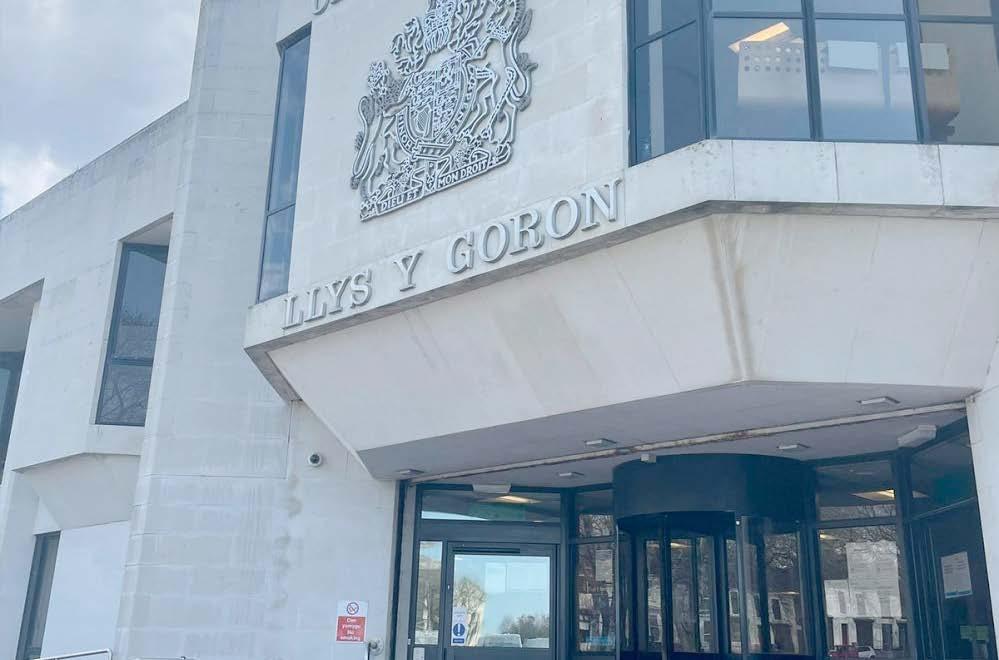
A MILFORD HAVEN man caught in an online paedophile sting has been jailed for 32 months after admitting a series of child sexual offences.
Martin Davies, 38, formerly of Blaenporth, but lately living in Milford Haven, appeared before Swansea Crown Court on Thursday (Nov 27), where he as sentenced for attempting sexual communication with a child and attempting to cause a child to watch a sexual act.
The investigation began as a covert online sting, in which Davies believed he was speaking to underage girls.
Online sting led to Davies’ arrest
The court heard that Davies was detained following an online paedophile sting, during which he engaged in sexual communication with what he believed were teenage girls. In reality, the accounts were controlled by adult decoys, and no real children were involved.
A video of the sting was later posted online by members of several predator-exposure groups, including Fleetwood Enforcers UK, Angels of Innocence, and Taking Action Against Predators. Their footage shows the moment Davies was confronted before police arrived.
Dyfed-Powys Police subsequently took over the investigation, leading to Davies’ arrest, charge and eventual conviction at Swansea Crown Court.
A RRE st AND CHAR g E s Davies was first charged in July. At the time, Dyfed-Powys Police confirmed he had been summoned to appear at Swansea Magistrates’ Court on 19 July, where he faced four counts of sexual communication with a child and one count of causing a child to watch a sexual act. He was remanded in custody pending Crown Court proceedings.
Sentencing Davies, HHJ
Catherine Richards said: “You did not know the true identities of the people you were communicating with. You believed they were teenage girls. You carried on despite the age you thought they were.”
The court heard that Davies’ messages demonstrated clear intent to engage in sexual activity with children.
sEN t ENCE
• Davies was sentenced to:
• 32 months’ imprisonment
• A Sexual Harm Prevention Order (SHPO)
• Notification requirements (Sex Offenders Register)
• Victim surcharge
He will serve half the custodial term in prison before release on licence.
A PEMBROKE MAN has been sentenced for stealing more than £80 worth of alcohol and groceries from the Co-Op supermarket.
Mark Abraham was seen entering the store’s Pembroke branch on June 1 and removing items from the shelves, including two bottles of gin, a chicken, a Cadbury’s Flake and a Piri pasta pot.
“He then left the store without
making any attempt to pay for them,”
Crown Prosecutor Nia James told Haverfordwest magistrates court this week.
Abraham, 51, of The Green, Pembroke, pleaded guilty to theft. He was ordered to pay £88.65 compensation to the Co-Op for the stolen goods and was fined £80. He must also pay £85 court costs and a £32 surcharge.

MILFORD HAVEN and Neyland Police are investigating a series of fraud offences in the Milford Haven and Haverfordwest areas following reports that counterfeit bank notes have been used in local shops and businesses.
Officers are urging the public and retailers to remain vigilant and to check any cash they receive, particularly during busy trading periods.
Guidance on how to identify genuine
UK currency is available online via the Bank of England’s official resources.
Anyone with information about counterfeit notes, or who believes they may have been given one, is asked to contact Dyfed-Powys Police. Reports can be made online, calling 101. Those who are deaf, hard of hearing or speech impaired can text 07811 311 908. Alternatively, information can be passed anonymously to Crimestoppers on 0800 555 111 or via their website.






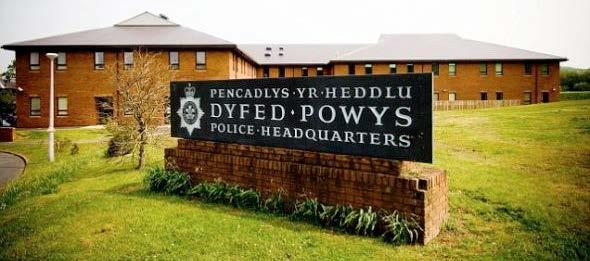
A FORMER Dyfed-Powys Police CCtV operator has been sentenced after admitting coercive and controlling behaviour and a data protection offence involving his expartner.
Russell Hasler, aged 42, from Llandysul, was arrested by officers from the force’s Professional Standards Department in October 2023. He resigned a month later. He was later charged with coercive and controlling behaviour, a data protection offence, and a computer misuse offence, although the latter was dropped from proceedings.
Hasler admitted the data protection breach but initially denied coercive and controlling behaviour. Two days before he was due to stand trial at Swansea Crown Court, he changed his plea to guilty.
VICtIM’s ACCOuNt
In a statement provided to the court, the victim described the severe
and lasting impact of the abuse.
“There were times when the emotional pain, torment and relentlessness of the abuse became so overwhelming that I questioned whether I could carry on,” she said.
“The abuse has affected every part of our lives. The damage caused cannot be undone, and the pain we have endured is something we continue to live with every day.”
She added that she still experiences memory lapses, brain fog, intrusive thoughts and difficulties concentrating, as well as physical discomfort she believes is linked to chronic anxiety brought on by the prolonged abuse.
On Monday (24 November), Hasler was handed a 17-month prison sentence, suspended for 18 months. He must complete 180 hours of unpaid work, attend 20 rehabilitation activity days, and pay a £500 fine. A five-year
restraining order was imposed.
‘A PROFOuND BEtRAyAL’
DC Simon Reynolds, from the Professional Standards Department, praised the victim’s courage and said the case represented a serious breach of trust.
“No one should feel frightened or controlled in their own lives, and I want to commend the victim for their courage in coming forward,” he said.
“Controlling and coercive behaviour has a devastating impact on its victims, and the fact that Russell Hasler was a police staff member at the time of offending, compounded by his breaching of Data Protection legislation, is a profound betrayal of the standards the public should rightly expect.
“This sentencing should help reassure the public that while such offending by police employees is uncommon, it is taken with the utmost seriousness by investigators.”
A MILFORD HAVEN man has been committed to swansea Crown Court for sentence after indicating guilty pleas to a series of violent offences in Monkton.
Alexander Campbell, aged 30, currently of no fixed abode, but previously of Milford Haven, appeared before Swansea Magistrates’ Court on Saturday (Nov 22).
Campbell faces three linked charges, all said to have taken place on Thursday (Nov 20).
The court heard that Campbell assaulted a person causing actual bodily harm, contrary to section 47 of the Offences Against the Person Act
1861. A second ABH charge was also listed for the same date.
A further charge states that Campbell unlawfully and maliciously inflicted grievous bodily harm without intent, contrary to section 20 of the Act.
Campbell indicated guilty pleas to all matters during Saturday’s hearing.
Magistrates committed him to Swansea Crown Court for sentence, stating that the seriousness of the offences placed them outside magistrates’ sentencing powers.
He was remanded in custody to HMP Cardiff until his next appearance, which will take place at Swansea Crown Court on a date to be confirmed.

AN INQuEst will open next week into the death of Emily thornton-sandy, a 30-year-old solicitor from Pontarddulais, who died after a serious collision on the A48 between Cross Hands and Pont Abraham.
The hearing will take place at Llanelli Town Hall Tuesday (Dec 3) and is scheduled to last around two hours.
Emily had been travelling home from a veterinary appointment on 5 November 2024 when the collision occurred on one of Carmarthenshire’s busiest stretches of road. Her dog, Scout, died shortly after the crash. Emily was taken to hospital with critical injuries and sadly died six days later.
Emily worked as a solicitor supporting people affected by asbestos exposure. Her family
Luke Sinclair luke@herald.email
described her as intelligent, kind and caring, with a deep compassion for others. They said she was devoted to her work, passionate about literature, and a lover of houseplants.
The inquest will examine the circumstances surrounding the collision on the A48, a route wellknown to drivers travelling between Carmarthenshire and Swansea.
Emily’s family will be represented by Helen Shakespeare, Partner at Thompsons Solicitors. She said:
“Emily’s death was a devastating loss to everyone who knew and loved her. Her family are hopeful that the inquest will help them understand more about the circumstances of the collision and what happened on that day.”

OFFICER s investigating the death of 21-year-old Corinna Baker have confirmed that a 29-yearold man arrested on suspicion of murder has been bailed as enquiries continue.
Corinna’s body was discovered at Netpool Boat Yard, Cardigan, on Saturday, November 15.
Dyfed-Powys Police said today that their investigation remains ongoing, with specialist officers supporting Corinna’s family.
Detective Chief Inspector Vicky Oliver said: “Our thoughts remain with Corinna’s family at this awful time, and our specialist officers continue to support them as we progress with our enquiries.
“I would again urge anyone who has any information — or was at Netpool Boat Yard from around 9:00pm on Thursday, November 13 — to get in touch.”
Police continue to appeal for information that may help their investigation.
Anyone with information can contact Dyfed-Powys Police: Email: 101@dyfed-powys.police. uk
Phone: 101
Information can also be passed anonymously to Crimestoppers on 0800 555 111 or at crimestoppersuk.org.
Quote reference 25*937027.
Editor’s note: Readers might question why a man arrested on suspicion of murder was not

Tom Sinclair editor@herald.email
remanded into custody. In UK law, a suspect can only be remanded after they have been formally charged with an offence. Police cannot keep someone in custody indefinitely while waiting for forensic or medical results.
Even in the most serious investigations, police can only hold a suspect for a limited period – normally 24 hours, extendable to a maximum of 96 hours with magistrates’ approval. When that time expires officers must either charge, bail, or release the individual. If the threshold for a murder charge has not yet been met, the law requires that the person be
bailed while enquiries continue. Bail does not mean the suspect is cleared. It simply means detectives need more time to gather evidence, including pathology, forensic analysis, digital data and witness accounts. Conditions can be imposed to prevent interference with the investigation and the case remains active.
How PCC reopened the case, kept key legal advice out of the public domain for two years, and finally released a heavily redacted report confirming the evidential threshold for fraud was met — but concluding PCC could not prosecute because of its own internal failings.
A DECADE of confusion, missing evidence, redactions and internal failures has been laid bare in the long-running scandal surrounding the Pembroke Dock Commercial Property grant scheme – a case Pembrokeshire County Council quietly revisited in 2023 before burying most of the crucial legal advice until their hand was forced.
The legal advice has been released by the authority, but is heavily redacted.
The Herald can reveal that council officers sought fresh legal advice in December 2023, nearly ten years after the original investigation, following efforts to determine once and for all whether the authority could pursue a prosecution over alleged irregularities in grant-funded renovation work in Pembroke Dock.
That advice, written by barrister Lee Reynolds of Apex Chambers, was only published in heavily redacted form (After Cllrs Mike Stoddart and Jacob Williams argued that it would not be in the public interest for the whole of the report to be considered in private). Despite confirming that the evidential threshold for fraud had been met, Reynolds advised in the strongest
2013–14 — Concerns first raised about grant payments in Pembroke Dock
2014 — PCC refuses councillors access to key documents; police investigation begins
2015–16 — CPS rules no prosecution possible due to evidential contamination
2017–22 — WEFO oversight continues; internal reviews carried out
Dec 2023 — PCC quietly commissions fresh barrister’s advice
2024 — Redactions prepared behind closed doors
Late 2025 — Heavily censored advice finally published
2025 — Case closed: no prosecutions, no accountability

Tom Sinclair editor@herald.email
possible terms that Pembrokeshire County Council must not prosecute – because its own officers’ conduct, document handling and procedural failures would undermine any case in court.
Advice confirms fraud – but PCC “cannot prosecute”
The visible sections of Reynolds’ opinion are stark. He describes the fraud under investigation as “clear”, “unsophisticated” and “supported by evidence”. He states plainly that the evidential test for prosecution is met.
But he concludes that PCC cannot be the prosecuting authority because of severe concerns about the authority’s own internal processes. He warns that allegations of “complicity (at worst) or gross incompetence (at best)” by individuals within the Council would fatally compromise any case brought by PCC.
The majority of the written advice – including the detailed factual background and key evidence against the suspects – remains entirely blacked out.
Police and CPS raised identical concerns years earlier
The Herald has reviewed a DyfedPowys Police letter summarising Crown Prosecution Service findings
from the original 2014–2016 referral. It highlights:
• Missing evidence, including a caseworker’s computer hard drive that vanished before reaching police.
• Concerns about document integrity after public allegations that papers in a council store room may have been interfered with.
• Unreliable or conflicting statements from officers who administered the scheme.
• Inadequate training and inconsistent handling of claims.
• Failure to follow proper processes when approving invoices or carrying out on-site checks.
The CPS concluded there was no realistic prospect of conviction – not because fraud had not occurred, but because PCC’s own internal failings had contaminated the evidence. Reynolds’ 2023 opinion echoes those concerns almost word for word.
A scandal without accountability
After a decade of investigations, repayments, police enquiries, CPS reviews, council motions and now a second round of legal advice, the Pembroke Dock grant scandal ends not with prosecutions, but with more redactions, missing evidence and unanswered questions.
• Despite a barrister confirming the evidential test for fraud was met –no one will ever face trial.
• Despite WEFO raising serious concerns – no officer has been held publicly accountable.
• Despite repeated calls from councillors for transparency –large parts of the file remain secret.
The Council has formally closed the matter. The final question remains: what else is still buried?
One name that will be familiar to long-time readers is that of Gwyn Evans, the Council’s then European Manager, who oversaw elements of the grant scheme. Concerns about Mr Evans’ role were raised publicly as far back as 2014, when Audit Committee papers and subsequent reporting highlighted that he had been interviewed during the police investigation and that questions had been raised about the accuracy of a report he produced relating to the 29 Dimond Street project. While the new barrister’s opinion does not reveal names, the pattern of redactions and the references to officers interviewed as witnesses or potential defendants strongly suggest that figures involved in those earlier controversies –including Mr Evans – feature within
the censored sections of the 2023 legal advice.
In January 2024, the issue briefly resurfaced when a meeting described on the agenda as a “review” was repeatedly referred to by senior officers as an “investigation” into the scheme. Reporting at the time highlighted that senior figures – including Finance Director Mark Lewis, Development Director Dr Steven Jones, European Manager Gwyn Evans, and Head of Internal Audit Jonathan Haswell – addressed councillors on the controversy.
The public gallery was packed. In a marked departure from the secrecy that characterised the 2014 era, Monitoring Officer Lawrence Harding announced that all councillors would be given confidential access to grant documentation. But the promise was short-lived: the material councillors

eventually received was heavily restricted, with key documents withheld and others made available only under supervision.
Behind the scenes, as we now know,
the Council had already commissioned the 2023 Reynolds advice – yet no mention of it was made during that meeting. Councillors were not told that a fresh legal opinion existed, nor that it
confirmed the evidential test for fraud had been met. Instead, the authority continued to present the matter as an internal housekeeping exercise, even as redactions were being prepared for eventual publication nearly two years later.
What PCC still hides
• Black bars in the Reynolds opinion almost certainly conceal:
• The detailed narrative of the alleged fraud
• WEFO audit evidence
• Internal emails and correspondence
• Officer decision-making and supervisory failures
• Lost or mishandled evidence
• Conflicting staff statements
• Senior officer involvement in grant approvals
• Potential conflicts of interest
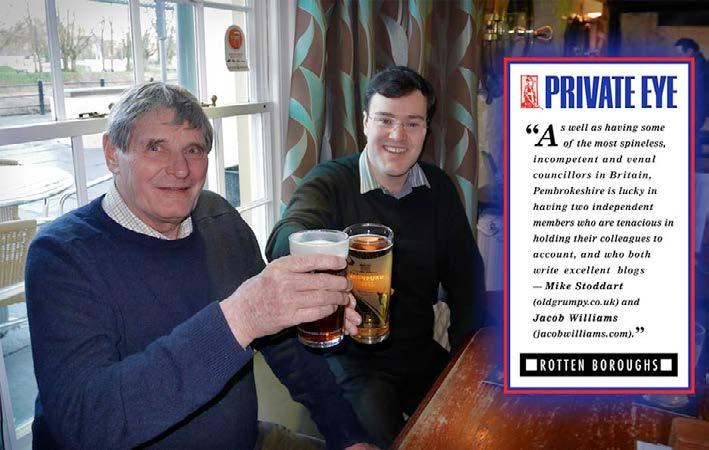
Cllr Mike stoddart told Cabinet that grants were being paid for building works “which had never materialised” and accused the authority of hiding the truth behind blacked-out documents. then council leader Jamie Adams responded by attacking Cllr stoddart’s former career in the building trade rather than addressing the allegations. When challenged Cllr Adams was unable to substantiate these allegations. the meeting descended into shouting.
Private Eye’s Rotten Boroughs column covered the row days later, mocking the council’s claim that a grant-funded roof had magically been made to look authentically “aged” with a mix of new and recycled slate, and highlighting phantom works the council later insisted had been paid for privately by developer Cathal McCosker. 2023–2025
A barrister confirms the evidential test for fraud is met.
The same advice is heavily redacted.
No one will ever be prosecuted.
Twelve years, two police referrals, multiple audits and a CPS review later – many will say that the culture of secrecy and deflection remains untouched.
Here is the final, press-ready companion piece – written in the same house style, legally cautious where it needs to be, but still devastating. It can run alongside your main article or as a separate “How We Exposed It” box/ feature.
How The Herald uncovered Pembroke Dock’s longest-running scandal
Long before The Pembrokeshire Herald existed, our predecessor title Pembrokeshire’s Best first put developer Cathal McCosker on the front page – dubbing him the “Baron of the Bedsits”.
What started as a series of curious planning applications and suspiciously generous grants turned into one of Welsh local government’s most enduring scandals. Over more than a decade, Herald journalists – together with dogged whistleblowers inside and outside County Hall – pieced together a picture that officials worked hard to keep hidden.
Among the discoveries that never quite made it into the official narrative:
• A senior council officer caught altering the public minutes of a key meeting.
• Evidence that then-Chief Executive Bryn Parry-Jones personally intervened to block disciplinary action against at least one member of staff linked to the grant scheme.
• A furious confrontation in which Mr Parry-Jones reportedly threatened to hire private investigators to find out who was talking to this newspaper. (County Hall’s walls, it turned out, were very thin indeed.)
• A former NatWest bank on Meyrick Street converted into ten bedsits – despite planning permission having been granted for just four flats. The extra six appeared only after a retrospective application was quietly nodded through.
• Within days of the council reporting the alleged fraud to the police the developer Cathal McCosker offered to pay back all the £180,000 in grants he had received on the four completed properties and to forgo the £120,000 due on the nearly complete project at No 1 Dimond Street even though the dossier handed to the police only concerned £60,000 in contested payments. Mr McCosker’s offer was on condition that this “would be the end of the matter”
• A Dimond Street butcher’s shop (No 25) that supposedly received grant-funded renovation work before the purchaser even owned the building.
• The developer was allowed to omit the work to fireproof the ceiling between the former butcher’s shop and the flat above
• Housing Benefit payments for tenants routed to an Irish bank account that never appeared in the relevant company filings.
• Tenants left without electricity or water despite tenancy agreements promising “all bills included”.
• The disappearance – never satisfactorily explained – of a laptop and hard drive containing crucial grant records.
• Repeated attempts by senior officers and members of the ruling Independent Political Group to delay, deflect or shut down scrutiny, even after the money trail had become impossible to ignore.
The collapse of confidence in the Commercial Property Grant Scheme fed directly into the wider crisis that eventually ended Bryn Parry-Jones’s controversial tenure at County Hall. When we sat down with Cllr Mike Stoddart – the one elected member who refused to let the matter die –and compared his files with ours, the conclusion was the same. It was, in the end, a very simple fraud with very few moving parts. And twelve years later, despite police investigations, CPS reviews, WEFO audits and now a barrister confirming the evidential test for fraud was met, nobody has ever been prosecuted – and most of the paperwork is still blacked out.
That is the real scandal.






























A DOg walker raised the alarm after hearing a woman screaming “Leave me alone” as she was chased through a Milford Haven street in the early hours of the morning.
The man, later identified as Shaun Saunders, 34, was seen pursuing the woman along Richard John Road at around 12:20am on November 3, Haverfordwest magistrates’ court was told this week.
Crown Prosecutor Nia James said the witness heard the woman “screaming at the top of her voice” before seeing her run down the road with Saunders “chasing closely behind”.
“He saw the defendant trying to grab her by the shoulders,” she said. “He eventually made contact and both fell to the ground, with Saunders landing on top of her.”
The witness phoned police, and officers arrested Saunders a short
time later. Body-worn camera footage showed the victim had a cut lip and swelling from the assault.
Saunders, of Richard John Road, Milford Haven, pleaded guilty to assault by beating. He was represented by solicitor Tom Lloyd, who described him as “an upstanding member of the community”.
“He knows what he did was wrong,” said Lloyd. “He is a successful young entrepreneur and carries out considerable charity work.”
District Judge Mark Layton imposed a 12-week custodial sentence, suspended for two years. Saunders must complete 15 rehabilitation activity days and a 60-day alcohol abstinence programme. He was ordered to pay an £154 surcharge and £85 costs.
“I am taking a step back from sending you to prison, as I believe there is a realistic prospect that you can change your behaviour,” Judge Layton told him.

A 22-yEAR-OLD man has been committed to swansea Crown Court for sentence after indicating guilty pleas to three separate charges of attempting to engage in sexual communication with girls under sixteen.
Devon Wildgust, of Lon y Gruglas, Ammanford, appeared before Llanelli Magistrates’ Court on Monday (Nov 24). All victims are protected under Section 1 of the Sexual Offences Amendment Act 1992.
tHREE OFFENCEs IN sIx DAys
The charges relate to conduct between 15 November and 21 November 2025, involving three
different girls, each under the age of sixteen.
Across all three offences, the court heard that Wildgust, being over 18 and acting for the purpose of sexual gratification, sent numerous explicit and indecent images of himself, including images of his genitals. He also requested sexual acts from the children and made several sexually explicit comments and remarks.
Wildgust indicated guilty pleas to all three charges. He was represented by Andrew Isaac Gomers, while Dennis Davies appeared for CPS Wales (South
West).
The bench consisted of Miss K Davies, Mr D Pugh and Ms M Radford. A Pre-Sentence Report was ordered.
Magistrates committed all matters to Swansea Crown Court for sentence under Section 14 of the Sentencing Act 2020.
Wildgust was remanded on conditional bail with the following conditions:
• No contact with any child under 18, except in the course of daily activities.
• Daily reporting to Ammanford Police Station between 10:00am and 2:00pm.
• To live and sleep each night at his address on Lon y Gruglas, Ammanford.
• He was also notified of his requirement to register with the police until the case is concluded.
Wildgust will appear at Swansea Crown Court on 15 December at 9:00am for a committal for sentence hearing, which is expected to last around 30 minutes.

well cared for and impeccably controlled, a member of the public submitted a complaint to the council on October 23 alleging that the dog, believed to be an XL Bully, had been seen unmuzzled while
out on a walk.
As a result, the dog – Ralph – was seized by officers.
This week Pembrokeshire County Council applied for a contingent destruction order at Haverfordwest Magistrates’ Court in relation to Ralph’s owner, Jessica Coleman.
“Ralph was seized on November 4 with the full co-operation of his owner, who was unaware that he was an XL Bully type,” the council’s legal representative told the court.
“But there was no suggestion that the owner is not a fit and proper person
who is incapable of looking after the dog.”
Magistrates granted Ms Coleman, of Dewing Avenue, Manorbier, a contingent destruction order, meaning Ralph can return home subject to strict conditions. Ms Coleman must obtain an exemption certificate from the Department for Environment, Food and Rural Affairs (DEFRA) within two months. Ralph must be muzzled whenever he is in public and walked only on a lead no longer than six feet. He must not be exercised by anyone under the age of 16.
A landmark Autumn Budget brings major anti-poverty reforms and record investment— while critics warn of a £26bn tax burden and ‘chaos at both ends of the M4’

tHE AutuMN BuDgEt has landed with a mixture of praise, alarm and fierce political argument after the Chancellor, Rachel Reeves, announced sweeping changes affecting every part of Welsh life — from family budgets and pensions to jobs, taxation, and the future of key industries.
The day was overshadowed by the extraordinary leak of the entire Office for Budget Responsibility (OBR) forecast, which appeared online hours before the Chancellor stood up in the Commons. Senior ministers later confirmed that the “riot act” had been read to those suspected of briefing the press, as the scale of internal tension inside the UK Government became clear.
Tom
Sinclair editor@herald.email
But once delivered, the Budget set out one of the largest policy shifts in years: the scrapping of the two-child benefit cap, major increases to the minimum wage, billions for Welsh industries, and a freeze in fuel duty — all set against the backdrop of the UK tax burden reaching its highest level since the Second World War.
This is The Herald’s full Welsh-focused analysis of what the Budget means — and why reactions have been so sharply divided.
Child Poverty: Two-Child Benefit Cap
Scrapped for 69,000 Welsh Children

One of the Chancellor’s most consequential decisions was the abolition of the controversial two-child benefit limit, a policy long criticised by anti-poverty groups and Welsh ministers.
According to Treasury modelling, around 69,000 children in Wales will now benefit, including more than 19,000 families whose third or subsequent children were previously ineligible for additional support.
Welsh First Minister Eluned Morgan described the reform as “a major step in tackling the scourge of child poverty”.
Universal Credit will also be uprated by 6%, bringing further relief to low-income households across Wales.
Minimum Wage Increases: 150,000
Welsh Workers to Benefit
The Chancellor confirmed that both the National Living Wage and National Minimum Wage would rise from April. Around 150,000 workers in Wales will receive a pay increase.
The Welsh Government hailed the rise as a boost to struggling families, but the National Franchised Dealers Association (NFDA) warned that such increases compound pressures on employers already facing falling margins
NFDA Chief Executive Sue Robinson said that while freezing fuel duty was welcome, the Budget offered “limited support” for the automotive and EV sector.
“Registrations have fluctuated in a challenging climate,” she said, warning that missing EV incentives and the new 3p-per-mile EV road tax could “slow the industry’s progress”.
£1bn Additional Spending Power for the Welsh Government
After years of dispute over funding, the Budget awarded Wales:
• £505m in Barnett consequentials, and
• £425m in new fiscal flexibilities,
• bringing close to £1bn in additional spending power.
Eluned Morgan welcomed what she called “significant support for hardpressed public services”, citing similar flexibilities last year that funded thousands of additional NHS treatments.
She also pointed to major UK-wide investment landing directly in Wales:
• AI Growth Zones in Cardiff, Newport and Bangor
• £10m for South Wales’s semiconductor industry

• £25m for Anglesey Freeport
• £4.2m for Port Talbot steel transition land remediation
• 3,000 new jobs tied to new nuclear at Wylfa
BRItIsH COAL PENsION VICtORy: 4,000 Ex-MINERs IN WALEs tO BENEFIt
The Chancellor also confirmed that the Investment Reserve Fund of the British Coal Staff Superannuation Scheme (BCSSS) will be transferred to scheme members.
Welsh Liberal Democrat spokesperson David Chadwick, who led repeated calls to resolve the issue, said:
“This is welcome news for the roughly 4,000 former miners in Wales who were denied full access to their pension pots.
It is only right they finally receive the support they have been owed for far too long.”
FuEL Duty FREEzE: FAIRFuELuK CLAIMs ‘MAJOR WIN’
Campaign group FairFuelUK welcomed the Chancellor’s decision to freeze fuel duty.
Founder Howard Cox said lobbying efforts “paid off”, crediting MP Lewis Cocking for championing the cause in Parliament.
But Mr Cox warned that the new 3p-per-mile EV tax could be “the thin end of the wedge” towards a wider roadpricing system.
“It’s time Government listens to and consults drivers on a long-term road user tax plan that is fair to the UK’s 37 million drivers,” he said.
uNIONs: ‘tHE
GMB union general secretary Gary Smith said the Budget marked a decisive end to the austerity era.
“Today’s Budget looks like the final nail in the coffin for the Conservatives’ failed austerity project.
The challenge now for Labour is to rebuild the economy and bring hope to people.”
Reform UK Wales issued a blistering response, accusing Labour governments in Cardiff and London of damaging Welsh business.
A spokesperson said: “This Budget will take taxes to post-war highs, putting enormous pressure on employers and employees up and down Wales.”
The party claimed next May’s Senedd elections will be “a two-horse race between Plaid Cymru and Reform”, presenting themselves as the alternative to “huge tax rises”.
The Welsh Conservatives condemned the Budget as “chaotic”, saying the leak of the OBR forecast showed dysfunction at the heart of government.
In a highly critical statement, the party said the Budget contained £26bn of tax rises, including:
• Frozen income tax thresholds until 2030–31
• A 2% rise in taxes on dividends, savings and property income
• Gambling taxes worth £1.1bn
• New charges on salary-sacrifice pensions
• A council tax surcharge on homes over £2m
• A new “sugar tax” on lattes and milkshakes
• An EV mileage tax from 2028
Shadow Finance Secretary Sam Rowlands MS said: “Labour’s claim they wouldn’t raise taxes on working people has been exposed. Under Labour, we just keep paying more.”
He accused Welsh ministers of failing to secure a better settlement for Wales.
The morning began with unprecedented controversy after the OBR accidentally published its forecast online.


tHE LEAK CONFIRMED:
• Weak GDP growth, averaging 1.5%
• Public debt rising to 96% of GDP
• Borrowing only falling because of tax threshold freezes
• The tax burden reaching 38.3% of GDP, the highest since records began
Chief Secretary to the Prime Minister Darren Jones later said officials had been “read the riot act” and called the leaks “utterly unacceptable”.
WHERE DOEs tHIs LEAVE WALEs? WINNERs
• Low-income families with more than two children
• Pensioners
• Minimum wage workers
• The semiconductor, nuclear and advanced manufacturing sectors
• Former coal staff pensioners
• Councils and the Welsh Government, now with new fiscal flexibility
LOsERs
• Middle-income earners pulled into higher tax brackets
• Motorists preparing for a future roadcharging system
• Employers facing rising wage costs
• EV buyers—now subject to per-mile charges
• Savers, landlords and dividend earners facing tax increases
Conclusion: A Budget That Redraws the Map — But Not Without Cost
This Budget is one of the most farreaching in years. For Wales, it delivers:
• huge anti-poverty reforms
• major industrial investment
• nearly £1bn in devolved funding
• relief for minimum-wage households and pensioners
But it also locks in record-high taxation, leaves businesses warning of missed opportunities, and opens new political fault lines ahead of next year’s Welsh election.
The UK now faces a decade shaped by high taxes, slow growth, and deep political disagreement about the best route forward.
Wales, as ever, stands at the centre of that national argument.


A 36-yEAR-OLD inmate has died at HMP swansea, prompting a formal investigation into the circumstances surrounding his death.
The Ministry of Justice confirmed that Lee Nation died on Saturday morning (Nov 22). The cause of death has not yet been established.
A Prison Service spokesperson said: “HMP Swansea prisoner Lee Nation died on November 22. As with all deaths in custody, the Prisons and Probation Ombudsman will now carry out an independent investigation.”
The Herald understands that a post-mortem examination will be arranged, and that Nation’s family have been informed.
A prisoner at HMP Swansea contacted The Herald to say the body was discovered during the morning and removed from the wing around lunchtime. This has not yet been officially confirmed.
The Prisons and Probation Ombudsman will now examine the events leading up to Nation’s death, the response of staff, and any issues regarding health care or supervision.

Tom Sinclair editor@herald.email
The death of Lee Nation is the latest in a series of fatalities at HMP Swansea this year. The Herald has confirmed at least three other deaths in 2025, including cases in June, July and October, all of which are under investigation by the Prisons and Probation Ombudsman.
The prison has faced growing scrutiny over health care, supervision and emergency response procedures, with each case expected to result in formal recommendations once inquiries are completed.
Further updates will be published when more information becomes available.

F u R t HER changes to the way 999 calls are managed in Wales will come into force on tuesday 2 December, as the Welsh Ambulance s ervice introduces a new set of response categories aimed at improving patient outcomes and reducing unnecessary hospital admissions.
The changes will allow call handlers to identify and prioritise people with serious, time-sensitive conditions—such as suspected strokes or heart attacks—more quickly. The updated system replaces the long-standing Amber and Green categories with three new levels: Orange Now, Yellow Soon and Green Planned.
These sit alongside the Purple Arrest and Red Emergency categories introduced in July, which are used for the most life-threatening incidents.
From Tuesday, all 999 calls in Wales will fall into one of the following five categories:
• Purple Arrest – For people in cardiac or respiratory arrest who need an ambulance immediately.
• Red Emergency – For people at high risk of cardiac or respiratory arrest, such as someone who is choking.
• Orange Now – For serious conditions requiring urgent face-to-face assessment, tests and likely transfer to hospital or specialist care, including symptoms suggestive of stroke or heart attack.
• Yellow Soon – For cases needing initial assessment (phone or in-person) before a clinician decides next steps. This includes abdominal pain or nonserious injuries, where patients may remain at home following treatment or be transported to a clinic or hospital.

Tom Sinclair editor@herald.email
• Green Planned – For less urgent cases, such as mild infections, where safe treatment at home or community-based care is appropriate.
The new model shifts the focus to patient need rather than responsetime targets alone. Enhanced clinical triage will be used to identify the right level of care more accurately, ensuring people who require urgent transport to hospital are prioritised, while others receive timely support closer to home.
Officials say the approach is intended to improve ambulance
availability, cut unnecessary admissions and deliver “more timely and effective care” throughout Wales.
Cabinet Secretary for Health and Social Care, Jeremy Miles, said:
“This new ambulance response model is about making sure everyone gets the right care for their complaint or condition.
“By improving clinical decisionmaking and introducing new response categories, we will deliver better outcomes and experiences for people across Wales.
“The new approach will be evaluated to ensure it is delivering the improvements in patient care which we expect. We are seeing positive outcomes from the changes introduced in July and we want to
see this system save more lives.”
Executive Director of Paramedicine at the Welsh Ambulance Service, Andy Swinburn, said the previous Red–Amber–Green system had become too broad.
“The current Amber category in particular—representing around 70% of all calls—doesn’t allow for a targeted response to serious conditions like a stroke or fractured hip. It means some patients wait far longer than any of us would like.
“The way people present to 999 has changed, and our response must reflect that. These changes will increase ambulance availability for those who need it most, while supporting others to receive appropriate care closer to home.”
A PEMBROKE DOCK man has been handed a two-year Criminal Behaviour Order after a series of allegations that he breached a community protection notice by creating unreasonable noise at his home.
Paul Richard McNally, aged sixtytwo, of Laws Street, appeared before Haverfordwest Magistrates’ Court on Wednesday (Nov 19) for seven linked charges of failing to comply with a community protection notice. The notice required him to prevent loud or
offensive noise, including shouting and aggressive language, from causing a nuisance to neighbours.
McNally had previously pleaded not guilty to six of the alleged breaches, said to have taken place between February and June this year in Pembroke Dock.
At Wednesday’s hearing, magistrates dismissed all six charges after no evidence was offered by Pembrokeshire County Council, which had brought the prosecution.
An application by the council to introduce bad-character evidence was
also withdrawn.
However, McNally changed his plea to guilty on a separate charge relating to an incident on April 5.
Magistrates imposed a Criminal Behaviour Order lasting until November 2027. The order prohibits McNally from shouting aggressively at neighbours, using foul or offensive language towards them, or creating unreasonable noise from his property, including banging or slamming doors in a way likely to cause harassment, alarm or distress.
He must also stay in regular contact
with supervising officers Rachel Stevenson-Thomas and Steve Morbey, and notify them of any change of address.
McNally was fined £162. He must also pay a £65 victim services surcharge and £1,000 in prosecution costs. A collection order was made, with the court indicating that deductions from benefits may be applied. The total of £1,227 must be paid by December 19.
The court noted that his guilty plea was taken into account when sentencing.

ANgLE lifeboat was launched on tuesday night (Nov 25) after reports that a crew member had fallen overboard from a vessel near the Cunjic buoy.
The volunteer crew were paged at 10:17pm, with multiple assets responding to the emergency, including two Port Authority pilot boats, a Svitzer tug and a local range boat.
As the lifeboat was launching, responders confirmed that the casualty had already been recovered from the water by one of the pilot
Tom Sinclair editor@herald.email
boats and was being taken to the Port Authority jetty. Angle’s crew were asked to proceed to the jetty to provide additional casualty care until an ambulance arrived.
Paramedics later assessed the casualty, who—although understandably shaken—was found to be in good health. They were discharged at the scene and able to return to their vessel.


A PEMBROKEsHIRE drug-driver has narrowly avoided jail after being caught behind the wheel with cocaine and the cocaine derivative benzoylecgonine in his system.
Haverfordwest magistrates heard that Stefan Sheehan, 33, was observed around midnight on September 23 driving a Vauxhall van through Pembroke Dock town centre. The van carried the logo SS Waste Removal and, according to officers, appeared to be dangerously overloaded.
“It appeared to be overloaded, as the chassis was very close to the road,” Crown Prosecutor Nia James told the court. “It also had defective lights.”
Officers followed the van through Pembroke Dock, intermittently activating blue lights in an effort to stop the vehicle. Sheehan continued along Dimond Street, Water Street and on to King William Street before turning left into a dead-end road.
“He eventually came to a stop,” Ms James said. “The police gave chase to
the defendant who ran into a house, and it was there that he was arrested.” Blood tests later showed cocaine and benzoylecgonine in his system. The court was told that the offences were committed while Sheehan, of London Road, Pembroke Dock, was still serving an 18-month suspended custodial sentence imposed in January this year.
Sheehan pleaded guilty to driving otherwise than in accordance with a licence, driving without insurance, driving without due care and attention, failing to stop for police, and driving with cocaine and benzoylecgonine in his system.
He was sentenced to 18 months in custody, suspended for two years, and disqualified from driving for 18 months. He must also pay an £154 court surcharge and £85 costs.
District Judge Mark Layton agreed to suspend the sentence after being told Sheehan had been responding well to supervision under his existing probation order.
POLICE have confirmed that a man has been summoned to appear in court in connection with the deaths of two young Pembrokeshire residents who were killed in a head-on crash last summer.
Katie Worrell, aged 25, from Pembroke, and 27-year-old Tenby man Adam Muskett died at the scene following a collision on the A477 between Llanddowror and Red Roses on 13 June 2024.
The incident involved a black Jaguar travelling west towards Pembrokeshire and a black Ford Fiesta heading in the opposite direction. Dyfed-Powys Police has now confirmed that 28-year-old Alexander MacCallum will face two counts of causing death by careless driving.
Both families issued emotional
tributes at the time, describing Katie and Adam as devoted to one another and cherished by all who knew them.
Katie’s family said their daughter was “kind, caring and beautiful”, adding:
“She lived life to the full, loved to travel, and had achieved so much. She adored her friends and Adam beyond words and our lives will never be the same without her.”
Adam’s relatives described him as a “loving son, brother, grandson and nephew” who had a “big kind heart and cheeky smile”.
“He loved life, his friends, Tenby, football and Katie very much,” their statement said. “We are heartbroken and forever proud.”
MacCallum is due to appear before Llanelli Magistrates’ Court on 18 December 2025.



AN uNusuAL footprint left by a Nike trainer has resulted in a suspended prison sentence for a Haverfordwest teenager who broke into a local farm and stole a £3,000 Honda quad bike. Haverfordwest magistrates’ court
heard this week that on March 27, 2024, Jake Smith, 19, broke into a barn at Lodge Farm, Milford Haven, under cover of darkness. After cutting the lock, he used bolt-cutters to remove the chained quad bike before making off.
Crown Prosecutor Nia James told District Judge Mark Layton that the farmers were woken during the night by “a loud bang, similar to a car door being slammed”.
When they left their house at around 8:00am the following morning, they found the side door to the barn open. The lock had been cut, the chain securing the quad bike had been severed, and the vehicle was missing.During a police search of the surrounding land, officers discovered a plastic tray from the front of the quad bike, as well as distinctive footprints. These were later linked to a pair of Nike trainers with an uncommon sole pattern.
Police also recovered Smith’s DNA from a metal pole he had dropped during his getaway.
Further stolen property recovered Smith was arrested at his home
on Portfield Avenue, Haverfordwest. Inside the property, officers also found a motocross helmet stolen from a shed in the courtyard of Harbour Way, Milford Haven.
He later pleaded guilty to burglary and to a second count of handling stolen goods.
His solicitor, Jess Hill, said Smith was “extremely remorseful” and keen to work with the probation service to address his behaviour.
Smith was sentenced to 18 weeks in custody, suspended for 18 months. He must complete 20 rehabilitation activity requirement days and 200 hours of unpaid work.
He was also ordered to pay £100 compensation for damage caused to the quad bike, £85 prosecution costs, and a £154 court surcharge.
A sAuNDERsFOOt man who wrote off two vehicles while driving with three illegal drugs in his system will be sentenced at swansea Crown Court next month.
Benedict Bramble, aged 24, of Maryland, Saundersfoot, was driving an Audi A3 on the A40 near Haverfordwest on May 15 when he was involved in a collision which wrote off two vehicles.
“Two vehicles were written off as a result,” Crown Prosecutor Nia James told the court when Bramble appeared before District Judge Mark Layton at Haverfordwest Magistrates’ Court this week (Nov 25).
Blood analysis taken at the police station confirmed 240mcg of cocaine, 2.8mcg of Delta-9 tetrahydrocannabinol, and 1155mcg of Diazepam in his system at the time of the crash.
Bramble pleaded guilty to dangerous driving and to three counts of drug-
driving.
CAsE sENt tO CROWN COuRt
“The Crown puts this at the starting point of 18 months in custody,” Ms James added.
Due to the seriousness of the offences, District Judge Layton declined jurisdiction and committed the case to Swansea Crown Court for sentence on December 16.
Bramble received an interim driving disqualification and was released on unconditional bail.
ACCOMPANIED By FAtHER
During Tuesday’s hearing, Bramble was accompanied to court by his father, Will Bramble CBE, the Chief Executive of Pembrokeshire County Council.

WAtERstON man Chaise Price turned to cannabis after discovering his wife had been unfaithful, a court has been told.
Price, 25, was stopped by police shortly after 11:00pm on August 29 as he drove a Ford Transit van through Charles Street, Milford Haven. Officers reported a strong smell of cannabis coming from the vehicle, and he
provided a positive roadside drugs swipe.
Crown Prosecutor Nia James told District Judge Mark Layton, sitting at Haverfordwest Magistrates’ Court this week, that subsequent blood analysis showed 11mcg of Delta-9tetrahydrocannabinol (THC) in his system. The legal limit is 2mcg.
Price, of Biggins Hill, Waterston Road, Waterston, pleaded guilty to drug-driving. He was represented in court by solicitor Alaw Harries.
“He’d found out that day that his wife had been cheating on him,” Ms Harries told the court. “This is what led to the offence being committed.”
Price was disqualified from driving for 15 months, fined £120, and ordered to pay £85 prosecution costs and a £48 surcharge.

A MILFORD HAVEN resident has been remanded in custody after admitting involvement in the mass production of magic mushrooms.
Lee Locke, 37, of Coombs Road, Milford Haven, appeared before Haverfordwest magistrates’ court via video link from Swansea Prison, where he is currently being held on remand.
Locke pleaded guilty to being concerned in the production of the Class A drug psilocybin — commonly known as magic mushrooms — as well as possessing 35.88 grams of cannabis, a Class B substance.
His co-defendant, Zoe Graham, 33, who also lives at the Coombs Road address, denied identical charges of being concerned in the mass production of magic mushrooms and possessing 35.88 grams of cannabis. Graham’s case was sent to Swansea Crown Court for trial on December 23. She was released on unconditional bail.
Due to the seriousness of the offences, magistrates declined jurisdiction and committed the case to Swansea Crown Court for sentence on December 9. Locke was remanded in custody, with the bench ruling that there was a substantial risk of further offending.



A LEADINg Milford Haven publican has warned that next year’s minimum wage increase could push many Pembrokeshire pubs and restaurants “off a cliff”, saying the hospitality sector can no longer absorb rising costs.
Dan Mills, owner of Martha’s Vineyard on the Milford waterfront, said the decision to raise the National Living Wage to £12.71 an hour from April will hit small independent businesses hardest at a time when margins are already under intense pressure.
The rise is part of the UK Government’s plan to boost the earnings of lower-paid workers. But Mr Mills said the cumulative effect of wage rises, tax changes and energy prices was becoming unsustainable.
‘WE CAN’t Just ABsORB tHE COst’
Reacting to the announcement, Mr Mills said the assumption that hospitality businesses can simply absorb rising costs “couldn’t be further from the truth”.
“We’re already running on margins that get smaller by the month, and this government seems determined to squeeze every last drop out of us,” he said.
“Energy costs are going up, ingredients are going up, rents are going up, business rates are going up and VAT is absolutely crippling the industry. Meanwhile our customers, real people, families, are already struggling under the weight of this government in their everyday lives. We can only pass on so much before they simply stop coming out.”
Mr Mills stressed that the impact would not fall solely on pubs and restaurants but also on their wider supply chain – including Pembrokeshire’s farmers, fishermen and local producers.
“Hospitality isn’t some faceless industry,” he said. “It’s my team, it’s our local suppliers, it’s the farmers who raise the beef and grow the potatoes, the fishermen who land the lobsters, the families who choose to spend their hardearned money with us. It’s our town, county and community.”
He said pubs and restaurants could adapt and innovate, “as we always do here”, but warned that rising fixed costs were pushing the sector towards breaking point.
“This is bordering on economic suicide for small businesses like mine, and thousands of others who are the backbone of our communities,” he said.
“If people – politicians, decision
Tom Sinclair editor@herald.email
makers, landlords, councillors – don’t start understanding just how fragile this sector is becoming, the places they love simply won’t be here in a year or two.”
He added that for him the issue was not political but personal: “It’s livelihoods and it’s our community. And right now, it feels like we’re being driven off a cliff.”
Hospitality is one of the biggest employers in Pembrokeshire, with tourism-related businesses making up a major part of the local economy. Industry groups have warned previously that continued above-inflation wage rises, coupled with VAT pressures and energy costs, risk causing closures over the next two years.
Responding to the Chancellor’s announcement, The Society of Independent Brewers and Associates Chief Executive Andy Slee said cost of living pressures were real, but the burden of implementing wage rises fell hardest on small employers.
“Cost of living pressures are very real for people and we all want to see living standards rise. However, the responsibility of delivering wage increases is most felt by small businesses, including small independent breweries who are already facing significant pressures,” he said.
“We have lost more than 100 breweries in the past year and more tell us they are on the edge. If they close, there won’t be any jobs at all.”
Mr Slee added that the removal of age-based pay bands failed to reflect the additional training and development required for younger workers entering the sector.
“Brewing is a skilled job and we want to encourage more young people to enter the sector, but continuing to close the aged-based pay gap does not take account of the additional training and development that young people need,” he said.
He urged the Chancellor to use tomorrow’s Budget to support the industry by expanding Draught Relief.
“Tomorrow’s Budget is the opportunity for the Chancellor to offset these challenges for breweries by expanding the Draught Relief to 20% or more. This would mean that beer mostly sold in pubs has a lower rate of beer duty, bringing benefits to beer drinkers and small breweries around the country.”
The Treasury said the new rates aim to balance “the needs of workers, the affordability for businesses and the opportunities for employment”.
The minimum wage rise will come into effect in April 2026.

A PEMBROKEsHIRE farmer who became “emotionally overwhelmed” during a longrunning dispute assaulted another man in front of young children inside a Fishguard supermarket. The incident took place on May 24 at CK’s in Fishguard and was witnessed by members of the public as well as the victim’s two young children.
Sarah Jane Absalom sarah.jane.absalom@herald.email
This week at Haverfordwest Magistrates’ Court, District Judge Mark Layton was told that Richard Harries, 62, entered the store and came across complainant Michael James Lewis.
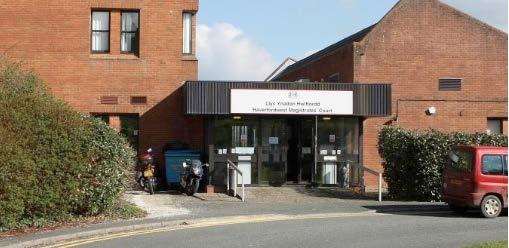
A HAKIN man has appeared before magistrates for a part-heard trial over allegations that he caused serious injury through careless or inconsiderate driving on a rural stretch of the A487.
Jaydon Elliott, aged twenty-one, of Glebelands, Hakin, Milford Haven, appeared at Haverfordwest Magistrates’ Court on Monday (Nov 24) for a trial hearing before a bench of three magistrates: Mr T Jenkins, Mrs H Disney and Mr R Bowen.
tHE ALLEgAtION
Prosecutors allege that on 17 December 2023, on the A487 between Talybont and Glandyfi, Elliott caused serious injury to a woman, Ciara Laverty, by driving a blue Mitsubishi Colt, registration VK07 PFX, carelessly or inconsiderately.
“There’s a lot of background in this case,” said Crown Prosecutor Nia James. “The victim, his partner and their two young children went to CK’s in Fishguard to buy sweets before going to watch a film.
“When he saw Richard Harries, he wanted to get further away from him. But the defendant then began walking towards him, shouting, ‘It’s disgraceful and disgusting that you support a paedo.’”
Harries then struck Mr Lewis to the left and right sides of his face.
“I’m not sure if it was a punch or a slap, as it all happened so quickly,” Mr Lewis said in a victim impact statement read to the court. “By now my children were both crying and were extremely traumatised. One of them said they never want to go back to CK’s again.
“[Richard Harries] is still bitter and he allowed matters to escalate in a public place, without seeming to care about the consequences.”
The details of the underlying dispute were not aired in open court, though they were referenced in a probation report handed to Judge Layton ahead of sentencing.
Harries, of Cwm, Puncheston, pleaded guilty to assault by beating. He was represented by solicitor Alaw Harries.
“The defendant is deeply remorseful for his actions and the impact they’ve had on the victim,” she said. “But he doesn’t use the background as an excuse. He was emotionally overwhelmed at the time and lost it.”
Harries was sentenced to 18 weeks in custody, suspended for 18 months. He must complete 30 rehabilitation activity requirement days, carry out 250 hours of unpaid work, and pay £500 compensation to Mr Lewis, along with a £154 surcharge and £85 costs.
Judge Layton also imposed an indefinite restraining order prohibiting Harries from contacting Mr Lewis directly or indirectly, entering his address, or posting anything about him online.
“People should feel safe in public, without the risk of harm coming to them,” the judge said. “Clearly your actions that day were unacceptable.”
The offence is charged under Section 2C of the Road Traffic Act 1988 and Schedule 2 of the Road Traffic Offenders Act 1988.
Representation and progress of the case
Elliott was represented in court by defence solicitor Megan Williams, with the prosecution conducted by Nia James.
The case was marked as part heard, meaning the evidence could not be completed during the session. Magistrates therefore adjourned the trial.
NExt HEARINg
Elliott was remanded on unconditional bail and must return to Haverfordwest Magistrates’ Court on 12 January 2026 at 10:00am, where the trial will continue in Courtroom 1.

TŶ HAFAN has smashed its fundraising target after raising more than £430,000 in just sixty hours to support children with life-shortening conditions and their families across Wales.
The Every Precious Life appeal closed at 10:00pm on Tuesday night (Nov 25) having reached its target two hours earlier. By the time the match-funding window ended, donations had surged to a total of £430,860.
The appeal focused on families who have experienced baby loss and who rely on the specialist support provided by the children’s hospice. Among those sharing their stories were Gwenno George and her husband Luke Nicholas, whose son Emrys died shortly after birth.
Gwenno, from Cardiff, said: “We are blown away by everyone’s support, kindness and generosity during the appeal. Every pound donated has meant so much to us, and I know that it will have such a huge positive impact on the wonderful work of Tŷ Hafan.
“It has been a privilege to share Emrys’ story as part of the appeal, and I am so, so proud of our son. I would do anything to hold Emrys again and tell him of the huge impact that he has had, but I know that he’s smiling somewhere.”

Tom
Sinclair editor@herald.email
rely on the charity for respite, palliative care, bereavement support and specialist help at home.
The average age of a child referred to Tŷ Hafan is two years old, and the hospice cares for around 300 children and 3,000 family members each year. Despite this, the charity is currently only able to reach one in ten families who need its support.
Dan Bamsey, Head of Fundraising, thanked supporters across Wales for helping the charity exceed its target.
“Once again, our amazing supporters have blown us away with their kindness and generosity,” he said. “Thanks to them, we have raised a staggering £430,860 which means we’ll be able to help more children with lifeshortening conditions and their families, like Gwenno’s and Kath’s.
Another parent, community mental health worker Kath Keeble from Merthyr Tydfil, shared the story of her son Tommy. She described the campaign as an honour.
be helped when they face the trauma and heartbreak of losing their baby. It makes my heart so proud to know that because of this campaign more families can be supported in the unwavering way I have.”
“It’s been an honour and a privilege to be able to share Tommy with the world as part of the Every Precious Life appeal,” she said. “Reaching the goal means that so many more people can

WEst WALEs suPPORt
Tŷ Hafan is one of only two children’s hospices in Wales and supports families from across South, Mid and West Wales – including Pembrokeshire families who
“We’ve had so many people support us to reach our target from our amazing appeal champions, through to community groups, companies, trusts and individuals from across South, Mid and West Wales. We thank each and every one of them from the bottom of our hearts.”
Although the match-funding portion of the appeal has now closed, donations to Tŷ Hafan can be made at any time to support its work.

A tEENAgE learner driver has been banned from the roads after being caught behind the wheel of a friend’s car while over the drug-drive limit.
Ieuan Midgley, 18, was seen by police officers driving a black Mercedes in The Salterns, Tenby, at around 1:00am on August 4. Checks revealed that he only held a provisional licence.
Subsequent blood tests taken at the police station confirmed a reading of 3.5mcg of Delta-9 tetrahydrocannabinol, against the legal limit of 2mcg.
COuRt ADMIssION
This week Midgley, of Carr Terrace,
Pennar, Pembroke Dock, pleaded guilty to driving over the specified drug-drive limit and driving otherwise than in accordance with a licence.
His solicitor, Tom Lloyd, told the court: “He’s learning to drive, he was 17 at the time, they were in a car park, and he childishly did these silly actions and drove his friend’s car, which he now deeply regrets.”
Midgley was disqualified from driving for 14 months. He was fined £170 and ordered to pay £85 in court costs and a £70 surcharge.

A gROWINg number of Pembrokeshire and northCeredigion residents have contacted the Herald with concerns about the conduct of sARs Cymru director, community Facebook group administrator and former prospective Reform uK candidate, Ajay Owen.
The Herald understands that tensions have escalated over several months, involving disputes in local Facebook groups, allegations of harassment from both sides, questions about Mr Owen’s public statements on social care and asylum issues, and confusion over the perceived role of his volunteer organisation, SARS Cymru.
Mr Owen has strongly rejected many of the concerns raised. He has supplied The Herald with a detailed written response, which is published in full at the end of this article.
He also chose to publish the same response in full on his Facebook page prior to this article’s publication.
Background: political fallout and community rows
Mr Owen first came to wider public attention locally during the Schools of Sanctuary debate earlier this year, when he criticised participating schools and parents who supported the programme. His posts prompted significant backlash, including from teachers, parents and community members.
Around the same time, it was suggested online that he intended to stand as a prospective Reform UK candidate in Pembrokeshire. Reform sources later told The Herald that comments he made about the scheme “brought the party into disrepute”.
This dispute contributed to the first major split within the community Facebook groups he ran. Several residents say they were removed after questioning his posts. Others say he blocked them or prevented them from commenting.
Mr Owen says these removals were justified and based on group rules.
Previous Herald coverage: bluelight allegations
In November 2024, The Herald reported that Mr Owen — then Director and Chair of Dyfed-Powys Neighbourhood Watch — had been stopped twice by police following false reports that he was using illegal blue lights on his vehicle. No blue lights were found, and he was cleared on both occasions.
Mr Owen has repeatedly cited this incident as an example of what he calls “malicious reporting” against him, and has since joked publicly about the matter.
Some residents say the bluelight article marked the point where his relationship with The Herald deteriorated. Mr Owen wrote on

Recent flashpoint: publication of residents’ photographs
Facebook that The Herald had “made him out to be the bad person”.
Growth of SARS Cymru and public presentation
Since early 2024, Mr Owen has built SARS Cymru — a volunteerrun organisation that provides “situational updates”, weather warnings, community information and occasional on-scene assistance such as sandbagging or checking on residents.
The organisation now has around 11,000 followers on Facebook.
Residents say they appreciate some of the information provided, but others have expressed concern about:
• the use of heavily edited “Director” photographs
• posts referring to SARS Cymru volunteers as being “on the frontline”
• the listing of a single “emergency number” which is Mr Owen’s personal mobile
• confusion over whether SARS Cymru has any official status
Several emergency service sources have confirmed to The Herald that SARS Cymru does not hold any statutory powers, has no formal agreements with police, fire or local authority services, and has no legal authority to respond to emergencies.
Mr Owen disputes that SARS Cymru’s presentation is misleading.
One of the most serious concerns raised with The Herald relates to screenshots that appeared to show photographs of children — taken from residents’ personal Facebook pages — being reposted publicly by Mr Owen without parental consent.
Residents say this happened after disagreements in one of the community groups.
Mr Owen says the images were visible on public profiles, that he removed them after complaints, and that he posted an apology which he later deleted following what he describes as threats against him and his family.
Parents who contacted The Herald described the incident as “deeply distressing”, “intimidating” and “beyond acceptable behaviour”.
Safeguarding referral confirmed in council documents
A further concern relates to a safeguarding referral that met the Section 5 ‘person in position of trust’ threshold, according to correspondence disclosed in a subject access request.
Mr Owen confirmed the referral in his response to The Herald. He maintains the concerns were “unsubstantiated”, says the matter was connected to his support for an elderly resident, and states that the Disclosure & Barring Service took no action.
The Herald makes no allegation of wrongdoing but reports the safeguarding referral because it has been repeatedly referenced both by
residents and by Mr Owen himself. Posts about social workers and serious allegations
Several residents also highlighted a post Mr Owen shared on 16 October containing an “EXPOSED” graphic naming two social workers.
In his commentary, Mr Owen wrote that local authority children’s services were “trafficking children in a legal way”. One quote he reposted from an online page claimed a senior former social worker was “running a child trafficking network, in a legal way”. These posts caused alarm among residents, several of whom said they felt the language was “irresponsible”, “inflammatory” or “defamatory”.
Mr Owen stands by the statements, saying they reflected long-standing concerns raised by families.
During October and November, a new wave of complaints emerged.
Residents accuse Mr Owen of:
• removing or banning users for questioning him
• contacting employers of individuals who disagreed with him
• reposting screenshots of residents’ profiles
• monitoring public comments and “keeping screenshots”
• creating an atmosphere where some people feel unable to speak openly
Several residents provided The
Herald with extensive screenshots. Some have filed reports with DyfedPowys Police. Others say they no longer trust local online spaces administered by Mr Owen.
Mr Owen says he has himself reported more than 100 screenshots to police and considers the criticism part of a “campaign of harassment” against him.
Dyfed-Powys Police, Mid & West Wales Fire and Rescue Service, Pembrokeshire County Council and Hywel Dda University Health Board were contacted for comment about SARS Cymru and whether any formal working arrangements exist.
All confirmed there are no formal agreements with SARS Cymru and that emergency incidents must always be reported via 999 or statutory channels.
Mr Owen provided The Herald with a lengthy written response and has also published the full version publicly on his Facebook page.
He told the Herald that he has received threats, believes he is the victim of a harassment campaign, and will “continue to out people who

mistreat” him or his family. He says criticism reflects a “small, narrowminded” community backlash.
Mr Owen also told us:
• Removals from community groups were due to “spam and bullying”, and because of “political backlash” when he briefly considered standing for election. He says moderators—not just himself—removed people.
• Contacting employers was, he says, justified where he believed individuals made threats or engaged in harassment. He said public-facing workers “represent

CARMARtHENsHIRE COuNty COuNCIL has published a statutory notice proposing the closure of ysgol Llansteffan, beginning a 28day objection period that runs until 23 December 2025
The notice, issued today (25 November), has been made under Section 43 of the School Standards and Organisation Act 2013, following Cabinet approval on 17 November 2025. Members of the public may submit objections via the online survey,
by emailing MEPConsultations@ carmarthenshire.gov.uk or in writing to:
Mr Owain Lloyd
Director of Education and Leisure County Hall, Carmarthen, SA31 1JP
If the proposal is approved, Ysgol Llansteffan would close on 31 August 2026, with its current catchment area transferred to Ysgol Llangain – another Welsh-medium primary school.
According to the council, Ysgol Llangain has sufficient capacity to accommodate all current pupils from Ysgol Llansteffan without the need for additional investment. School transport arrangements and secondary transfer routes would remain unchanged.
Ysgol Llansteffan was identified for possible discontinuation under the viability criteria of the council’s Modernising Education Programme, approved in November 2024.
Cllr Glynog Davies, Cabinet Member for Education, said: “We appreciate how difficult this situation is for those connected with Ysgol Llansteffan, and we wholeheartedly sympathise with the parents, staff, governors and local community.
We encourage anyone with views on the proposal to submit them during the objection period so they can be fully considered before any final decision is made.”
their organisations” and employers “have a right to know”.
• Posting screenshots of children from residents’ Facebook pages was, he says, done on his personal page and later deleted. He argues people should understand the risks of sharing images publicly, and described this as giving residents a “reality check”.
• Claims he causes fear or retaliation are rejected. He says residents “can speak freely”, but must not “slag off” locals or businesses. He says he has submitted over 100 screenshots to police alleging harassment against him.
• SARS Cymru’s presentation is,
he says, clear that it is not an emergency service. He accepts wording about being “the true frontline” may have been poorly phrased, but says volunteers deserve recognition. He confirmed SARS Cymru has no formal agreements with police, fire, or council services.
• The safeguarding investigation into him earlier this year was, he says, “unsubstantiated”. He says the DBS raised no concerns and he is not barred from working with vulnerable adults or children.
• Complaints about public officials were, he says, raised on behalf of others. He says he “does not need to gather intelligence” because “locals talk” and he receives information via social media.
• He stands by comments describing children’s services as “trafficking children in a legal way”, and defended naming two social workers publicly, saying they are “public servants” and should expect scrutiny.
• He defended naming a police staff member in a welfare-concern post, saying the officer publicly identified themselves first.
• He said professionally edited “Director” photos are used so people can recognise him if they need to raise concerns.


RuRAL councils in West Wales could face renewed financial pressure after Pembrokeshire and Ceredigion received below-average funding increases in the Welsh government’s draft 2026–27 Local government settlement.
Tom Sinclair editor@herald.email
Both counties will receive a 2.3% uplift—below the Wales-wide average of 2.7%—at a time when local authorities say they continue to face rising costs in social care, education and other essential services.
under the draft settlement:
• Pembrokeshire County Council will receive £244.3m
• Ceredigion County Council will receive £150.7m
CONCERNs FROM LOCAL Ms Carmarthen West and South
Pembrokeshire MS Samuel Kurtz said the figures were “deeply unfair” to rural areas and warned that councils may have to consider council tax rises or service reductions.
“Rural Wales continues to be left behind,” he said. “A below-average settlement during a period of high inflation puts vital services at risk.”
IDER CON t E xt AND W EL s H gOVERNMEN t VIEW
The Welsh Government said this year’s settlement has been delivered in a “very challenging financial climate”, with ministers managing real-terms pressures on their own budget.
A spokesperson said the funding formula—used to distribute money to councils—is developed jointly with local authorities, reviewed annually, and “aims to reflect need as fairly as possible across Wales”.
Mr Kurtz has urged ministers to revisit the funding formula to better account for the higher cost of delivering services in sparsely populated rural counties.
Councils, public bodies and stakeholders have until early next year to respond to the consultation before the final settlement is confirmed.

PEMBROKEsHIRE town and community councils could potentially take over the stewardship of local allotments, a report before county councillors proposes.
In a report for members Pembrokeshire County Council’s services overview and scrutiny committee, ahead of its November meeting, members are asked to scrutinise the council’s current allotment service, including “the potential benefits of increased local involvement in their future stewardship”.
A report for members says the council currently owns 25 allotment sites across the county managed centrally by the authority, with support from local volunteers and associations where available.
Maintenance is subsidised and includes grounds upkeep, infrastructure repairs, and administrative oversight, with fees currently £32 per year.
It says waiting lists are long, with 613 names currently waiting an average of five years for a plot to become available, with resource constraints limiting the ability to respond quickly to site-specific needs, and some sites requiring significant investment to remain viable and attractive to users.
On the potential of local stewardship, it says: “Town and parish councils are well-placed to understand and respond to local needs. Local management could improve responsiveness, increase community ownership, and unlock external funding opportunities.
“Several local councils have expressed interest in taking on allotment responsibilities, supported by positive feedback from allotment holders.”
It adds: “The authority’s 25 allotment sitesrepresentavaluablecommunityasset.
While current management ensures their continued availabaility, there is growing

Bruce Sinclair Local Democracy Reporter
evidence that localised stewardship could enhance their sustainability, responsiveness, and community benefit.
“The committee is invited to consider the merits of exploring a phased transfer of management responsibilities to town and parish councils.”
Back at the March committee meeting, leader of the independent group Cllr Huw Murphy asked for greater allotment provision in the county, comparing Pembrokeshire’s charge of £32 per allotment against Ceredigion’s £60 and Birmingham’s £200.
“We should be promoting allotments and making more land available,” held told committee members, saying that, in his own area, Dinas has allotments,
but the town of Newport does not. He was supported by Pembroke Dock councillor Tony Wilcox, who said a recent allocation of six allotments in his area “could’ve been got rid of five or six times over”.
In Pembroke, a recent application by the town council for 20 allotments was given the go-ahead by planners back in February using a disused play area.
HAVERFORDWEst COuNty AFC have announced a Christmas appeal to help people in need across the county during the festive period.
The initiative, titled Bluebirds Festive Foodbank, is being run in partnership with Pembrokeshire Foodbank and will allow members of the public to donate non-perishable food items at the Ogi Bridge Meadow next month. All donations will be distributed to families and individuals who rely on food support.
Pembrokeshire Foodbank assisted 3,310 people last year – 2,176 adults and 1,134 children. The charity says demand has risen again in 2025, particularly during the summer months, and expects the number needing help to increase as Christmas approaches.
So far this year, 28 tonnes of food have been delivered through the service’s five food banks and home delivery network.
Donations for the Bluebirds appeal are split into two categories: general and Christmas.
General items include tinned meat
of all kinds, ready meals (such as Irish stew or sausage and beans), all tinned vegetables – especially potatoes and carrots – tinned tomatoes, UHT semiskimmed milk, squash, tinned fruit, custard and rice pudding.
Christmas items include Christmas cake, savoury snacks and biscuits, small Christmas puddings, chocolate logs, mince pies, sweets and chocolate biscuits.
Harry Thomas, community manager at Haverfordwest County, said: “To partner with Pembrokeshire Foodbank and utilise the Ogi Bridge Meadow as a collection point for much-needed donations is something we’re extremely proud of.
“We hope this provides another opportunity for the club, our supporters and the wider community to come together in support of local families this Christmas.”
Donations can be made at the Ogi Bridge Meadow Stadium on the following dates:

• Monday 8 December – 1:00pm to 4:00pm
• Tuesday 9 December – 4:00pm to 6:00pm
• Wednesday 10 December –10:00am to 1:00pm
• Friday 12 December – 9:00am to 1:00pm
WItHyBusH HOsPItAL nurse
Emma Phillips has been recognised as one of Wales’s leading healthcare professionals after winning a major accolade at the Royal College of Nursing (RCN) Wales Nurse of the year Awards 2025.
Emma, a Quality Improvement Practitioner, took home the Registered Nurse – Adult Award, beating nominees from across the country at the ceremony held in Cardiff on Thursday (Nov 20). Her win places Pembrokeshire firmly on the map for excellence in frontline care and patient safety.
Emma’s role at Withybush is centred on raising clinical standards, improving patient experience, and helping wards deliver safer care. Colleagues say her work has directly supported better outcomes for patients across the hospital, with a particular focus on innovative projects that have strengthened quality and reduced risks.
Hywel Dda University Health Board said her award reflects “exceptional commitment and impact” in one of the most pressured areas of the NHS.
Tom Sinclair editor@herald.email
The evening proved successful for Hywel Dda staff across the region, with the health board securing three category wins and two runnerup positions, recognising nurses from Bronglais, Glangwili, Prince Philip Hospital and the Carmarthen Community Learning Disabilities Team.
But for Pembrokeshire, Emma’s achievement was a standout moment.
‘A privilege to work alongside such professionals’
Sharon Daniel, Executive Director of Nursing, Quality and Patient Experience at Hywel Dda UHB, praised Emma and the other nominees:
“The awards provide a great opportunity to showcase the difference our staff make every day. Emma’s achievement is a reflection not only of her hard work and dedication, but also of the collaborative effort of colleagues across our services.
“It is truly a privilege to work alongside such compassionate and committed professionals.”


Emma’s award highlights the continuing strength of
Pembrokeshire’s nursing workforce at a time when the county’s NHS teams face ongoing challenges, including staffing pressures and increasing patient demand.
Her work in quality improvement is expected to continue shaping better, safer services for Withybush patients in the months ahead.

tHERE was another superb evening of junior chess at Kensington Court, Milford Haven, on 18 November as Pembrokeshire Junior Chess Club welcomed the White Knights, Llanelli Junior Chess Club, for three half-hour competitive games.
A big thank you was paid to Jason Garcia and all the parents who made the journey, as well as to every young player who took part. In total, 16 children competed – including three girls, which organisers said was great to see.
Both sides were evenly matched, producing a run of close, tactical contests. The majority of matches were decided in the endgame, with many encounters that could easily have gone either way. Coaches said it was fantastic to see the juniors enjoying themselves, making new friends and learning as they played.
Pembrokeshire parents provided tea, coffee, squash and refreshments throughout the evening, helping keep energy levels high as the games went on.
One highlight saw young Henry Burton take on coach Jason Garcia, benefiting from a post-match coaching session. Henry also entered his first ever open competition – the West Wales
Tom Sinclair editor@herald.email
Open over the weekend – and delivered an impressive 2.5/5 points haul.
The Pembrokeshire club is now looking forward to travelling to Llanelli for the return fixture early in the New Year.
And the big question – who won? The answer from organisers: “The players of both junior teams!”
Pembrokeshire team:
Osian Griffiths (Ysgol Caer Elen)
Harry Harling (Ysgol Harri Tudur)
Sebastian Kummer (Neyland Community School)
Daarshik Haldar (Prendergast Primary School)
Joe Othen (Home-schooled)
Henry Malone (Redhill High)
Suki Rose Delyth (Ysgol Bro Penfro)
Leon Shum (Ysgol Greenhill)
Ethan Davies (Broad Haven CP School)
Pictured are Ethan and Matteo, who played three excellent games. Da iawn pawb.
Anyone interested in playing –juniors or seniors – can contact Martin Jones on 07884 384131.


PEMBROKEsHIRE has been recognised on the national stage for its efforts to promote healthy, local and sustainable food – picking up a coveted sustainable Food Places Bronze Award.
The award recognises the work of the Pembrokeshire Local Food Partnership in tackling some of today’s biggest challenges, from food poverty and dietrelated ill-health to the pressures facing family farms and independent food retailers.
Run as a UK-wide, evidence-based scheme, Sustainable Food Places celebrates communities that take a joined-up approach to food – bringing councils, community groups, schools, health services and producers together to build what it calls a local “good food movement”.
In Pembrokeshire, that has meant everything from practical support for people struggling to afford good food, to backing local growers and producers and encouraging residents to buy more of their food locally.
‘Power of good food to strengthen our communities’

Sue Latham, Coordinator of Pembrokeshire Local Food Partnership, said the award belonged to everyone involved in the county’s growing food movement.
She said: “We’re absolutely delighted that Pembrokeshire has been recognised with the Sustainable Food Places Bronze Award.
“This is a testament to the hard work and collaboration of so many local people, organisations and food producers who believe in the power of good food to strengthen our communities, support our
farmers and protect our environment.
“We’re proud of what we’ve achieved together, from tackling food insecurity and supporting local growers, to making healthy, sustainable food accessible to everyone.
“We encourage you to visit our new website to find out more about the work happening across Pembrokeshire to build a thriving local food system.”
More information on local projects and how to get involved is available at www. plfp.co.uk
Benchmark for other areas to follow
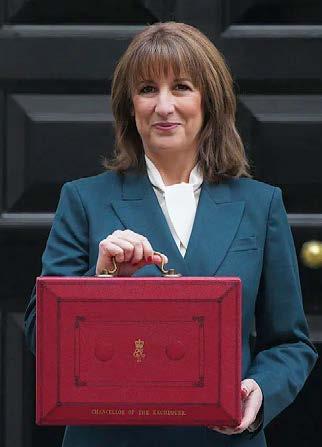
tHE MuCH-AWAItED Budget finally arrived on Wednesday, and after more than an hour of Rachel Reeves’ rambling, we were left with the same old story: more spending, more welfare, and the working public footing the bill.
Reeves talked endlessly about breakfast clubs and scrapping the twochild cap — policies, she said, paid for by those with “the broadest shoulders.” In other words, anyone who actually works for a living and isn’t responsible for raising other people’s children. There was no talk whatsoever about reducing the welfare bill for those who simply don’t want to work.
The income tax threshold remains frozen until 2032, which means your
tax bill quietly rises year after year as wages go up. Landlords were hammered again, guaranteeing even fewer rental homes. Not a single meaningful mention of small farmers, small businesses, or the struggling rural economies of Wales.
Opposition leader Kemi Badenoch responded with the most memorable line of the afternoon, comparing Reeves and Keir Starmer to “Laurel and Foolhardy” and branding the Budget “the nightmare before Christmas.” She likened Reeves to the sort of guest who turns up late to a party and scoffs all the Quality Street.
Reeves recently objected to being called “Rachel from Accounts,” insisting it was inaccurate — and she’s right: she previously worked in customer services at Halifax, not finance. Her arrogance seems to know no bounds. At a recent meeting with Scottish business leaders, someone politely interrupted her. She snapped back: “Excuse me, I am the Chancellor of the Exchequer.” Badenoch called on her to resign, describing her as the worst Chancellor in history — hardly surprising given the growing list of excuses for every mounting economic catastrophe. All in all, Reeves fits neatly into the failed concept that is modern socialism.
COVID Inquiry: £200m to Tell Us What We Already Knew
Baroness Hallett’s Covid Inquiry,
Leon Ballin, Sustainable Food Places Programme Manager, said Pembrokeshire’s approach was setting an example for other areas across the UK.
He said: “The Pembrokeshire Local Food Partnership has shown just what can be achieved when creative and committed people work together to make healthy and sustainable food a defining characteristic of where they live.
“While there is still much to do and many challenges to overcome, Pembrokeshire has helped to set a benchmark for the other one hundred and twenty plus members of the UK Sustainable Food Places network to follow.
“They should be very proud of the work that they have been doing to transform our collective food culture and food system for the better.”
The Sustainable Food Places programme works across six key areas – from tackling food poverty and dietrelated ill-health, to supporting a vibrant local food economy, transforming publicsector catering and procurement, and cutting food waste as part of efforts to tackle the climate and nature emergency.
which has dragged on for two years, finally published its findings — 750 pages costing the taxpayer a staggering £200 million. That’s roughly £170,000 a word.
As expected, Boris Johnson and Matt Hancock took most of the flak, with precious little acknowledgment of the life-saving vaccine the UK helped deliver to the world. Hallett concluded that 23,000 lives could have been saved if the UK had locked down one week earlier — a bold claim, given that Sweden had no lockdown and suffered fewer proportional deaths.
Of course, the Inquiry avoided discussing the nightly fear-mongering from government health advisers — Chris Whitty, Patrick Vallance and Jenny Harries — whose grim briefings caused untold mental-health damage. After all that time and money, we’ve effectively learned nothing we didn’t already know.
Ukraine: A War Drifting Into Its Fourth Year
Are we any closer to peace in Ukraine? President Zelensky looks exhausted, as the war with Kyiv’s unwanted neighbour moves into its fourth year. Moscow says the latest peace proposals look “promising.”
Donald Trump, poised to return to the White House, is eager for a deal — but appears more interested in appeasing Putin than supporting Zelensky.
Europe watches nervously as
drones continue to hammer Ukrainian cities. The country still bears the trauma of the Holodomor of 1932, when Soviet policy starved between three and five million Ukrainians. Ukraine may eventually be forced to concede the Donbas region as the painful price for peace, especially with NATO membership off the table. Meanwhile, soldiers and civilians are dying as another brutal Eastern European winter approaches.
COP30: A Festival of Hypocrisy COP30 has now stretched into its second week, and the green lobby appears weaker than it has in years. Nobody dares mention fossil fuels anymore — Saudi Arabia has made it very clear it won’t tolerate limits on oil production.
Meanwhile, 150 delegates continue to rack up enormous carbon footprints on their Brazilian eco-holiday. Hypocrisy, it seems, is the world’s only truly renewable resource.
And finally…
A pocket watch that stopped at 2:20am — the exact moment the Titanic sank on April 15, 1912 — has sold at auction for $2.3 million. It belonged to wealthy businessman Isidor Straus.
All I can say is: it must have been decent quality, eh?
MIKE DELLO

REsIDENts are being urged to plan their nights out carefully and book local taxis as Dyfed-Powys Police warn of the dangers of drinkdriving during the busy Christmas party season.
Although this year’s enforcement campaign has not yet been formally launched, last year’s figures show the scale of the problem facing the force. According to official Dyfed-Powys Police data, 55 people were arrested for drinkdriving in December 2023. Across a wider twelve-month period from September 2022 to September 2023, a further 446 people were charged with drink-driving offences – 358 men and 88 women.
Police say those figures should act as a “clear reminder” that too many motorists are still taking risks, particularly the morning after heavy drinking.
POLICE: NO SAFE LIMIT AND NO QUICK FIX
In public guidance issued on their website, the force warns that there is no safe way to judge whether a driver is under the limit, stating: “It’s
impossible to get alcohol out of your system quickly. A shower, coffee or any other method won’t remove the alcohol from your body.”
Officers stress that alcohol can remain in the system well into the next day, leaving drivers unknowingly over the legal limit even after a night’s sleep.
A spokesperson for DyfedPowys Police said that drivers should plan their transport before leaving home, adding: “The safest option is to leave the car at home and arrange a lift or book a taxi.”
Taxi operators across Pembrokeshire report that they are already receiving increased bookings from workplaces, pubs and clubs for Christmas gatherings. Many firms will be running extended hours on the busiest weekends, but availability will still be tight.
Residents are being advised to book taxis early and avoid relying on being able to “grab one at closing time”, particularly in rural areas where fewer vehicles are on the road.

Taxi firms also point out that the “morning-after risk” is one of the most common causes of drink-drive arrests in winter, and encourage anyone unsure of their alcohol level to arrange transport rather than take a chance.
Pembrokeshire’s rural road network, narrow lanes and exposed coastal routes can be particularly hazardous in wet and icy conditions. Local councillors have backed the safety message, reminding
residents that impaired driving on these roads puts lives at risk.
A spokesperson for Pembrokeshire County Council said: “Every drink-drive collision is preventable. Planning ahead can protect you, your family and other road users.”
Police are urging residents to look out for friends on nights out, make use of taxis and designated drivers, and avoid becoming a statistic on the county’s winter roads.
The message remains simple: Plan it. Book it. Don’t risk it.


FIREFIgHtERs rom Milford Haven have completed their annual water-rescue training in Llandysul – an exercise that has become increasingly important for a coastal town surrounded by beaches, tidal waters and marinas.
The crew, part of Mid and West Wales Fire and Rescue Service’s specialist Wading / Water First Responder capability, spent the weekend practising survival skills and rescue techniques on the fast-flowing River Teifi. The “Annual Dip” keeps Milford’s firefighters certified to tackle the wide range of water-related incidents they face at home.
Although Milford Haven is best known for its port and marina, the area also sees regular tidal surges, rough seas, cliff-edge risks, storm flooding and inland flooding from heavy rainfall. Crews are routinely called to people swept off coastal paths, cars trapped in rising water, mud-entrapment near the foreshore, and incidents on the Haven waterway itself.
With climate change increasing the frequency of sudden floods and severe coastal weather, the station says maintaining water-rescue competence is now just as important as traditional firefighting.
Photos from Llandysul show the Milford crew fully kitted in drysuits, buoyancy aids and helmets, entering the river under controlled conditions. The training covered safe wading, throwline rescues, team communication and managing casualties in fast-moving water.
A spokesperson said: “Living and working in Milford Haven means we’re surrounded by water – the marina, the

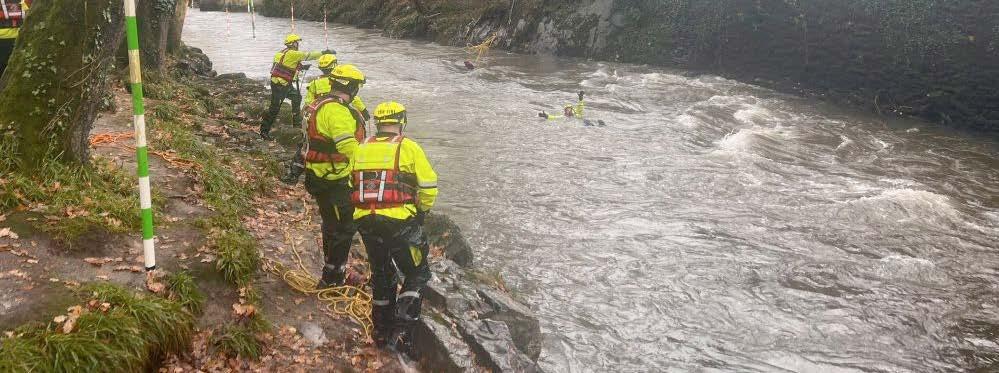
Haven waterway, nearby beaches and streams that can rise quickly in bad weather. We need these skills all year round. The incidents we attend aren’t always fires – more and more involve
Mid and West Wales Fire and Rescue Service added that the exercise ensures crews remain ready for anything from a coastal emergency to a storm-related
rescue inland.
Residents are reminded never to enter floodwater, avoid driving through water on the road, and call 999 immediately if someone is in difficulty.
MAyORs from across the county joined families, leaders and supporters at Haverfordwest High VC school as Pembrokeshire scouts gathered for a packed Chief scout Awards evening.
The Mayor of Milford Haven, Cllr William Elliott, attended with his Consort, Mr Lloyd Jones, and presented awards to members of 2nd Milford Haven Sea Scouts and 1st Johnston Scout Group. Also in attendance was the Mayor of Haverfordwest, seated among the large audience inside the school’s lecture theatre.
The ceremony recognised young people from multiple Scout groups across the county, marking achievements earned through months of volunteering, outdoor challenges and community engagement. Leaders from the various sections described it as one of the most important events in the Scouting calendar.

A NEW report published today by the Older People’s Commissioner for Wales lays bare the scale and growing impact of poverty among older people — and warns that thousands face a dangerous winter without immediate support from both the Welsh and uK governments.
The report, Older People and Poverty in Wales, uses older people’s own testimonies alongside the latest national data to show how widespread and entrenched hardship has become. It reveals that one in six older people in Wales now lives in poverty, with some groups hit far harder than others.
Among the starkest findings is that one in four women living alone is experiencing poverty, while nearly half of Black, Asian and Minority Ethnic households are estimated to be affected. The cost-of-living crisis has pushed many more older people on fixed incomes to breaking point.
‘Heating or eating’ becoming normalised
The report highlights the “impossible choices” older people are being forced to make.
One in five has gone without heating, while a quarter have skipped meals or eaten less. These decisions are taking a serious toll on people’s health.
Cold homes increase the risk of hypothermia and worsen a wide range of conditions, while poor nutrition can exacerbate diabetes, heart disease and arthritis. Winter makes these dangers even more severe, with inadequate heating and diet contributing to higher mortality and avoidable pressure on the NHS.

In Wales alone, cold homes cost the NHS more than £40 million a year. Commissioner calls for urgent reforms
The Commissioner, Rhian BowenDavies, is calling for coordinated action from Cardiff Bay and Westminster, including:
• Ending the Pension Credit cliff edge, which leaves many older people just above the threshold losing out on support worth thousands.
• Creating a Resilience Fund for older people in severe financial hardship who do not qualify for existing schemes.
• Greater investment in energyefficiency improvements, particularly important in Wales, which has some of the oldest housing stock in Europe.
• Funding for councils to proactively identify older people missing out on entitlements and help them claim.
• Streamlined, stigma-free applications for financial support.
• A long-term national debate about the income required for a dignified retirement, forming the basis for a sustainable pension system.
The report also urges local authorities, utility companies and internet service providers to expand social tariffs and adopt wider community-based support.
Rhian Bowen-Davies said the
findings should act as a wake-up call as the Chancellor prepares to deliver the UK Budget.
“With finances and living costs in the spotlight again this week, my report is a stark reminder of the realities faced by people living in poverty — an issue now affecting one in six older people,” she said.
“As the weather turns colder, many across Wales will be wondering how they’ll pay the bills. Too many may soon face a choice between heating or eating, putting their health at serious risk. Sadly, this has become normalised.”
She warned that discussions about cuts and efficiencies frequently overlook the cost of poverty itself.
“Cold homes cost the NHS in Wales over £40 million a year. People living in poverty are more reliant on health and social care services. Tackling poverty would save tens of millions and strengthen our public services.”
She said decisive action was needed both immediately and in the long term.
“In the short term, we need better access to support, simpler systems, the end of the Pension Credit cliff edge, improved energy efficiency, and emergency help for those in hardship.
“In the longer term, we need a national conversation about what constitutes a sufficient income to live and age well, which should underpin a sustainable pension system for the future.”
“As Commissioner, I will continue to press for coordinated action to tackle poverty and create a fairer, healthier and more inclusive Wales.”
REPREsENtAtIVEs from seven charities supported by Narberth & Whitland Rotary, Narberth RFC and event sponsors came together on Wednesday (Nov 19) for the annual cheque presentation evening.
Each organisation received a donation from Rotary President Robin Bradbury, who handed over the cheques before charity representatives gave a short overview of their work. The groups support a wide range of causes across Wales, with the exception of Roko 20 Academy in Kenya – a primary school providing free education to orphans and children from disadvantaged backgrounds.
Rob Lewis, speaking on behalf of Narberth RFC, welcomed guests and thanked all involved for their commitment to serving the community. The charities receiving donations were:
• Canolfan Elfed – represented by
Tom Sinclair editor@herald.email
Wendy Sykes-Wilks
• Wales Air Ambulance –represented by Mike May
• Sandy Bear Children’s Bereavement Charity –represented by Martin Jones and Lisa Jenkins
• ROKO 20 Academy – represented by Tracey Neale-Ferreira
• Paul Sartori Hospice at Home –represented by Val Harrold and Gill Jones
• Narberth Foodbank – represented by Ian Watling
• Prostate Cymru – represented by Rotarian Peter O’Shea
The evening closed with thanks to all partner organisations, volunteers and supporters who help maintain the strong fundraising tradition in the

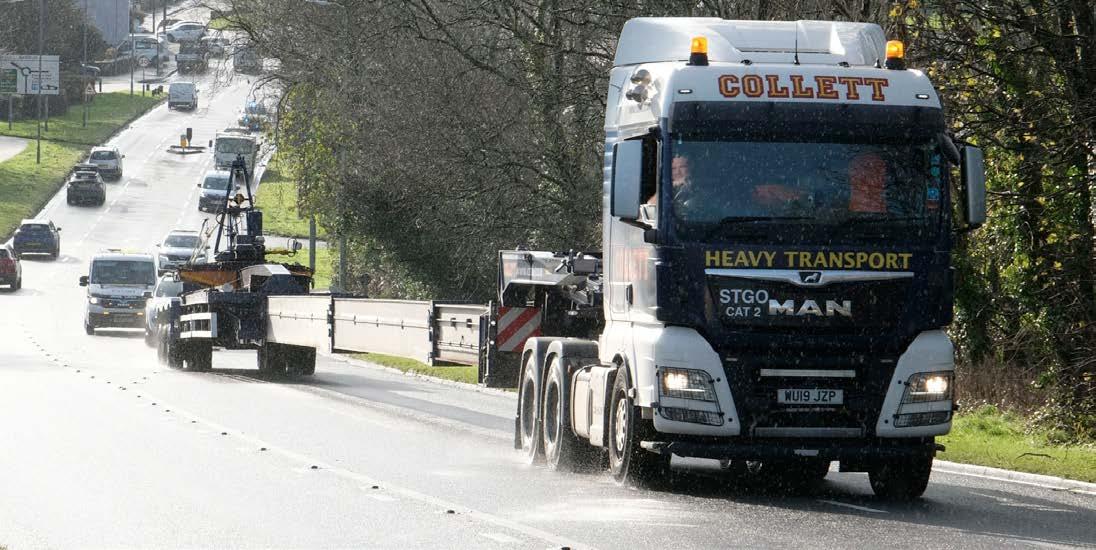
A LARgE heavy-transport convoy moved through Pembrokeshire on tuesday morning (Nov 25) as part of a fresh trial run linked to the forthcoming delivery of wind turbine components for the Celtic sea energy programme.
The escorted load — operated by Collett Heavy Transport — travelled
from the port area towards the A477 after completing manoeuvring tests around key junctions near Dragon LNG and Victoria Bridge. Motorists experienced short delays as police and escort vehicles briefly halted traffic to allow the abnormal load to negotiate roundabouts and narrow pinch-points.
The run follows a recent series of
tests carried out in the town to confirm whether the long turbine towers and blades can be safely transported from the Milford Haven waterway to strategic storage and assembly areas. A similar convoy was witnessed late last week as engineers assessed turning radiuses, street gradients, and safe clearance for oncoming vehicles.
Collett’s specialist trailer, fitted with a rear steering module, was again seen crawling through Havens Head roundabout and along Hamilton Terrace, with operators walking alongside the load to monitor clearances. The test vehicle was carrying a long metal test beam representing the projected length of turbine tower sections expected to arrive at the port in the coming months.
The Herald understands that this week’s movement forms part of the logistical planning for future offshore wind developments in the Celtic Sea, with Milford Haven earmarked as a key hub for component handling. Dragon LNG’s proximity to deep-water berths and heavy-lifting capability has made it one of the preferred landing points for oversized renewable energy cargoes.
Traffic management teams said disruption was minimal, although queues built up temporarily on the main approach roads while the convoy repositioned. The trial run is expected to be repeated as engineers fine-tune the route ahead of full-scale deliveries.
Further details on scheduling and the scale of future turbine arrivals are expected to be confirmed by the Port of Milford Haven in due course.
Photos: Martin Cavaney

A BRAND-NEW Festival of Light trail will bring a vibrant glow to Cardigan this winter, launching on saturday, 29 November at 4.30pm to coincide with the town’s annual Christmas lights switch-on.
Residents and visitors will be able to explore giant lantern sculptures installed throughout the town centre, with Cardigan Castle and The Tabernacle also set to be illuminated as part of the trail. The displays aim to create a magical atmosphere to mark
Tom Sinclair editor@herald.email
the start of the festive season.
COMMuNIty EFFORt
In the run-up to the event, Small World Theatre has worked closely with local shops and businesses, helping them design themed Christmas window displays. Organisers say

the result is a creative, communityled celebration of light, art and imagination.
“The Festival of Light Trail will add even more spectacle to Cardigan Town Council’s plans for this year’s switchon,” said Sam Vicary, communications manager for Small World Theatre. “The whole town is coming together to create something really special, and it will look amazing.”
FEstIVE sEAsON sHOWCAsE
The trail will remain in place throughout the Christmas period. It is part-funded by the UK Government through the UK Shared Prosperity Fund, administered and supported by the Cynnal y Cardi team at Ceredigion County Council, with additional support from Awards for All and Cardigan Town Council.
Further details can be found at smallworld.org.uk or creativecardigan. com.
A PEMBROKE DOCK optician has been named as one of Wales’ most promising trainee opticians after being shortlisted for the student of the year award at the Optometry Wales Awards 2025.
18-year-old trainee dispensing optician Elysse Hubbard, from Specsavers Pembroke Dock, has been recognised for her dedication, professionalism and outstanding contribution to the future of optometry.
Having joined the Specsavers store in 2023 as an apprentice retail assistant, Ms Hubbard has quickly progressed through the ranks. She is now training to be a dispensing optician and hopes to qualify as a contact lens optician in the future.
‘It was such a surprise to be nominated for the Student of the Year award,’ says Ms Hubbard.
‘I’ve learnt so much since joining Specsavers and feel really lucky to be part of such a supportive team. I love helping customers every day and can’t wait to keep developing my skills and knowledge.’
According to Specsavers Pembroke Dock’s retail director, Ellie
Tom Sinclair editor@herald.email
Thomas-Wigley, many customers specifically ask to be seen by Ms Hubbard – a testament to her warmth and ability to understand and meet their needs.
Ms Thomas-Wigley adds: ‘Elysse well and truly deserves to be recognised with this award from Optometry Wales. She’s an exceptional member of the team who fully embodies the values of Specsavers, with her positive attitude, commitment to excellent customer service and drive to improve her skills.
‘She’s also a role model and mentor to our new starters, regardless of their experience or age, making them feel welcome, supported and confident in their roles – qualities that will make her a fantastic leader one day.
‘Elysse is definitely one to watch and we’ll be crossing our fingers that she takes home the trophy.’

The winners will be announced later this week at the Optometry Wales Awards ceremony in Cardiff on 29 November.
To find out more information about Specsavers in Pembroke Dock, request an appointment or browse the online store, visit https:// www.specsavers.co.uk/stores/ pembrokedock.
Additionally, to make eye health accessible to all, the store offers a Home Visits service for those unable to leave their homes unaccompanied due to disability or illness.


the Llandeilo Antiques and Vintage Fair has grown in popularity over the last few years and can be located in the heart of Llandeilo, close to the main car park and nearby Works Antiques Centre. Here you will find a bustling, vibrant Fair with lots of antiques and vintage to whet your appetite. the fair now includes a vintage element with a touch of retro and because the festive season is upon us , there will be a Christmassy atmosphere at the fair. It will provide a unique Christmas shopping
experience with lots of choice and giving you a chance to recycle and help the planet.
Now the festive season is here, many of us will soon receive Christmas cards delivered by our local posties.
Many of the Christmas traditions we celebrate today, like trees and crackers, all started in the Victorian era. It also was the time when the idea of sending Christmas cards become popular after the first commercially produced Christmas card , was created by Sir Henry Cole in 1843.

A prominent educator and patron of the arts, Henry Cole travelled in the elite, social circles of early Victorian England, and had the misfortune of having too many friends.
Cole hit on an ingenious idea. He approached an artist friend, J.C. Horsley, and asked him to design an idea that Cole had sketched out in his mind. Cole then took Horsley’s illustration—a triptych showing a family at table celebrating the holiday flanked by images of people helping the poor— and had a thousand copies made by a

London printer. The image was printed on a piece of stiff cardboard 5 1/8 x 3 1/4 inches in size. At the top of each was the salutation, “TO:_____” allowing Cole to personalize his responses, which included the generic greeting “A Merry Christmas and A Happy New Year To You.”
It was the first Christmas card.
Cole’s Christmas card was also published and offered for sale at a shilling a piece, which was expensive at the time, and the venture was judged a commercial flop. But the 1840s was a period of change, with Prince Albert introducing various German Christmas traditions to the British public, including the decorated Christmas tree.
Early Christmas cards were expensive to produce. They were printed on one-side only and were the size of a typical business card today. Many were printed in black and white or sepia and were hand coloured. Most were initially produced by Valentine’s card printers, who were looking to expand their business, so many early Christmas cards often contained romantic images. Early British cards rarely showed winter or religious themes, instead favouring flowers, fairies and other fanciful designs that reminded the recipient of the approach of spring. Humorous and sentimental images of children and animals were popular, as were increasingly elaborate shapes, decorations and materials.
Things changed with the developments in printing processes in the 1860s. The new cheaper cards with different, more complex designs became available and by the 1870s the

practice of sending Christmas cards had firmly been established as a British Christmas tradition.
Designing cards soon became a serious business, with designs even reviewed in the national press. They were seen by many as pieces of art and card companies often commissioned prominent artists to create new designs.
Cards started to appear in different shapes and sizes and some were further decorated with colourful paper, ribbon or frosting. Others featured animals, puns, riddles and hidden messages.
Designs featured a wide range of imagery including symbols representing the natural world and pagan yuletide images from historical winter celebrations. Holly and ivy, lambs and images of spring were popular, as well as the more familiar robins, celebrations, and Father Christmas.
The Victorian era saw a communication revolution with the introduction of the Penny Post in 1840–in which a letter or card was paid for in advance with a postage stamp (known


as a Penny Black) and cost just a penny. Before 1840, the British postal system was highly complex and very expensive. Letters were charged by distance and the number of sheets of paper they used. Normally, the charge was paid by the recipient and it could be very expensive. With the introduction of the Penny Post, the postal service became very popular as more and more letters and cards were sent.
The production of Christmas cards was, throughout the 20th century, a profitable business for many stationery manufacturers, with the design of cards continually evolving, with changing tastes and printing techniques.
The World Wars brought cards with patriotic themes. Idiosyncratic “studio cards” with cartoon illustrations and sometimes risque humour caught on in the 1950s. Nostalgic, sentimental, and religious images have continued in popularity, and, in the 21st century, reproductions of Victorian and Edwardian cards are easy to obtain.
Modern Christmas cards can be bought individually but are also sold in packs of the same or varied designs. In recent decades changes in technology may be responsible for the decline of the Christmas card. Email and telephones allow for more frequent contact and are easier for generations raised without handwritten letters – especially given the availability of websites offering free email Christmas cards. Some card manufacturers now provide E-cards. In the UK, Christmas cards account for almost half of the volume of greeting card sales,and the majority make a donation to charities.Some charities produce their own cards and is a vital lifeline to their cause.Although the trend is to not to send cards, most can be recycled or made into gift cards.There will be lots of Christmas themed stands for you to enjoy at the fair and a good opportunity to do some Christmas shopping.
Being a Welsh Fair it is understandable that there should be a good selection of Welsh items on offer. Whether it’s an original Welsh


watercolour or oil painting or a piece of Welsh pottery or examples of Welsh textiles.There will also be a selection of Welsh blankets and textiles on display , the result of Wales having a rich heritage , in the woollen industry.
There will also be attractive displays of gardinalia at the fair and they has proved extremely popular including watering cans , planters,wheel barrows ,garden tools and large garden pots and urns.
The Llandeilo fair has a rich cross section of antiques and vintage on display, from jewellery,watches, books, ephemera, militaria and vintage clothes and accessories. There will also be collections of glass and up cycled and pre loved furniture, plus interior design pieces. I’m sure visitors will not be disappointed with the selection on offer at this popular fair.
Homemade refreshments will be available and doors open at 10 am until 4pm.Admission is just £2 and dogs are welcome.



PEMBROKEsHIRE COuNty
COuNCIL’s pledge under the gold Defence Employer Recognition scheme continues to deliver real results, with another successful appointment made through its guaranteed Interview scheme (gIs) for veterans and military families.
The latest role – a Service Children’s Mentor – has been created at Haverfordwest High VC School and its primary school cluster after a grant was awarded by the Armed Forces
Covenant Trust. The post will provide direct support to pupils from military families, including those attending schools with only a small number of service children.
Five of the twenty-three applicants qualified automatically for interview under the GIS because they were veterans, military spouses or partners.

Miranda Corcoran, the successful applicant who is currently based in Cyprus, said:
“This is the first time in twenty years that I’ve been able to secure employment before arriving in a new location. The GIS is an ‘armed forces friendly’ policy that significantly eases the transition into work for military spouses when moving with their families.”
Reg White of Haverfordwest High VC School said:
“We have the largest cohort of service children in Wales within our school and cluster. The appointment of a Service Children’s Mentor will make a significant impact on pupils’ wellbeing, particularly those in schools with very small service communities. We are extremely grateful to the Armed Forces Covenant Trust for funding the post and to Pembrokeshire County Council for actively supporting the employment of service personnel and their spouses.”
Since Pembrokeshire County Council introduced the Guaranteed Interview Scheme in March 2024, a total of 199 UK Armed Forces veterans and spouses/partners have been interviewed for roles, with 38 appointed – an appointment rate of around 20%.
Councillor Simon Hancock, Pembrokeshire County Council’s Armed Forces Champion, added:
“Pembrokeshire is proud to support our armed forces community, and this appointment is a shining example of how policies like the Guaranteed Interview Scheme are making a real difference.”
Further information on the Council’s Armed Forces Guaranteed Interview Scheme is available on the Pembrokeshire County Council website.
A PILOt Pembrokeshire disabled resident parking bay scheme will not be continued in its present form as it is not supported by uK legislation, councillors heard.
Members of Pembrokeshire County Council’s services overview & scrutiny committee meeting of November 25 were asked to review the implementation and impact of the disabled resident pilot scheme introduced back in 2022.
A report for members, presented by Cabinet Member for Residents’ Services Cllr Rhys Sinnett, said: “The Disabled Persons Parking Pilot (DPPP) was launched by Pembrokeshire County Council in March 2022 to provide dedicated on-street parking bays for eligible disabled residents. The scheme was designed to operate within existing resources, with a commitment to review its effectiveness after two years.”
It said that, in the first year, 150 applications were received with 10 bays installed; 31 applications received the following year with another 10 bays installed before the 2025.
Eligibility was based on Blue Badge status and mobility benefit levels; however, no medical professionals were involved in assessing need, the report said.
The scheme saw an annual permit fee of £20, lower than ordinary residential permits, with setup costs of £5,500 for bay installation, plus £556 for advertising, with officer time estimated at £30,000 per year,
the report said, a comparable scheme in Neath Port Talbot costing £43,000 annually for 12 bays.
Members heard there were legal considerations as the pilot is not supported by UK legislation.
“Under the Road Traffic Regulation Act 1984, TROs must apply to classes of users (e.g., Blue Badge holders) or relevant permits holders as part of resident permit schemes, not individuals,” the report said, adding: “Enforcement must be based on eligibility category, not personal identity, to ensure fairness and legal compliance.”
It was recommended to move to category-based bays, in other words bays for blue-badge holders, saying: “This removes the need for individual screening and ensures legal compliance. Future requests for universal bays to be considered on a case-by-case basis alongside other on-street restrictions.”
It added: “This option builds on the investigative and design work completed to date, ensures legal compliance, and promotes fairness by making bays accessible to all eligible Blue Badge holders or, where appropriate, by creating designated bays within resident parking permit areas.”
Members backed supporting the recommendation
FOLLy FARM HOLIDAy PARK
has been crowned the Best s mall Lodge Resort in Britain at Hoseasons’ 19th annual awards ceremony.
The Kilgetty-based park picked up the top national title after receiving some of the highest scores in independent guest satisfaction surveys throughout the 2025 season. It was also named Best Small Lodge Escape destination in Wales.
The awards were presented at the Hilton Metropole in Brighton in front of more than 600 operators, suppliers and members of the Hoseasons team.
Chris Ebbsworth, Director at Folly Farm Holiday Park, said: “We are very proud of these awards. Our team always goes above and beyond to make sure our guests have a fantastic break when they stay with us, so it’s brilliant to see that hard work recognised in this way.”
Folly Farm Holiday Park is part of Hoseasons’ Evermore collection of luxury lodge locations aimed at families and groups looking to unwind in countryside and coastal settings.

Tom Sinclair editor@herald.email
Presenting the award, Neil Davies, Hoseasons’ Director of Commercial and Business Development, said: “The team at Folly Farm Holiday Park really are incredibly worthy winners. They always go the extra mile to
delight our customers – something clearly reflected in their excellent review scores. We are grateful for their continuing partnership and wish them all the very best for another
great year in 2026.”
More information about Folly Farm Holiday Park and other Hoseasons holidays is available at hoseasons. co.uk.

tHE WELsH AMBuLANCE sERVICE has launched a fresh appeal for volunteers in Pembrokeshire, with
new opportunities available to support patients and ease pressure on frontline crews.
The call comes as the service prepares to introduce new 999 call categories next week, making the need for community support even more important.
A new leaflet circulated locally highlights three key volunteer roles now open to people across the county:
Volunteer Car Service – transporting patients to hospital appointments in your own vehicle;
Community Welfare Responder –taking initial observations and offering welfare support;
Community First Responder –attending emergency calls to provide lifesaving care (following sign-off as a Welfare Responder).
No previous medical training is needed for any of the roles, and all volunteers receive in-house training, support and guidance.
Perks include:
• Learning new skills
• Building confidence
• Improving personal wellbeing
• Feeling more connected to the local community
• 45p per mile expenses
• Blue Light Discount eligibility
• Uniform and equipment provided
Ben Murray, a current volunteer from the Milford Haven area, said the experience has transformed his confidence and sense of purpose.
“I love being able to help and support my local community, as well as supporting the Welsh Ambulance Service and the NHS as a whole,” he said.
“It’s rewarding and a special role I will forever be grateful to have. Having uniform and in-house training provided really makes you feel like a family within the service, and I receive amazing mentorship from my mentor, Tom Smith.
“I struggle with learning difficulties and the Welsh Ambulance Service are so accommodating in making you feel valued and heard. I love what I do.”
The service says volunteering is a meaningful way to make a difference locally while gaining career-boosting skills and meeting new people.
Anyone interested can call 0300 131 1392 or visit ambulance.nhs.wales/ volunteering. You can also contact the team via amb_Volunteer.Onboarding@ wales.nhs.uk

tHROugHOut the year, the dedicated creative teams at the torch theatre bring professional live productions to life. For the 2025 Christmas pantomime, Rapunzel, the team is shining a well-deserved spotlight on their Musical Director, sarah Benbow, whose long career has been shaped by a passion for nurturing performers.
With 27 years of experience at Pembrokeshire Music Service and a background in vocal coaching, Sarah describes her journey into musical direction as a natural progression.
“I’ve always loved working with individuals dreaming of becoming professional performers, but I was keen to work with those who have already made that journey,” she explains. “Working as an MD allows me to help actors further develop their voices and explore characters through song… I love it.”
For Rapunzel, Sarah steps in once composer James Williams has created the show’s vibrant score. From that point, she works closely with the cast to learn, interpret, and enrich each musical moment.
“After James has written the amazing songs, I work with the actors, helping them learn and interpret them, ready for the performance.”
Describing the music as “fun, loud, and catchy”, Sarah says the score is central to the show’s storytelling. “It shows a different side of the character and how they connect with the audience,
Tom Sinclair editor@herald.email
telling their story through music.”
Collaboration, she says, is key. She has worked closely with director Chelsey Gillard and choreographer Freya Dare to shape the production’s musical identity.
“We discuss the lyrics, interpretation and characterisation of the song, making sure we’re all on the same page and coming from the same creative direction.”
For Sarah, the best part of the job is the process itself.
“Rehearsals,” she says without hesitation. “Seeing the show develop and grow is really exciting.”
She adds that working with this year’s cast has been “an amazing privilege – they are such a great group of talented actors.” The production features a company of professionally trained performers, including well-known local faces such as Lloyd Grayshon (Dame) and Holly Mayhew (Rapunzel).
Audiences can expect a music-filled Rapunzel bursting with energy, character and heart, thanks in no small part to Sarah’s vision and enthusiasm.
Rapunzel runs at The Torch Theatre from Saturday 06 December to Sunday 28 December.
Prices: £24.50 | £20.00 Concessions | £78.00 Family
Relaxed Environment Performance: Saturday 13 December at 2pm
BSL Interpreted Performance (Liz May): Tuesday 16 December at 6pm.

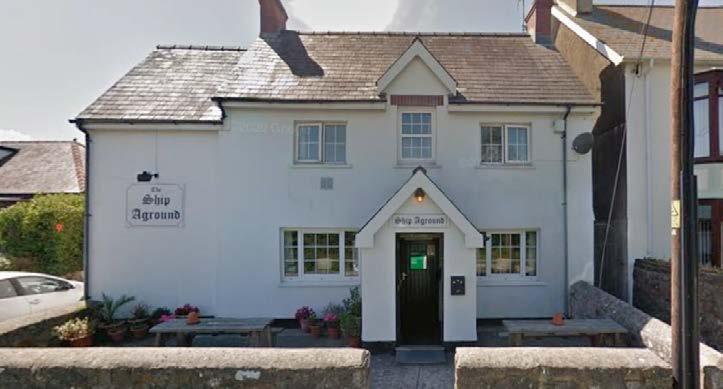
FREsH plans for a previously refused scheme to build a threebed house on the site of a north Pembrokeshire pub car park have again been refused by the national park.
Julian and Alison Parkes sought permission from Pembrokeshire Coast National Park to build the house on land
Bruce Sinclair Local Democracy Reporter
near The Ship Aground public house, Dinas Cross, used as a car park for the pub, creating seven new parking spaces nearby to replace the site.
The application followed a 2024 refused scheme, refused on the basis
of insufficient information regarding highway safety, parking provision for The Ship Aground public house, and lack of affordable housing contribution.
An officer report recommending refusal for the latest application said:
“The proposed dwelling would be sited within a generous plot; the scale of the building is broadly comparable with surrounding dwellings, and separation distances to neighbouring properties are adequate. The proposal incorporates sufficient private amenity space for future occupants, and appropriate boundary treatments and landscaping could mitigate some impacts.
“However, the development would result in the loss of existing informal parking for The Ship Aground public house, potentially leading to indiscriminate parking on or near the A487 trunk road. This could have a detrimental effect on the safety, convenience, and general amenity of both residents and visitors to the area.”
It said The Welsh Government, as highway authority for the nearby A487
trunk road, has issued a direction not to grant planning permission due to insufficient information on access and parking, adding the applicant had not submitted a required Risk Assessment necessary given the site’s position adjacent to a 40mph section of the A487.
“Without this assessment, the highway authority cannot determine whether the proposal would present an unacceptable risk to trunk road users,” it said, adding: “Additionally, no evidence has been provided to demonstrate how operational parking needs for the public house staff, residential elements, deliveries and commercial vehicles will be managed without causing injudicious parking or adverse impacts on the trunk road network.”
It also said, as the proposal introduces a new dwelling, a financial contribution towards off-site affordable housing is required under policy, but no draft unilateral undertaking has been submitted to secure this contribution.
The application was refused on those grounds.


Pudding Pirates, and he has composed every Torch pantomime since. His wider credits include work with NTW, WNO and Hijinx.
This year’s Musical Director is Sarah Benbow, a familiar name in Pembrokeshire’s music community. With more than 27 years working for the county’s Music Service, Sarah has collaborated with the BBC Chorus of Wales, The Aloud Charity and numerous musical and dramatic groups across Wales.
Rapunzel marks Kevin Jenkins’ fourth design for the Torch Theatre, having previously created the sets for Private Lives, Beauty and the Beast and Jack and the Beanstalk. He has also designed numerous productions for Sir Alan Ayckbourn at the Stephen Joseph Theatre. He returns this year to craft Rapunzel’s world and costumes, adding to a portfolio that includes Show & Tell, Constant Companions, Family Album and The Girl Next Door.
THE COUNTDOWN is officially on for the torch theatre’s hair-larious Christmas pantomime, Rapunzel. And while some may say it is too early to talk about Christmas (oh no, it isn’t), the creative team behind this year’s production have already been hard at work preparing a fantastically funny festive show (oh yes, they have).
This year’s pantomime brings together a breadth of professional and local talent, both on stage and behind the red curtain. Leading the magic backstage, the team combines decades of experience to bring Rapunzel’s world to life in Milford Haven.]
Award-winning director and current artistic director of the Torch Theatre, Chelsey Gillard, returns to write and direct her third pantomime at the venue. Her first panto at the Torch, Beauty and the Beast, was a record-breaker. Before joining the Torch, Chelsey worked as Carne Trust Associate Director at the Stephen Joseph Theatre. “It’s a pantomime not to be missed,” she said. “We are eagerly looking forward to a lot of belly laughs this Christmas.”
Pembrokeshire-based composer, writer and director James Williams once again provides the music and lyrics. His long association with the Torch began in 1998 with Christmas Cat and the
Costume supervisor Louise Sturley brings international experience, from working in screen wardrobe at the BBC to creating costumes for Madonna’s world tour. Louise first worked with the Torch in 2006 and has since built a career spanning theatre, film, television and live music. She now adds Dame Belinda Beehive to her list of stars she has dressed.
Lighting Designer and Production Manager Ceri James continues his long relationship with the Torch. Over the past decade he has designed lighting and video for productions including Private Lives, Sleeping Beauty, Of Mice and Men and Carwyn.
Local actor and choreographer Freya Dare, who runs her own children’s theatre company in West Wales, returns after performing in last year’s Jack and the Beanstalk. This year she plays Zephyr the Puffin and also serves as the show’s choreographer.
Completing the creative team is Milford Haven-born Bethan Eleri, who takes on the role of Fight Director. Over the past ten years she has choreographed fight and intimacy scenes for both stage and screen, including contributing to the martial arts choreography for Enola Holmes 2. Bethan said she is delighted to be returning to the Torch.
sHOW DAtEs
Rapunzel runs at the Torch Theatre from Saturday 6 December to Sunday 28 December.
Price: £24.50, £20.00 concessions, £78.00 family ticket.
Relaxed Environment performance: Saturday 13 December at 2:00pm.
BSL-interpreted performance (Liz May): Tuesday 16 December at 6:00pm.

Tom Sinclair editor@herald.email
ORIEL y PARCO, the st Davidsbased National Park Discovery Centre, is preparing to welcome visitors this winter with a sparkling programme of festive events, creative exhibitions and seasonal surprises for all ages.
The North Pole Post Box returns
from Friday 22 November to Thursday 19 December, giving children the chance to send their Christmas wishes to Santa. Letters can be posted at the Centre, and families will be able to return three days later to collect a personalised reply from the elves’ workshop. The post box will be open daily throughout the season.
The celebrations continue on Saturday 29 November with the return of the Christmas Craft Market, running from 10am to 3pm. Visitors will be able to browse handmade gifts and seasonal food from local makers, enjoy live music throughout the day, and tuck into festive treats from The Brunch House café. With free entry and parking, the market will be a lively and welcoming start to the Christmas season.
Inside the Centre, three exhibitions will be on display throughout the winter months, offering creativity, reflection and inspiration.
A Pool of Rocks by Rachel Allen (8 November to 6 January) presents a striking collection of handmade silver jewellery, inspired by the textures and treasures of the Pembrokeshire Coast. Rachel’s designs draw on kelp, pebbles and ammonites, using ecoconscious and recycled silver, with
sparkling gemstones that reflect the colours of sea and shore.
In The Tower, Judith Leyland’s Twrch Trwyth (7 November to 21 December) brings the mythical boar of the Mabinogion to life. Though ultimately defeated, the creature is never destroyed – a symbol of defiance and strength captured in bold, imaginative form.
Mark Stanmore’s exhibition in the St Davids Room (14 November to 11 January) features a series of paintings of the Pembrokeshire coast, inspired by the Japanese philosophy of wabisabi. The work reflects the beauty of imperfection and change, offering a quiet space to connect with nature through art.
Rachel Perkins, Manager of Oriel y Parc, said: “This year’s Christmas programme brings together everything that makes Oriel y Parc special –local talent, creative exhibitions, and festive traditions that families return for every winter. We’re looking forward to welcoming both new and familiar faces through the doors.”
For more details on festive events and café opening hours throughout November and December, visit www. orielyparc.co.uk.





NEON Inferno on the Switch 2 is shaping up to be a neon-drenched love letter to the golden age of run-and-gun shooters, blending classic Contra-style firefights with the gallery-shooter depth of Wild Guns in a gritty, cyberpunkfueled New York of 2055. You slip into the boots of either Angelo or Mariana, two assassins tied to a rising crime family, and you’ll be darting through gritty city streets, dodging corrupt cops and rival syndicates, all rendered in gorgeous pixel art that pulses with neon lighting and moody volumetric effects. The game’s defining twist is its two-plane combat: enemies don’t just rush at you from the foreground they lurk in the background too, and you’re equipped with a lock-on aiming reticule so you can fire into that rear plane. There’s a “Bullet Time” mechanic that lets you
parry projectiles and send them back at your foes, which adds a slick, tactical layer to the chaos. Between missions you can spend your earnings on upgrades, gearing up with new weapons or buffs before you dive back into the carnage, and there are multiple difficulty settings plus a hardcore one-credit-clear Arcade Mode for purists. The game also supports local two-player co-op, letting you team up for the bullet-hell mayhem. Boss encounters feel handcrafted and challenging, often spanning multiple phases and demanding precise timing especially when combined with lane-switching hazards or sudden background threats. Level variety is a strong point: you’ll find yourself in jetski chases, rooftop showdowns, bar fights, and more, each stage leaning into the dualplane combat in creative ways.
The soundtrack complements the visuals with a pulsing, atmospheric score that brings out that dystopian, neon-soaked mood. That said, on the Switch 2 the performance isn’t flawless: there are moments, especially in handheld mode, where the frame rate dips and things feel a little choppier than you might hope, and the checkpoint placement and alternate-weapon system are a little uneven dying cheaply can sting, and some secondary weapons don’t feel very useful. But even with those flaws, Neon Inferno delivers a thrilling, stylish, and deeply satisfying experience, especially for fans of retro action. If you’re after something that’s both familiar and boldly inventive an arcadestyle challenge wrapped in a cyberpunk aesthetic this could be one of the most exciting indie shooters to land on the Switch 2.




zOOtOPIA 2 feels like a confident return to a world that never really left the cultural spotlight, delivering a sequel that builds naturally on what made the original so memorable while daring to push its characters into deeper and more emotionally layered territory. The film reunites Judy Hopps and Nick Wilde at a moment when their partnership feels fully lived-in, their banter easy and instinctive, giving the story an immediate spark that makes slipping back into zootopia feel both familiar and refreshing. What stands out most is how the sequel expands the city’s scope without diluting its heart; new districts and species aren’t included just for spectacle but are woven into the plot in ways that subtly shift the world’s social and political landscape, creating a sense of
genuine evolution rather than simple novelty.
The humor remains sharp, balancing snappy dialogue with clever visual touches, and the animation shows clear refinements from softer fur physics to more intricate crowd scenes that make the metropolis feel busier, denser, and more livedin. Beneath the bright, comedic surface runs a story driven by themes of trust, change, and the pressure that comes when unexpected responsibility collides with personal loyalty. Judy and Nick each face challenges that test their beliefs in ways that feel authentic to who they’ve become, giving their arcs a sense of growth that avoids the traps of formulaic sequel writing. Some of the new characters do feel like they hover at the edge of the spotlight, but the ones who step fully into the story bring energy, conflict, and charm,
often stealing scenes without overwhelming the core duo.
What’s most impressive is how the film maintains a steady rhythm even as it juggles mystery, comedy, and heartfelt reflection, rarely letting one drown out the others. The emotional beats especially those tied to the evolving dynamic between Judy and Nick land with surprising weight, offering moments that linger after the action winds down. By the time the credits roll, the sequel feels less like a return visit and more like a natural continuation of a world that still has space to grow. It’s smarter, braver, and more emotionally resonant, the kind of follow-up that respects its foundation while confidently stepping forward, leaving you with the sense that Zootopia still has plenty of stories waiting to be told.




NOW then, bach. gather round. I’ve seen some digital disasters in my time, but this week’s Budget leak from the Office for Budget Responsibility… well, I nearly spat my tea over the keyboard in disbelief. And it takes a lot for me to waste a tea.
Let me explain what happened, in plain Welsh English. The OBR uploaded their confidential Budget forecast early. Not linked anywhere, mind — just quietly sitting on their public server like a lost sheep waiting to be found. Last year, the link ended with “budget2024”. This year? “budget2025”. So all a journalist had to do was change the number. That’s it. No hacking. No cyber criminals. No Hollywood soundtrack. Just the simplest guess in the world.
This is not a cyber-attack. This is not espionage. This is exactly what happens when your file-naming system is being run by someone who still thinks “password123” is a good idea. You’d get a slap on the wrist for this in GCSE ICT.
But of course, Westminster being Westminster, the moment journalists clocked it, the whole place went into meltdown. Phones were being waved about in the Commons like a rugby crowd celebrating a lastminute try. Tory MPs were posting screenshots. BBC reporters were practically ready to read the Budget on-air themselves. And Rachel Reeves looked like someone had just told her the wifi had gone down.
Markets wobbled a bit — because markets, bless them, have the emotional stability of a cardigan rabbit — but soon settled. The OBR boss Richard Hughes came out and said he was mortified, which is fair enough. If I’d let a multi-billion-pound forecast slip because someone typed a different year into a web link, I’d be mortified too. Possibly retired. Moved to Machynlleth. Grown a beard.
Now they’ve called in Professor Ciaran Martin, former head of the National Cyber Security Centre. Lovely man. Brilliant mind. But even he’s going to look at this and say: lads, this isn’t cybersecurity — this is housekeeping. You don’t leave the document where the whole world can find it and then pretend it’s the work of international cyber villains. That’s like blaming Carmarthen’s seagulls for your chips when you left them unattended.
The real fix is simple. Randomise your file names. Don’t
upload sensitive documents early. Double-check what’s live before the chancellor walks into the chamber. Honestly, give me one competent Welsh mam with an iPad and she’d sort this in twenty minutes flat.
But let me tell you the part that annoyed me the most. Some MPs immediately started muttering about “criminal acts” under the Computer Misuse Act. Criminal? Behave. You can’t criminalise someone for opening a door you left wide open. There was no password to bypass. No barrier. Nothing. It’s like putting your front door key under a plant pot labelled “KEY” and then calling Dyfed-Powys Police when someone uses it.
And of course, this isn’t even the first time the Budget’s leaked early. Happens more often than people admit. But this one stands out because it was so embarrassingly preventable. Proper “tell no one” material — which is exactly why I’m telling you.
So what have we learned? That a huge part of government IT is still held together with string, optimism, and people who haven’t had proper digital training since Windows Vista. That sometimes the simplest mistakes cause the biggest drama. And that predictable web addresses are not, I repeat not, security measures. I teach that to first-year students. And half of them don’t turn up.
Anyway, bach, there you are. The Budget leak that wasn’t a leak, the hack that wasn’t a hack, and the cybersecurity scandal caused entirely by someone naming a file like they were rushing out the door to beat the traffic on the A48.
Until next week — keep your passwords strong, your URLs random, and for heaven’s sake, don’t put anything important online until you mean to.
Professor Barrie Evans, signing off.



S TRANGER
Things 5 arrives like a long-awaited storm over Hawkins, carrying with it the weight of every mystery, every scar, and every friendship the series has cultivated since its beginning, and from the very first moments it becomes clear that this season is operating on a scale that feels both monumental and deeply personal. The story opens with a sense of unease that settles into every corner of the narrative, as if the town itself is bracing for the impact of long-brewing consequences. The characters, older and visibly shaped by years of tangled secrets and supernatural threats, move through their world with an urgency that heightens even the simplest interactions; these are no longer kids stumbling into danger but individuals who

understand the stakes and carry the burden of past choices. What makes the season remarkable is its ability to blend staggering spectacle with genuine emotional intimacy, merging enormous, reality-bending set pieces with quiet, lingering moments where characters look at each other and communicate more through silence than words.
Every relationship feels sharpened and intentionally explored, whether it’s the unspoken tensions that have simmered through the group or the bonds strengthened by shared trauma. The writing allows each character a moment or several that feels like a culmination of their entire arcs, grounding the fantastical in deeply human experiences. Performances



across the board feel elevated, as if the cast approaches this final chapter with an intensity shaped by years of inhabiting these roles; subtle gestures, cracked voices, and exhausted smiles give the season a livedin emotional texture that holds your attention even between the bigger plot swings. The pacing is confident and deliberate, building tension in long, sinewy lines that stretch across episodes before snapping into action with scenes that feel both shocking and inevitable.
Visually, the season pushes further than before, presenting imagery that ranges from nightmarish to awe-striking, yet it never loses the grounding sense of wonder and retro charm that shaped the series’
identity. Even as the threat from the Upside Down expands in unpredictable ways, the show never becomes lost in its own lore; instead, it uses the supernatural chaos to highlight the characters’ inner conflicts, mirroring their growth through the world around them. Nostalgia is used sparingly and with intention, enhancing rather than overpowering the story. Music choices, familiar motifs, and subtle callbacks weave through the narrative like threads connecting the earliest seasons to this final one, amplifying the emotional stakes.
As the season barrels toward its finale, the narrative threads tighten with a momentum that makes each scene feel
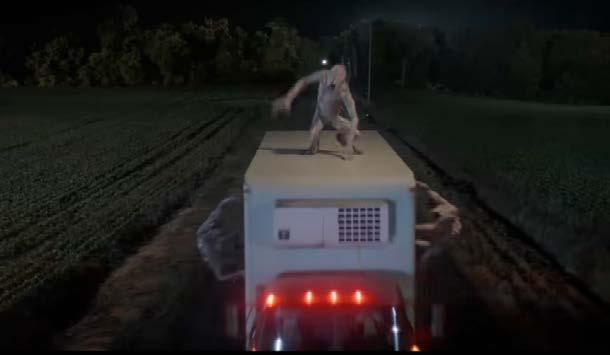
consequential. Friendships are tested, sacrifices loom, and the show refuses to shy away from exploring the cost of everything that has happened in Hawkins. Yet even in its darkest moments, the season maintains a sense of hope, the kind that feels fragile but fiercely held by characters who have learned that courage often comes from the willingness to keep going, even when the odds feel impossible. By the time everything converges in a finale that is audacious, devastating, and strangely uplifting, the season achieves something remarkable: it offers closure without feeling predictable, grandeur without losing its emotional honesty, and finality without abandoning the sense of adventure that defined the series from the beginning.
When the last frame fades, you’re left with the sense that Stranger Things 5 isn’t just the end of a beloved story it’s the chapter that allows the entire journey to snap into focus. It respects what came before, deepens everything that mattered, and delivers a conclusion that feels earned, resonant, and haunting in the best possible way.
had planned, but don’t worry. You’re in very trustworthy company. Confessing your ideas and secrets will feel liberating, and they will also be a balm for someone else’s hurting heart. This person will now be able to return to a more realistic life. Shared experiences connect you with others, even those who used to intimidate you. Remember, what you feel is just as valid as what they feel. CANCER In any close relationship, open communication is key, so if you suspect someone you love is holding back their true feelings, don’t wait another day to get to the bottom of it. Their signals or subtle hints are confusing the real issue (which is not as sinister as you fear). New information may require you to adjust a few of your expectations, but they won’t affect the core of your foundation. The important part is to make it clear that you’re there for them no matter what.
LEO Any time you begin a new route on this road of life, you need to lighten your load. With less on your mind (and in your heart), you’ll be able to move a lot faster and reach your goal a lot more quickly. Let go of old misconceptions and assumptions. It’s only fair that things should start with a clean slate. Changes in a relationship will initially feel uncomfortable, but that is to be expected, so don’t let it scare you off. This is a very exciting phase in your life.
VIRGO
You may wake up feeling a little directionless, but that’s not necessarily a bad thing. You are probably in a holding pattern of sorts, waiting for the right time to come in for a landing, so to speak. There are things moving around you in unpredictable ways, but rather than going forward and hoping for the best, you’re smart to stay back and let things settle on their own first. You have a very interesting view on things, one that you should keep in mind for later.
LIBRA
No matter how trying times can get, there’s one fabulous, undeniable fact you should remember: you can always count on yourself. Someone you love may need to be reminded of this truism when they’re disappointed yet again. Luckily, your day offers no disappointments; as a matter of fact, you should expect a few nice surprises in the romantic department. Someone’s been thinking of you, and they are being increasingly open about it. Look for a very public declaration.
SCORPIO
It’s a perfectly good idea to plan things out before you move forward. After all, there’s no sense in doing something before you fully understand what you’re doing. But everything is where it needs to be, and the blueprints are finalized, so why are you stalling? Take a look at why you might not want to move ahead now, and be honest about what is holding you back. Get ready to stare all your fears right in the face. Enjoy a good laugh when they crumble and disappear.
SAGITTARIUS
The shopping bug has bitten and it’s not letting go, but this fascination with material goods is not going to be good for you right now. All signs still point to save, save, save! Not only is throwing your cash around going to drain your resources, but it’ll distract you from things that matter most. There’s more delight to be found in the people around you than in some silly new gadget or trendy accessory. Put yourself on a budget and avoid the mall for a while.
CAPRICORN
Saying goodbye to someone you love (or letting go of something that was once precious in your life) is just a part of living. If you need to say goodbye, treat it like a celebration. After all, you are moving into a different phase of your life. New experiences will soon feed your intellectual curiosity and give you the level of satisfaction you’ve been seeking. As your wisdom and maturity grow, so will your appreciation for the people in your past.
AQUARIUS
You’re the kind of person who just can’t settle for anything less than the whole shebang.



by ediTor ToM sinclair

FOR months now Ministers have been floating the idea of scrapping jury trials for most criminal cases. Only the most serious offences would still go before twelve ordinary people. Everything else would be decided by a judge alone. this is being sold as efficiency and modernisation. It is nothing of the sort. It is a shortcut that threatens the foundations of British justice.
The public is being encouraged to believe that the Crown Court backlog, now approaching 80,000 cases, is caused by juries. We are told that trials take too long because the public cannot be trusted to deliberate quickly enough. Anyone who has ever been in a courtroom knows how absurd that is. The real delays come long before a jury is ever sworn in.
The Crown Prosecution Service has been running on fumes for years. Prosecutors are carrying impossible caseloads. Evidence is not reviewed in time. Disclosures are late. Basic case preparation is falling behind because there are not enough lawyers or support staff to do the work.
Forensic services are
overwhelmed. DNA analysis, toxicology, phone downloads and digital examinations routinely take many months. Some take more than a year. A justice system cannot move quickly when the evidence itself is stuck in a queue.
Files arrive in court incomplete. Witnesses have not been warned. CCTV has not been served. Exhibits are missing. Trials collapse and have to be relisted, adding months to already long delays. These failures all happen before a jury even walks into the building.
Barristers are leaving the criminal bar after years of underfunding and burnout. There are days when cases cannot proceed simply because no defence or prosecution counsel is available. When there is no representation, the courtroom stays empty despite a judge being ready to sit.
The most visible symptom of the crisis is the empty courtroom. Take Swansea Crown Court as an example. Four courtrooms, two in use, two unused. Not because jurors were unavailable. Not because defendants

made over more than a decade.
Trial by jury is one of the oldest safeguards in British law. It ensures that justice is not delivered solely by the state but is guided by ordinary citizens who bring common sense, experience and fairness into the courtroom. Removing juries from most cases is not a small administrative tweak. It is a fundamental shift of power away from the public and towards the state. Once that shift is made it will not be reversed.
Today Ministers say the changes would apply only to mid-range offences. Tomorrow it could be burglary. Next year it could be knife crime. Once the door is opened it becomes very easy to push it wider, case by case, year by year, until one of the most important rights in our system has quietly disappeared.
did not attend. Not even because judges lacked the hours. The rooms were empty because the system around them is failing. If the evidence is not ready, if counsel cannot attend, if the case file is incomplete, then even the best stocked court cannot run at full capacity.
It is true that the Ministry of Justice has increased the number of Crown Court sitting days this year. This is welcome and necessary after the severe cuts of earlier years, when strict caps often forced courts to sit idle. But even with this increase the system remains nowhere near the level required to bring the backlog under control. Additional sitting days do not fix CPS delays, forensic backlogs, staff shortages or a shrinking criminal bar. The justice system can only run as fast as its slowest part, and right now almost every part is slow.
Against this background the government is now suggesting that the answer is to scrap juries for most trials. Blaming juries for these delays is convenient, but it is dishonest. The public is not the reason trials take years. The cause is political choices
Wales will feel this even more sharply. With fewer courts, fewer barristers and fewer sitting days than England, justice here is already stretched thin. Removing juries from the majority of cases will make the process feel even more remote and even less accountable to the communities it serves.
There is a solution to the backlog, but it is not the removal of juries. It is proper investment in the basics. The CPS needs staff and funding. Forensic services need capacity. Barristers need support or they will continue to leave the profession. Court staff need to be recruited and trained. Courtrooms need to be open, repaired and fully used. Victims need proper communication and support. These are the elements of a functioning justice system. Without them the backlog will never fall, no matter how many rights the government takes away.
Scrapping juries is not reform. It is retreat. It is justice on the cheap. It is an attempt to shift blame from Westminster onto the public. And unless people speak out now this change may slide through with little scrutiny and even less consent, leaving the country with a justice system that works faster perhaps, but is far less fair.

MONEy, readers
If you are unfortunate enough to be a standard rate taxpayer working in Pembrokeshire, then you’re screwed. good old Rachel from Accounts has frozen the threshold at which you begin paying income tax for the next five years.
You’ve been mugged, readers. You’ve been betrayed. And the betrayal stems from cowardice and an unwillingness to make real changes to how we are taxed to reflect the world as it is now, rather than fifty years ago.
Think of it this way, readers. Suppose you earn £25,000 a year. The current tax threshold is £12,570. You pay income tax on every penny above that sum at the rate of 20%.
That’s a PAYE bill (excluding National Insurance) of around £2500 a year, or about £50 a week (rounding up). Your NI contributions are around £20 each week. Supposing you’re auto-enrolled in a workplace pension with a 5% contribution, that’s costing you another £19 each week. That leaves you around £20,000 a year to pay rent/mortgage, council tax, costs of running a car, utility bills, food, and clothing.
The important thing is that you’re going to get less of that money in real terms.
Suppose your pay goes up by 3.5% each year. In that case, freezing the income tax threshold means any increase in pay is eaten away by tax and the inevitability of inflation. In addition, your bills will go up, in all likelihood at a higher rate of increase than either inflation or your basic pay.
What does that mean, readers?
Yes, that’s it! You’ve been stitched like a kipper.
That is a tax increase. Make no mistake: by freezing tax thresholds for the lowest-paid workers, Rachel from Accounts has hiked income tax. That’s quite apart from the fact that the government will also benefit from higher National Insurance revenue.
The claim made in opposition and at the election that Labour would neither increase income tax nor increase NI has been broken as comprehensively as it would’ve been had the Chancellor put 2p on Income Tax rates. That’s what it amounts to - apart from the fact that that measure would’ve raised a lot more from higher earners than hitting the lower-paid with stealth tax hikes. This is a government that believes neither in the letter of its promises, let alone their

spirit. It’s government by verbal trickery and misdirection.
There is also a trap further along the PAYE system. Let’s suppose you have a job that pays you (at the moment) £50,000 a year. Every year, you get a 3.5% pay increase. Every year, the tax threshold remains at £50,270.
After Year One, you jump straight into the 40% tax band. Yes, readers. There is no taper. It’s a cliff edge. You hit £ 50,270, and you pay 40% tax on every penny over that amount. What fun! The better you do at the margins of the tax thresholds, the worse off you become. And that’s before you repay your student loan.
Why bother aiming for a well-paid job when you’ll practically be better off at a slightly lower income?
It gets worse. If you work in London and are paid £99,000 a year, that extra grand or so a year could end up making you £20,000 a year worse off if you have two children under three. Badger knows there aren’t that many high earners in Pembrokeshire, but that’s the sort of figure that makes him wonder how the UK manages and gears its tax system for the employed (i.e., those whose income is subject to PAYE).
The problem with how the UK gears its tax and benefits system is that certain state provisions are tied to your
PAYE income.
The 10% of ALL workers on PAYE who are the lowest paid will be better off. However, the next 10% and the next 10% after that will be worse off. Those two groups are not earning big money; they are in the range of c. £20,000 to £32,000 a year. Pembrokeshire’s economy is loaded with jobs in that bracket.
Our lovable scamp of an MP and our voter-repelling First Minister can try to dress up the Chancellor’s tax raid any which way they can, but reality bites: Pembrokeshire’s private-sector work force, especially those in modestly-paid full-time work, will be worse off. If you depend on the benefits system to top up your pay to two-thirds of a real living wage (i.e. poverty level), you might be just - just! - better off.
That’s incentivising work, all right, readers. It’s incentivising work in the same way as the probability that by the end of the decade, a quarter of all workers employed through PAYE will be in the 40% tax bracket.
The Chancellor’s stealth tax rises represent a massive deterrent to work, just at the time when increased employer NICs and other hits to business have shrunk the private-sector jobs market. In a real sense, employment is becoming nationalised. As the public sector grows,
SMEs face increased costs at both ends of business.

In Pembrokeshire, where an SME is a larger business, the results will be disastrous. Margins will be squeezed. Workers will not want to work for the taxman’s rake. In the local service, hospitality and leisure sectors, businesses will go to the wall. And that’s before you get to Labour’s ongoing war on rural Wales.
All governments are big on debt, and the primacy of the City of London and international markets in determining their economic policy approaches. However, those considerations - and the focus on bolstering the lowestpaid - displace consideration of those on modest to average incomes. Concentrating on opposite ends of the income distribution squeezes the large middle ground.
Another factor to consider is that the working-age population is declining and will continue to decline. That means that welfare benefits, including the State Pension, must be paid for through the tax system by fewer people. That undermines the fairness of the tax and benefits system. A generation hit by massively increased housing costs, whether rented or mortgaged, must pay the pensions of those who benefited from more affordable property prices and better real-terms incomes.
Meanwhile, less generous welfare benefits (on a penny-by-penny basis) mean those at the very lowest end have no hope of catching up.
The solution: revisit the whole tax, contribution, and benefit system to create one that is fairer and incentivises workers to claw their way up the income ladder. It’s way past time for a root-andbranch change in how we think about taxes levied on workers through their employment, as well as the priorities for future welfare payments.
In the dim and distant halcyon days of Brexit’s glad confident morning, there was a species of headbanging loon who extolled the opportunities of becoming more like Singapore. When it comes to PAYE, Badger couldn’t agree more. There are seven main income tax bands from 0% to 24%. There are no massive cliff edges between the tax bands, and the salary bands are more realistic than the UK model. Never mind the percentage income tax rates: the system makes sense.
Realism. Tax. UK. Nah! It’ll never work.

Caaawwww! gather round, you landlubbers and policy-peckers, because stephen seagull has swooped down from the Milford Haven rooftops with the week’s political takeaway. And let me tell you — I’ve seen fish guts left on the dock that were less desperate than this week’s Budget.
Picture it: you’re Rachel Reeves, perched on a very wobbly Westminster railing, feathers molting, Prime Minister wheezing behind you like a beached mullet, and the whole national flock circling overhead waiting to see who’s going to drop first. Polls plunging down the U-bend. Backbenchers sharpening their beaks. The Chancellor has one last chance to avoid being pushed off the perch.
And what does she do?
She chucks £26 billion of chips into the air and hopes the public won’t notice that none of them actually landed on their plates. They’ve landed on the pavement. And me? I’ve eaten better chips behind the Tivyside on a Saturday night.
Now listen here: that’s £26 billion not taken from the fat, waddling businesses waddling around Westminster with pockets full of seed — oh no — but from you lot, the hardworking two-legged taxpayers who haven’t had a decent wage rise since the Stone Age. The sort of people who feed me leftover sausage roll ends and apologise for not having more.
Rachel hasn’t saved you a penny. She’s bought herself time. Time for her and Keir “Please Stop Looking At Me Like That” Starmer to flap around No. 10 for a bit longer, hoping something — anything — will suddenly go right.
But this Budget? Well… if you bundled every measure together, it looked big. But take them apart and they’re smaller than the crumbs I pick off outside Greggs.
A BREAtHER… But NOt A REsuRRECtION
There’s no big idea. No story. No mission. No sense of what Reeves actually wants to do beyond making sure the spreadsheet gods at the OBR don’t throw her off Tower Bridge.
A little breather for the government? Sure.
A rescue from political doom?
Caaawww, don’t make me laugh. My cousin Cyril fell into a bucket of antifoul paint last week and even he looked less doomed. It’s so bad that the public now thinks Starmer and Reeves are performing worse than the calamity double-act of Liz “Whoops”

Truss and Kwasi “Don’t Worry It’ll Be Fine” Kwarteng. And I don’t care how many feathers you fluff — once you’re below that lot, you’re not circling: you’re plummeting.
tHE CIRCus WItHOut ANy FuN
This whole thing has been leaking all week like a fish crate with a hole in the bottom. Andy Haldane, ex-chief economist at the Bank of England, called it a circus — except circuses are meant to be fun. This one has no clowns, just clangers.
Businesses don’t know what’s going on, investors are confused, and the Bank quietly muttered in its last report that the Budget has actually dented growth. Even I, a bird with a brain roughly the size of a Tic Tac, could have told them uncertainty is bad for investment. If I don’t know when the bins are out, I can’t plan my day. It’s not rocket science.
WHAt DOEs RACHEL ACtuALLy WANt?
A proper Chancellor uses a Budget to tell a story. Gordon Brown’s crusade against child poverty. George Osborne’s mission to squeeze public services until they squeaked. Even Cameron had a plan — awful, yes, but a plan.
Reeves? Nothing. No big reason for her being in No. 11 at all.
She scrapped the two-child benefit cap — fine, that’s something, but small. She threw pennies at freezing train fares and energy bills — helpful, but barely noticeable
with food costs soaring. It’s like giving a man drowning in the harbour a slightly longer snorkel.
Most of the money she raised — the Joseph Rowntree Foundation pointed this out — doesn’t go to helping you. It goes into a big, boring pot called “headroom”, just padding out the margins so she doesn’t break her own rules.
Only 20% of the new revenue will actually make people better off.
Twenty percent! Even the fish merchant gives me more offcuts than that.
Meanwhile, almost one million people will be dragged into the 40% tax band by Christmas, and the NHS is still wheezing. MPs on a committee recently pointed out that 22% of patients wait more than six weeks for tests. The target is 1%. One!
And they’re shocked people are angry? Try sitting on the roof of Withybush Hospital for a week watching ambulances queue and you’ll understand frustration.
A DECADE OF FLAtLININg PAy
Here’s where it gets bleak enough to make even a seagull stop squawking.
The OBR says household take-home pay will rise… brace yourselves… 0.25% a year.
For the rest of the decade.
That’s barely anything. That’s the political equivalent of finding a chip bag with no chips in it.
This is how a cost-of-living crisis becomes a political meltdown. The 2010s
gave you Brexit after years of anger. This time? Nigel Farage with the keys to No. 10. And you thought I was loud.
THE tHREE PROMIsEs tHAt COuLDN’t WORK
Reeves promised:
• End austerity.
• Don’t raise taxes.
• Keep tight fiscal rules.
These three things fit together worse than a broken crab trap. To do big stuff — proper stuff — you need money. And she won’t raise it, won’t borrow it, and won’t level with voters like a grown-up. So what’s left? Stealth taxes.
National Insurance up for employers. Frozen thresholds dragging millions into higher tax. All under a banner of “We won’t raise the big three taxes!”
It’s like a gull promising not to steal your chips, only to nick your sandwich instead. Technically accurate. Still robbery.
WHO REALLy DECIDEs tHE NExt PM?
This is the spicy bit.
Investors and asset managers are already circulating slide decks on which potential replacement for Starmer would be best for the markets. Andy Burnham? They don’t like him. Too independent. Too willing to say uncomfortable things.
The implication?
Financial markets — who have no votes — will help choose your next prime minister. Not great, that.
HAs RACHEL BOugHt tIME? yEs But NOt MuCH
Starmer should thank her — she has probably stopped the government falling apart this week. But this Budget is like patching a hole in a trawler with soggy cardboard.
She bought time, yes.
But time is expensive.
And this government is running out of it. Rachel says she’ll be around for “years and years”.
But the flock in Westminster is already counting her remaining weeks.
And me? I’ll still be here, perched on a bin outside Milford Haven Tesco, watching politicians flap around like injured kittiwakes.
Caaaawww! What a show.

EVERy year as the nights draw in over Milford Haven Docks and the wind cuts sideways down the Haven, the same sad pattern begins. People batten down the hatches for Winter — but not everyone spares a thought for the animals who rely on us.
This week, the RSPCA released figures that should make every pet lover in Pembrokeshire stop and think. Across Wales, animal abandonment has risen sharply — up 12.5% in just the first ten months of 2025. That’s not a statistic; that’s nearly 1,400 animals, dumped, discarded or left behind to fend for themselves.
When I was down the Docks this morning, even the gulls were squawking about it.
But behind the humour, there’s a grim reality: this Winter could be the toughest yet for Wales’ unwanted pets.
Wales-wide crisis, Pembrokeshire impact
While some counties are seeing the biggest spikes —

Blaenau Gwent tops the list with a staggering 74% rise — the problem doesn’t stop at the border of Pembrokeshire. Last Winter alone, 333 abandonment cases were reported in Wales. If trends continue, this Winter could see even more animals left shivering on doorsteps, tied to gates, dumped in boxes, or simply left behind when families move.
The RSPCA’s emergency line has been ringing every nine
minutes — a stark reminder that this is not a distant issue.
It’s happening in the next street, the next farm lane, the next village.
Pets Corner has always championed the countless local volunteers, rescuers and neighbours who rally round when an animal is in trouble.
But even their goodwill only stretches so far when the numbers keep rising.
The faces behind the figures
It’s easy to hear “1,396 abandonments” and let the number wash over you. But each one has a face — and a story just as heartbreaking as the next.
Take Audrey.
Back in June, a tiny Patterdale puppy, just twelve weeks old and weighing no more than a loaf of bread, was found near Merthyr Tydfil. She was underweight, riddled with rickets and barely able to stand. A passer-by scooped her up and rushed her to a vet.
Thanks to the RSPCA and supporters, Audrey is now healthy, happy, and safe in her forever home. But she was one of the lucky ones.
Kittens abandoned in Abergele. Three newborn pups left dead in a shoebox in Newport. Thirteen guinea pigs dumped in a Cardiff lane. And only weeks ago, a young pony was found wandering a road near Peterstone Wentlooge, starving and weak.
None of these animals choose their fate. Someone chose it for them.


EstyN has announced a major overhaul of its inspection work with a new three-year “enhanced focus on reading” aimed at tackling low literacy levels across Wales.
The education watchdog says too many young people are leaving school or further education without being fluent, confident readers, limiting their life chances and contributing to wider problems such as unemployment and poverty.
The new approach, which begins in September 2026, will apply to every part of the education system – from non-maintained nurseries to secondary schools, sixth forms, colleges and adult learning providers.
It signals one of Estyn’s most significant changes in years and will affect every school in Pembrokeshire, including those awaiting inspections under the current cycle.
‘READINg HOLDs tHE KEy tO sO MuCH’
Announcing the programme, Chief Inspector Owen Evans
said improving reading standards must become a national priority.
“Reading holds the key to so much. There is no foundation more important,” he said.
“Whilst there is excellent practice in the teaching of reading across Wales, not all providers focus enough on improving learners’ reading. We want to be part of the solution which will help break the cycle between low literacy and poverty.”
Estyn says inspectors will look more closely at how schools and colleges build a strong culture of reading and how well they support learners as they move through different stages of development.
Inspectors will consider whether providers are using structured, evidence-informed approaches suited to learners’ needs, and whether reading skills are being reinforced consistently across the curriculum.
stRONg LINKs BEtWEEN LOW LItERACy AND POVERty
skill that shapes life chances,” she said.
“By ensuring every learner in Wales develops strong literacy skills, we’re not just improving educational outcomes — we’re tackling inequality and giving our young people the tools they need to thrive.”
WHAt It MEANs LOCALLy
Several recent Estyn reports for Pembrokeshire schools have referenced reading, phonics or literacy as areas needing further improvement. The enhanced focus is likely to bring closer scrutiny to:
• reading recovery support in primaries
• phonics provision in early years
• reading across the curriculum at secondary level
• how well pupils catch up after the pandemic
• how schools track and support struggling readers

The watchdog’s announcement points to wellestablished research linking weak literacy to poorer life outcomes. According to Estyn, people with low reading skills are:
• twice as likely to be unemployed
• likely to earn 60% less on average
• over-represented in the criminal justice system, with more than half of UK prisoners having reading ages below 11
“These statistics paint a stark picture,” an Estyn spokesperson said. “Improving reading is essential not only for learning, but for well-being and life chances.”
WELsH gOVERNMENt BACKs tHE MOVE
Cabinet Secretary for Education Lynne Neagle welcomed the new approach, saying literacy “underpins everything”.
“Reading is the cornerstone of learning and a fundamental
Pembrokeshire schools inspected from September 2026 onwards should expect inspectors to spend more time observing reading sessions, examining guided reading work, speaking with pupils about reading habits, and checking how consistently reading is reinforced across subjects.
The Herald understands that Estyn will also provide extra training for inspectors before the rollout, and will host live and virtual events to share best practice.
NExt stEPs
Estyn will develop the programme over the coming months, integrating reading into all inspection and engagement work. Exact inspection templates will differ by sector, but all will include a clearer, more explicit focus on how well learners read and how effectively providers support them.
Further information is available on Estyn’s website.



NFu CyMRu has called on Welsh Government to find a solution to the serious impact that the 182-day threshold for self-catering accommodation is having on diversified farm businesses.
Members across Wales have repeatedly expressed frustration that, while they have been encouraged by government to diversify, the increase from 70 to 182 bookable days has pushed many farm based self-catering units into unaffordable council tax liabilities when they fall short of the new threshold. For many diversified businesses, the shift implemented in April 2023 has turned what was intended as a supplementary and stabilising income stream into a source of financial stress.
The union shared its members’ concerns in its response to Welsh Government’s consultation on proposed changes to the classification of self-catering properties for local tax purposes. While the consultation proposes an ‘averaging rule’ to account for variations in booking patterns, NFU Cymru believes this change does not go far enough for genuine Welsh selfcatering businesses that cannot realistically reach 182 days.

Tourism patterns, weather, farming workload and school holiday changes all influence booking levels in a way that is largely outside farmers’ control.
NFU Cymru Rural Affairs Board Chairman Hedd Pugh said: “Members have diversified often in good faith with Welsh Government support, yet around 40% of self-catering businesses are now failing to meet the 182day rule. This indicates that the target is simply too high and is stifling confidence, investment and job creation in rural communities. NFU Cymru is calling for a more realistic figure based on robust data.
“Concerns were raised prior to implementation of the 182-day threshold, and these concerns have now materialised. Members report stress and uncertainty at a time when they are already under pressure due to changes in inheritance tax.
“The wider impacts on rural Wales must also be recognised. A shortage of visitors reduces spending in pubs, shops and local services, while ongoing running costs for rural businesses continue to rise. The reduction in summer holiday weeks will only compound booking challenges for many operators who rely on seasonal demand.
“NFU Cymru is urging Welsh Government to adopt a clear, data-driven solution that reflects the realities of genuine self-catering businesses in rural Wales. We believe a more flexible approach – supported by accurate local data and recognition of external factors –will help protect vital diversified income streams that support farming families and rural economies.
“NFU Cymru will continue to represent the concerns of members and push for workable policies that sustain both diversification and the long-term resilience of Welsh farming.”


OWEN Morgan from gorslwyd, sennybridge, Powys has been announced as the winner of the NFu Cymru/NFu Mutual Welsh Livestock Champion of the year Award 2025 at today’s Royal Welsh Winter Fair in Llanelwedd.
Now in its 11th year, the award recognises individuals who demonstrate outstanding commitment, skill and dedication within Welsh livestock farming.
Owen and his mother, Lynwen, have run the farming enterprise in partnership since his father, Ken Morgan, sadly passed away in 2015. Up until then, Owen was mainly fulltime shearing at home in the UK and abroad, spending many seasons in New Zealand.
The sheep and beef enterprise is thriving with superb quality stock. The family’s attention to detail, good grassland management and eye for stock is second to none.
The Morgans’ sheep flocks consist of a commercial flock for fat lamb production and a Brecknock Hill Cheviot flock for the hill and for selling breeding stock. They sell in the Welsh Mule Society sales and the renowned Brecknock Hill Cheviot Society ram sale in Sennybridge, often making one of the top flock averages. Owen has a fourth-generation hefted hill flock, they are very keen on bloodlines and breeding which has made this possible. They also make the most
of their common land rights on the Brecon Beacons, allowing many of the ewes to stay on the hill for much of the year, giving the lowland fields time to rest ready for lambing.
As well as the sheep, they keep a herd of suckler cows and are also in their second year of a dairy-beef contract. Having two young sons, Jake aged 8 and Ryan aged 5, with his partner Emma, Owen wanted to look at growing the business in a sustainable way so he is able to offer them a future in farming should they want it.
This venture offers them security and flexibility whilst providing another income stream for the farm.
Particularly interested in grassland management, Owen has spent a lot of time and resource looking at leys, soil testing and trying different ideas in order to get the best out of what he’s got. This has also meant he can minimise fertiliser use, the need for extra winter keep and buy in less feed.
Owen is full of drive determination and ambition for the future – qualities that really made him stand out in the judging process.
Presenting Owen with the prize of £500, sponsored by NFU Mutual, and a Royal Welsh engraved crystal trophy, Chairman of NFU Cymru’s Livestock Board, Rob Lewis, said: “Owen’s attention to detail and care for the stock was clear to see and I am delighted to be able to present Owen
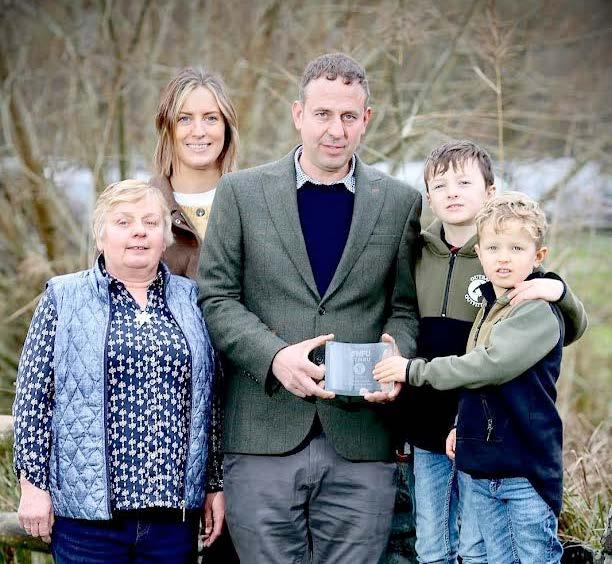
with this award today. The quality of their stock and his enthusiasm to continue to develop the business was second to none. I have no doubt that Owen and family are a well-deserved winner of this award.”
Mike Thomas, NFU Mutual Senior Agent and NFU Cymru Group
Secretary, who was part of the judging panel, said: “It was clear to see the enthusiasm Owen has for the quality of his stock as soon as we met with him. He was passionate about farming as a whole but also ensuring the business remains profitable.”




An impactful NFu Cymru display at the Royal Welsh Winter Fair has encapsulated rural Wales’ opposition to uK government’s inheritance tax reforms ahead of the Autumn Budget.
More than 400 Winter Fair-goers each played their part in the visual spectacle on the second day of the Royal Welsh Winter Fair in Llanelwedd on Tuesday 25th November. The timely mosaic message - spelling out ‘NO IHT’ – was delivered just a day before the Chancellor’s Autumn Budget announcement and signalled the strength of feeling amongst rural communities against the UK
Government’s planned changes to inheritance tax reliefs.
The Winter Fair display is the latest activity in a long line of campaigning activity conducted by the union since the shock changes to Agricultural Property Relief (APR) and Business Property Relief (BPR) announced last year. On the eve of the 2025 Autumn Budget statement, NFU Cymru is calling on the UK Government to follow the recommendations of the cross-party House of Commons’ Welsh Affairs Committee1, which is seeking a pause in the implementation of the policy to enable a full impact assessment of the effect on Welsh
farming.
Speaking after the display, NFU Cymru President Aled Jones said: “Today’s campaign activity is an unequivocal statement from rural Wales – ‘The UK Government’s reforms to inheritance tax reliefs are going to be devastating for Welsh family farming businesses and the prosperity of our rural areas’. It is over a year since the Chancellor’s original announcement and we are still hearing of families whose lives will be turned upside down by these changes. At a time when families will be mourning the loss of a loved one, they will also be weighing up how to dismantle their
farming business in order to pay a tax bill they were told they’d never have to pay.
“The biggest frustration for so many farmers is that the UK Treasury has been served a raft of evidence – from tax experts, the wider supply chain and cross-party MP committees – that the consequences of these changes will be catastrophic. The idea that UK Government can continue with these changes despite such a resounding volume of concern and worry is extremely troubling. We must see a pause to the family farm tax until those impacts are properly accounted for.”



s uzu KI once again achieves good recognition from What Car? magazine, this time the brand was awarded Runner- u p in the Best u sed Car s cheme category in their recent u sed Car of t he year Awards issue.
Judges were looking for various leading aspects of a manufacturer’s scheme to consider it as overall winner and Suzuki finished in second place by ‘the narrowest of margins’; these aspects included a long period of warranty cover which
is up to 10 years / 100,000 miles for Suzuki cars, a full and comprehensive mechanical check, comprehensive breakdown cover as well as good hybrid and EV cover.
Suzuki certainly ticked all the boxes with its latest Approved Used Car Programme which is now also available for customers buying a used car from one of its 24 franchised dealers in the Republic of Ireland.
All customers choosing a Suzuki Approved Used Car that’s reached the end of

its standard manufacturer warranty can benefit from oneyear additional Suzuki warranty cover. For all Suzuki car owners Suzuki offers up to 10 years’ warranty free of charge, activated by the customer once their new car reaches the end of its manufacturer warranty period of three years / 60,000 miles and has its annual service completed within the Suzuki Dealer network. The warranty stays in place until the next qualifying service and is simply renewed again up to a maximum vehicle age
of up to 10 years / 100,000 miles. Major components are covered; and should a customer decide to sell their car between services and within the 10-year qualifying period, the warranty can simply be transferred to the next owner – again free of charge.
The recently launched e Vitara model also has up to 10 years EV battery warranty included with eight years manufacturer followed by a further two which are service activated.
tO FuRtHER support customers looking at purchasing their new Hybrid swift this year, suzuki gB PLC is very pleased to announce some enhanced finance offers which are available immediately and until the end of December 2025.
Across the Swift range, Suzuki is currently offering a 0% APR PCP (Personal Contract Purchase) arrangement over 25 months with a minimum 20% deposit and now, to offer customers greater choice and flexibility, have introduced a 2.9% APR PCP arrangement payable over 49 months with £500 Finance Deposit Contribution (FDA).
Taking the highly specified 1.2-litre Hybrid Motion with manual transmission as an example and with the latest 2.9% PCP agreement chosen, an initial deposit of just £1,338 is all that’s needed followed by 48 monthly payments of £229; this is followed by the usual final payment for customers wishing to keep their car at the

end of the agreement.
For customers looking at a Personal Contract Hire (PCH) option for a similar Swift Motion model, payments remain the same at £229 per month, payable over 36 months with an
initial advance rental payment of £2,060 required.
Swift offers all the tech you need as standard and is renowned for its low cost of ownership, low fuel consumption and low CO2
emissions. Swift Motion and Ultra models with manual transmission achieve 64.2mpg on the Combined consumption cycle and CO2 emissions are just 99g/km (both tested under WLTP regulation).



1.2

























At EV Wales, electric vehicles aren't just part of our business – they are our passion. As dedicated EV specialists, we provide a level of in-depth expertise in sales, service, and repair that goes beyond what a main dealer can offer. Are you looking to buy your first EV and need honest, real-world advice from people who drive them every day? Or are you an owner searching for expert, economical repair solutions that make sense? We are your trusted local partners. We believe in making electric driving simple, affordable, and exciting for everyone. For a better way to buy and maintain your EV, speak to the experts who live and breathe them.








NIssAN announces today that its all-new, British-built LEAF electric vehicle will qualify for the uK government’s £3,750 Electric Car grant.
With a range of up to 386 miles on a single charge, the new LEAF 75kWh model will be priced from £32,249, with production scheduled to start in Sunderland in December. First customer deliveries are planned for February.
James Taylor, Nissan GB Managing Director, said: ”We’re absolutely delighted to be able to confirm LEAF’s pricing at £32,249 including the electric car grant, which will deliver an accessible route to EV ownership for our customers.
“This is fantastic news for people looking to switch to fully electric motoring as they now have the reassurance that comes from a car with up to 386-miles of range, all the tech they could want and the real-world benefits that come from Nissan’s 15 years of EV expertise. Best of all, it’s proudly built right here in the UK!”
Transport Secretary, Heidi Alexander said: “Nissan helped pioneer early EV ownership through the original Leaf, so it is great to see them join our drive to
make going electric cheaper and more accessible for families.
“Alongside saving drivers thousands this news is also a big boost for manufacturing in the North Eastsupporting thousands of jobs in the region whilst backing the industry to grow and deliver our Plan for Change.”
With a range of up to 386-miles (WLTP) and a suite of advanced features including Google Built-in, dimming panoramic roof with LEAF detailing, 3D tail light design and flush-mounted door handles, the new LEAF will be available in four trim levels: Engage, Engage+, Advance and Evolve.
A second version with a 52kWh battery will also be available, with a range of up to 271 miles*. Pricing of this model to be announced at a later date.
Standard equipment for the Nissan LEAF 75kWh includes:
ENGAGE (from £32,249 including Electric Car Grant)
• Heat Pump
• Propilot with Navi-link
• 18” alloy wheels
• AC Charger: 11kW charger
• Dual 12.3” Display Screens
ENGAGE+ (from £33,149 including Electric Car Grant)
In addition to Engage:
• Google Automotive Services with Google Maps, Google Assistant, Google Play Store
• Heated front seats, heated steering wheel
• 14.3” Combimeter Screen
• 14.3” Multimedia display screen
• 15W Wireless Phone Charger
ADVANCE (from £34,249 including Electric Car Grant)
IN ADDItION tO ENgAgE+:
• Dimming panoramic roof
• Head-up display
• Electric powered tailgate
• Full-length front signature lamp with illuminated Nissan logo
• 3D rear lamps
• Privacy glass
• Synthetic leather upholstery with fabric inserts
• Upholstery: dark (black) or light with purple accents
EVOLVE (from £36,249 including Electric Car Grant)
IN ADDItION tO ADVANCE:
• BOSE nine-speaker audio system
• V2L connector 19” alloy wheels (235/45)
• I-Key+: Approach unlock all direction + boot opener
• All synthetic leather seats
• Power 8-way; slide/recline/height/tilt front seats
• Driver’s massage seat
Since its debut in 2010, the Nissan LEAF has sold close to 700,000 units worldwide, earning its place in history as the world’s first mass-market electric vehicle. The all-new third generation model marks the start of a new chapter for this famous nameplate, having been re-designed and re-engineered to meet the needs of modern EV customers, while remaining true to its innovative roots. Proudly built in Britain, at Nissan’s world-class EV manufacturing facility in Sunderland, it boasts a sharp new look, integrated technology and a host of new driver assistance features.
As Nissan’s most aerodynamic production car to date, the car offers enhanced charging speeds and a suite of technologies to make driving easier and EV ownership more rewarding, including Google Built-In, which gives access to Google Maps without a phone, plus app and game downloads from Google Play.
The 75kWh battery option gives drivers confidence thanks to real-world autonomy that’s amongst the best in the segment. The 75kWh version features a range of up to 269 miles at 70 mph on the highway and an energy consumption as low as 4.5 miles/kWh, ensuring longer journeys can be accomplished with fewer charging stops. When you do need to plug in, Nissan LEAF supports 150kW DC fast charging, recovering up to 273 miles in just 30 minutes.
At the heart of the Nissan LEAF is a refined electric motor delivering clean and responsive levels of performance: 160kw (215hp) of power and 355Nm of torque propel the car from 0 to 62mph in 7.6 seconds (Sport Mode / 75kWh battery). In short, the all-new LEAF ensures effortless driving with maximum efficiency.
The LEAF is already an award-winner too. Earlier this year, it was named The Sun newspaper’s Car of the Year in the Motor Awards 2025, organised by News UK.


MORE than 1,399 firms across Mid and West Wales have received over £460 million to help them start up and scale up, as the Development Bank of Wales confirms it has now passed a landmark £1 billion in investment since its creation in 2017.
Supported by the Welsh Government, the Development Bank says £323.4 million has been invested directly into Mid and West Wales businesses, unlocking a further £143.2 million in private sector cofinance. The bank’s total investment programme has supported 51,089 jobs and generated £5.8 billion in economic value across Wales.
Since 2017, a total of 4,699 companies throughout Wales have benefited from 5,184 investments. This includes £89 million for 292 innovative tech ventures and £275 million for Welsh property developers, helping to build 2,302 new
homes.
Pembrokeshire is among the counties that have seen direct, tangible benefits. Rum producer Barti received a £200,000 investment from the Development Bank and a £27,000 loan from the Pembrokeshire Lottery to expand production. The funding was provided through the £500 million Wales Flexible Investment Fund.
Narberth-based Wild Lakes used a £40,700 Green Business Loan to move to solar power via the Welsh Government-backed scheme, helping the business reduce its carbon footprint.
Barti Director Jonathan Williams said: “This is the golden quarter for our industry, so it was important that we had the working capital required to purchase the stock needed to fulfil the increasing demand from Tesco and Co-op customers. We are also excited to be developing new products as well as exploring export
opportunities for our product range.”
Mark Harris, co-founder at Wild Lakes, said: “As an outdoor business in one of Wales’ most impressive natural environments, our environmental impact is at the forefront of everything we do. The support we had from the Development Bank meant we were able to switch from older forms of power to new, cleaner energy, and gives us the infrastructure we need to make similar improvements in future.”
Welsh Government Cabinet Secretary for Economy, Energy and Planning, Rebecca Evans, said: “If companies are to grow, it’s vital they can access finance. Since we set up the Development Bank in 2017, it has acted as a social impact investor, making sure its investments support our priorities, from encouraging entrepreneurship to building a greener economy. Reaching
the £1 billion milestone makes me proud of the Bank’s role in driving economic development.”
First Minister Eluned Morgan said the milestone demonstrated the strength of Welsh businesses. She added: “Wales is a great place to set up a business or invest in projects and this is part of the message I shall be sharing with delegates from across the globe at the Wales International Summit in December.”
Since its establishment, the bank has provided £428 million in growth funding to 3,675 businesses and supported Welsh entrepreneurship with £61 million for 787 start-ups. There have also been 341 succession deals worth £138 million, helping to keep longstanding businesses in Wales. Thirty successful exits have generated a further £31 million.
Chair of the Development Bank, Hon. Group Captain Sally Bridgeland FIA, said: “Our investments have supported thousands of businesses at every stage of their growth journey. These results demonstrate the power of sustainable capital to deliver long-term economic value, bringing ambitions to life and delivering benefits for people and communities across Wales.”
Chief Executive Giles Thorley added: “This achievement is a testament to the hard work and ambition of the businesses and entrepreneurs we’ve supported and to the dedication of my colleagues. By leveraging £636 million in private co-investment and deploying recyclable funds, we’re building a legacy of growth and resilience for future generations.”
• 5,184 investments across 4,699 businesses
• Average deal size: £190,000
• Funding mix: £564m in debt; £138m in equity; £298m in property
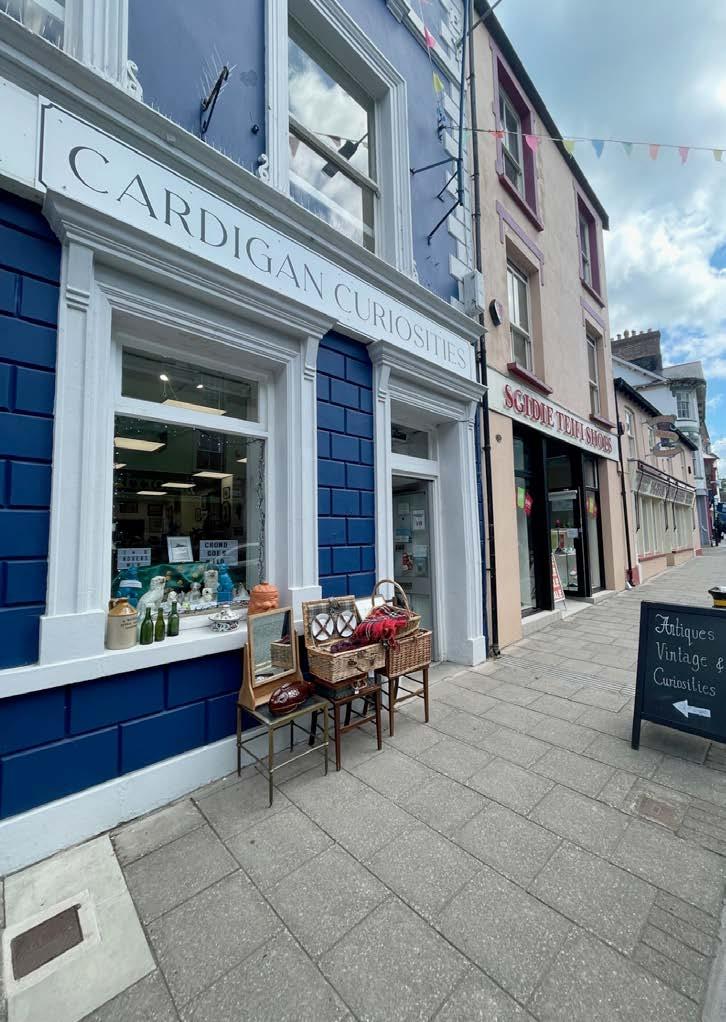
CARDIgAN CuRIOsItIEs is celebrating one year of trading on Cardigan High street – and the milestone comes with two new acquisitions by the Cardigan Castle Collection.
The shop, based in the former Barclays Bank building, opened in November 2024 offering antiques, vintage items and curiosities “with a modern twist.” Shortly after opening, the Castle purchased a slate clock by Thomas and Sons of Cardigan. In an unexpected twist discovered by local historian Glen Johnson BEM, Thomas and Sons were the original jewellers who once worked from the very same building now occupied by Cardigan Curiosities.
The clock is now on display in the Bluebird Room at Castle Green House.
Almost exactly a year on, the Castle has added two more unique pieces of local heritage from the business.
The first is a Cardigan sundial, very similar to the one believed to have

Street comes to a close, owners Otto and Faith say the shop has exceeded all expectations.
“With a visit from BBC Antiques Road Trip, winning a St David’s Day window competition and meeting lots of antiques lovers, it’s been a really exciting year. We’re committed to keeping prices accessible and stock constantly changing so that every visit feels like a new treasure hunt.
“What has meant the most is the support from local people during the quieter months. Hearing customers’ stories and memories connected to items in the shop has been wonderful.”
They also reflected on the wider importance of Cardigan’s independent sector:
opportunities.
“Otto has built a strong and reliable clearance team,” Faith said. “Knowing that local people with young families can stay in the area and make a living is incredibly rewarding. It’s a core value we’ll continue to build on next year.”
Cardigan Curiosities is based at 32A Cardigan High Street and will remain open throughout the festive period for Christmas shoppers.
stood in the gardens of Castle Green House. The item was spotted on Facebook by Glen Johnson, prompting the Castle to acquire the piece with the aim of creating a replica for public display in the coming months.
A Castle spokesperson said: “The Victorian sundial is in remarkable condition but holds some secrets we hope to uncover. The inscription is badly worn and has yet to be deciphered. It may reveal whether it was produced at the town’s former foundry, or if it belonged to one of Cardigan’s great houses. It’s an exciting mystery we’re keen to explore.”
The second acquisition is a pair of original 1800s stud cards –“stallion calling cards” printed at J.C. Roberts, Cardigan Observer office, and traditionally handed out at Barley Saturday to promote bloodlines of well-known local stallions. These cards will feature in a new exhibition at the Castle in spring 2026, celebrating the heritage of Barley Saturday.
As their first year on the High
“While the parking situation continues to make headlines, it’s vital to remember what makes Cardigan special: a thriving mix of independent, family-run shops and new businesses, all while retaining the town’s historic character. It’s something no other local High Street can match. If you don’t use it, you’ll lose it – and that’s going to be our focus for 2026.”
Next year will also bring new beginnings, with the couple expecting their first child in January – and planning a second retail site at their home in Rhydlewis, building on the success of their summer “open barn” antique and furniture events.
Cardigan Curiosities’ houseclearance arm has also grown significantly. Otto carries out all types of clearance work, with a particular focus on bereavement clearances, offering support to families at difficult times while maintaining fair pricing.
The increased demand from local households has also allowed the business to provide employment




HEALtHCARE support workers across Wales are set to receive a long-awaited wage rise and thousands of pounds in back pay after NHs Wales conceded they had been underpaid for years, unison Cymru has announced.
More than six thousand staff on the lowest pay band of the NHS Agenda for Change scale will now be moved up to band three and compensated for clinical duties they have routinely carried out without the correct pay.
The agreement, secured by Unison Cymru with NHS employers and the Welsh Government, formally recognises that support workers have been consistently performing tasks beyond their job descriptions. These include duties such as monitoring blood, carrying out ECG tests and removing cannulas –responsibilities the union has long argued should attract band three pay.
Unison encouraged the predominantly female, low-paid workforce to lodge collective
grievances with health boards, documenting the higher-grade work they had undertaken. The union pushed for a Wales-wide solution after years of disputes in individual boards.
Support workers in Swansea Bay added major pressure by voting overwhelmingly for strike action, leading to a separate re-banding and back pay victory earlier this year.
Betsi Cadwaladr University Health Board support worker
Evie Fox-Byrne said: “Our work is vital in supporting patients and helping them recover.
Health boards shouldn’t be taking advantage of staff to save a few quid. This is money we were owed, going back years. It will make such a difference to me and my family, especially my little daughter.”
Caitlyn Utting, a support worker at Cardiff and Vale University Health Board, said: “It felt energising to know that healthcare assistants right across Wales were standing together against an employer that wasn’t paying us correctly. Unison backed us, we won — and it feels great.”
Unison Cymru head of health Tanya Bull said: “Thousands of low-paid healthcare support workers will savour this moment. They stood up for their right to be paid at the appropriate level for the job they’ve been doing for years. They’ve taken on their health boards and won. This is a triumph for people power.”
A national re-banding and back-pay agreement was formally signed today between NHS Wales employers, the Welsh Government, Unison and other trade unions.
NHS guidance states that band two healthcare support workers should only provide personal care, such as bathing and feeding patients. However, workers across Wales have for years undertaken clinical tasks normally associated with band three roles.
Support workers in Swansea Bay secured re-banding and back pay after 99% of Unison members who voted backed strike action.

CANCER waiting times in Wales remain at deeply concerning levels, with Pembrokeshire patients among those facing long delays for diagnosis and treatment, new figures show.
The latest NHS Wales cancer waiting times data, published this week, reveals that almost nine hundred people across Wales waited too long to begin treatment in September. Just 59 per cent of patients started their first treatment within the 62-day target, far below the Welsh Government’s 75 per cent standard.
Hywel Dda University Health Board, which covers Pembrokeshire, has continued to struggle with diagnostic capacity, specialist staffing shortages and delays across a number of cancer pathways. Patients in Pembrokeshire often begin their journey at Withybush Hospital before being sent to Glangwili, Prince Philip, Singleton or Morriston for further tests or treatment, adding hours of travel to an already stressful process.
Residents who contacted the Herald this week described early-morning departures to Swansea, long waits in busy clinics, and returning home late in the evening after treatment or assessment. Rural geography, limited public transport and pressure on ambulance services continue to add strain to the system.
Responding to the figures, Hannah Buckingham, Senior External Affairs Adviser for Wales at Macmillan Cancer

Support, said the slight improvement compared with recent years should not distract from the wider picture.
She said: “Timely cancer diagnosis and treatment are essential, yet thousands of people in Wales continue to face long waits and delays. This is unacceptable, but it doesn’t have to be this way.
“This month’s slight improvement is welcome, but the overall picture remains deeply concerning, particularly as we head into winter. With Senedd elections approaching, the next Welsh Government has a vital opportunity to act and make cancer a priority. People living with cancer in Wales deserve
better than long waits, and the next Government must deliver it.”
Across Wales in September, 1,280 out of 2,178 patients began treatment within the target time. Performance across health boards ranged from 53 per cent to 65 per cent. Hywel Dda has typically sat in the lower to middle range of national performance throughout this year, facing delays in urological, upper GI and gynaecological cancer pathways, alongside pressure in pathology and radiology.
The data shows that waiting times vary sharply depending on the type of cancer. Only 37 per cent of people with urological cancers and 39 per cent of
women and people assigned female at birth with gynaecological cancers began treatment within 62 days. In contrast, 87 per cent of patients with skin cancer met the target.
The 62-day cancer target was introduced in December 2020 and has never been met. Health boards have cited recruitment challenges, winter pressures, high diagnostic demand and the continuing impact of the pandemic as consistent obstacles.
Macmillan’s wider analysis also highlights that people living in the most deprived parts of Wales remain over one and a half times more likely to die from cancer than those in the least deprived areas, and the gap is now wider than it was twenty years ago.
Local political representatives have repeatedly raised concerns about access to diagnostics and cancer care for rural communities. Pembrokeshire MSs have urged further investment in early-diagnosis services, while GPs across the county say access to MRI, CT and endoscopy capacity remains one of the biggest local challenges.
Macmillan says whoever forms the next Welsh Government must prioritise a new cancer strategy, strengthen the specialist workforce, improve the use of NHS data and ensure that personalised support is available for every patient.
Anyone affected by cancer can contact Macmillan for information, support or advice on 0808 808 00 00.

HyWEL DDA university Health Board will next week consider whether to extend a temporary change to the adult community mental health referral pathway in Ceredigion, with a decision due at its public Board meeting on thursday (Nov 27).
The temporary pathway, introduced in March, directs adults with non-urgent mental health needs to the NHS 111 Wales option 2 service instead of the
community mental health team. The pilot was brought in to reduce waiting times and relieve pressure on local community mental health teams, which have faced long-standing staffing and recruitment challenges.
Under the arrangement, GPs in Ceredigion refer patients with routine needs to 111, while those with the highest clinical risk continue to be referred directly to the community mental health team. GPs also have
access to a professional 111 line if they are concerned a patient is unable to engage with the service themselves.
The health board says early feedback has been “mostly positive”, with reported improvements including shorter waiting times, quicker access to specialist advice, and better integration between primary care and mental health services.
Andrew Carruthers, Chief Operating Officer at Hywel Dda, said: “We want to ensure our mental health services are accessible, timely and sustainable. While the temporary change was introduced in response to staffing pressures, the feedback so far has been encouraging.
“People are receiving expert advice and support more quickly, and those with complex mental health needs are being seen sooner by our specialist teams. For these reasons, we are seeking approval from the Board to carry out a further period of engagement before making any long-term decisions.”
If supported by the Board, the
temporary pathway in Ceredigion would continue while a nine-week engagement period begins in early December. The engagement would seek views from service users, carers, GPs and stakeholders across all three counties, including Pembrokeshire, where any permanent extension could have a significant impact on local access routes.
Hywel Dda says the review will assess whether the new system could ease pressure on teams in Carmarthenshire and Pembrokeshire, but also what risks or service gaps could emerge if more patients are routed through NHS 111 instead of local community teams.
The full Board paper is available to read on the health board’s website, and the meeting will be broadcast live from 9:30am on Thursday (Nov 27) on the Hywel Dda YouTube channel.
If you’d like a short Facebook share version, or a Pembrokeshire-focused sidebar for Withybush and local MH services, I can prepare those too.


NIgEL FARAgE is facing one of the most serious crises of his political career after more than twenty former pupils and a former teacher at Dulwich College accused him of sustained racist behaviour during his school years, according to an extensive investigation published by the guardian.
The allegations explode into the public domain on the very day Farage arrives in Wales for a high-profile Reform UK rally at Venue Cymru in Llandudno, where he is due to address supporters from 6:00pm. What was intended to be a set-piece moment in the party’s Welsh campaign is now overshadowed by the growing controversy. Party insiders told the Herald that the timing is “deeply unhelpful”, with broadcasters expected to challenge Farage directly during his visit.
Dulwich College, one of Britain’s most elite public schools, charges more than £25,000 a year in fees and has a long history of sending pupils into the military, politics, journalism and the City. Founded in 1619, the south London institution is known for its strict traditions, academic reputation and its prominent Combined Cadet Force. It was within this privileged environment that former pupils say Farage expressed what one
described as “openly extremist” views.
NAMED WItNEssEs
DEsCRIBE HItLER REFERENCEs AND RACIst sLuRs
Several of Farage’s contemporaries spoke to The Guardian on the record, including:
• Peter Ettedgui, who says he was repeatedly targeted with anti-Semitic abuse
• Jean-Pierre Lihou, who recalled Farage saying “Hitler was right” and singing racist lyrics
• Andy Field, a former prefect, who said Farage’s comments were “jawdropping”
• Martin Rosell, who said Farage made repeated comments to Jewish pupils
• Bob Jope, a former teacher, who recalled Farage allegedly saying “shut up, you Jew” to Ettedgui
Their testimonies, gathered over several months, are unusually detailed and consistent.
One former pupil alleged that Farage would chant far-right slogans and use slurs aimed at Jewish, Black and Asian classmates. Another claimed he witnessed Farage sing lines
such as “Gas ’em all… into the chambers they crawl” — lyrics he said were adapted from a George Formby melody.
Jean-Pierre Lihou said Farage would call Ettedgui “Jude” — the German term for “Jew” used in the 1930s — in a “menacing” way. Lihou also claimed Farage said “gas ’em” and “Hitler was right” in front of other students
A number of former cadets told the newspaper that Farage would mock minority pupils during Combined Cadet Force activities, sing racist songs on CCF coaches and chant at Jewish pupils.
One former student said: “He was proud to be a racist at school. That was his shtick.”
Another said: “His behaviour towards cadets of ethnic background was no better than to those of Jewish religion. I remember the word ‘yid’ being shouted, sometimes several times in a row.”
A further pupil added: “My overriding memory is just nasty little s**t and a racist.”
tEACHER sAys HE REMOVED FARAgE FROM LEssON AFtER ALLEgED sLuR
Former teacher Bob Jope told The Guardian he remembered an incident early in his career in which Farage allegedly used
an anti-Semitic slur towards Ettedgui. Jope said he ordered Farage out of the classroom immediately, saying he was too inexperienced at the time to handle such a confrontation more formally.
Farage has rejected every claim, calling them “false”, “politically motivated” and “a smear campaign”. He has insisted he has never expressed racist views and said his school years are being misrepresented by political opponents.
Reform UK has not issued any separate statement.
The scale of the allegations, the number of named witnesses, and the level of detail published are unusual in modern political reporting. With Farage playing a central role in national debates, political commentators predict that the story will dominate the news cycle this week.
The Guardian’s investigation describes a pattern that, if proven, would represent some of the most serious allegations ever levelled at a major UK political figure.
Political observers say the allegations could have a particular impact in Wales, where Reform UK has been trying to convert high polling numbers into solid electoral ground. While Farage retains a loyal core following, Welsh seats — especially in areas such as Pembrokeshire, Carmarthenshire and the Valleys — are often decided by floating voters who are less tolerant of personal controversy. Senior figures in Welsh politics told the Herald that the sheer volume and seriousness of the allegations may harden views among moderate voters and damage Reform UK’s attempts to present itself as a credible, mainstream force ahead of the next general election.
Dulwich College declined to comment.
PEMBROKEsHIRE and Ceredigion are set to receive a lower-than-average funding settlement from the Welsh government, placing them both at 13th out of the 22 local authorities.
While council tax makes up a proportion of the council’s annual revenue, a crucial area of funding is the Aggregate External Finance (AEF) rate from Welsh Government.
Welsh Government Cabinet Secretary for Housing and Local Government, Jayne Bryant, has announced that local authorities will next year receive £6.4bn from the Welsh Government to spend on delivering key services.
The investment, which comes from the Revenue Support Grant and nondomestic rates, means that Welsh councils will receive an average 2.7 per cent funding increase, with a fully funded floor will ensure that no council receives less than a 2.3 per cent increase.
In addition to the core settlement, there will also be grants for local government amounting to over £1.3bn for revenue purposes and over £1.08bn for capital investment.
Pembrokeshire is to receive a 2.3 per cent increase on its settlement, a total of £244,318,000, amounting to an extra £5,493,000, placing it at 13th

Government – amounting to just over £8.1m – against a predicted two per cent.
to local government, and we fully recognise the challenges that they face.
of the 22 local authorities in Wales. Neighbouring Ceredigion, also jointly on 13th place, receives a 2.3 per cent increase, some £3,388,000 for a total of £150,670,000.
2024 saw Pembrokeshire receive a higher-than-expected settlement increase of 3.6 per cent from Welsh
Of the 22 authorities in Wales, in 2024 Pembrokeshire ranked 15th in its rate of settlement, neighbouring Ceredigion also receiving 3.6 per cent, to rank 17th, and Carmarthenshire receiving 4.1 per cent, ranking 12th.
Of the latest settlement, Jayne Bryant said: “We have been listening
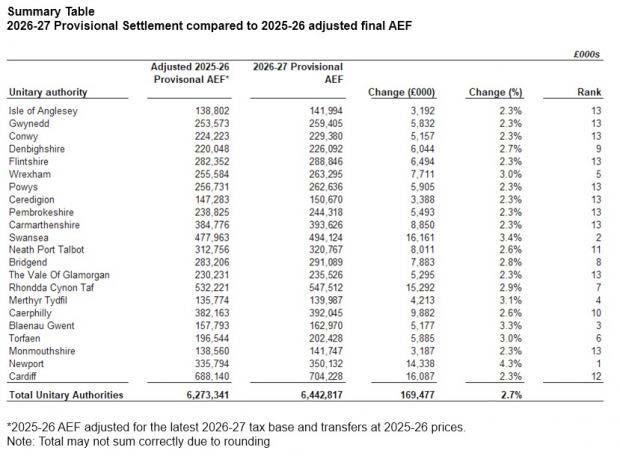
“This provisional settlement is the beginning of the budget process, our priority has been to provide councils with the stability they need to set budgets which protect and deliver core frontline services.
“We will continue to work closely with the Welsh Local Government Association and council leaders to see where we can provide additional flexibility when managing their budgets.
“We are committed to working with all parties to develop a budget which ensures our public services can continue to operate effectively and which can be passed by the Senedd in the final months of this term.”
The final budget will be published in January following consultation with local authorities and stakeholders.
Pembrokeshire Cabinet Member for Corporate Finance Efficiencies Cllr Alistair Cameron said: “This is very disappointing for Pembrokeshire as it is well below the current UK inflation rate of 3.6 percent.
“It also fails to take account of the needs of providing services in a rural authority and the need to provide social services for an ageing population in the county. I will be appealing against this provisional settlement.
“I see that some of the urban councils such as Newport and Swansea have had a more generous provisional settlement. We therefore need to appeal for a better and more realistic settlement which takes account of our demographics and geography.”
Ceredigion council has also been contacted for its reaction to the announcement.

W ITH ANDREW LYE
he Welsh Liberal Democrats have called on the uK government to take urgent action to secure the future of what remains of Wales’s steel industry, warning that continued inaction is putting thousands more jobs at risk.
Following his visit to Port Talbot with Lib Dem Deputy Leader Daisy Cooper, Welsh Lib Dem MP David Chadwick said the Government’s delays on energy support, trade talks, and investment were “holding back one of Wales’s most important industries” at a time when global competitors are powering ahead.
The sector currently pays around 40% more for electricity than German and French steel producers. Although Ministers have promised to increase Network Charging Compensation from 60% to 90%, the payments will not arrive until 2027, costing UK producers an estimated £14.5m in 2026.
Port Talbot is due to start producing steel again in 2027, but with tariffs being introduced by the US and now likely by the EU, there are deep concerns for the future, even with the transition to electric-arcfurnace production.
The threat of tariffs also hangs over Wales’s other remaining steel sites.
The Welsh Liberal Democrats said the crisis shows why the UK must rebuild a closer trading relationship with Europe, warning that “Labour’s silence on the single market and customs cooperation is costing Welsh jobs.”
The party has set out a 4 Point Plan to protect and rebuild the industry:
1) Cut energy costs now, not in 2027 - Bring forward the rise in Network Charging Compensation immediately so Welsh producers pay fair, competitive prices for power. Every extra year of delay pushes more investment
and jobs overseas.
2) Rebuild a strong trading partnership with Europe to protect Welsh exports - Strike a steel trade pact with the EU and US that preserves tariff-free access and maintains existing quota allowances. The Liberal Democrats have repeatedly called for a new customsunion-style arrangement with the EU. Without it, industry figures warn Welsh exports could fall by around 20 per cent, devastating remaining Welsh steel producers and their supply chains.
3) Use public investment to back British-made steel - Guarantee that major infrastructure, energy, and defence projects prioritise UK steel, keeping taxpayer money in the domestic economy and supporting the transition to green industry in Wales.
4) Fix Britain’s broken industrial energy system for good - Commit to a longterm plan to bring industrial electricity prices in line with Europe by decoupling clean power from volatile gas prices and investing in a major expansion of renewable generation in South Wales, including offshore wind and grid upgrades around Port Talbot. Investing in floating offshore wind off the South Wales coast will provide jobs in Pembrokeshire.
David Chadwick MP said:
“We also cannot save Welsh steel while cutting ourselves off from our biggest market. The Liberal Democrats are clear: we need a closer relationship with the EU, including a new customs arrangement, to keep trade flowing and protect jobs. Signing a steel deal with the EU must happen now.
“This is Labour’s chance to prove it will back Welsh jobs with real action, not warm words. Our message is simple: cut costs now, secure trade with Europe, and invest in a green Welshsteel future.”
If you have any issues or comments, please contact me at

A MAJOR political row has erupted after uK Defence Minister Al Carns called on Nigel Farage to launch a “forensic, fully independent investigation” into Reform uK’s internal structures following the conviction of the party’s former Welsh leader for taking bribes linked to proRussian propaganda.
Nathan Gill, who previously led Reform in Wales and was an MEP for UKIP, was sentenced on Friday to 10 and a half years in prison after admitting eight counts of bribery. Counterterrorism police uncovered payments made to Gill in return for delivering statements in the European Parliament that promoted Kremlin-aligned media operating in Ukraine.
Carns, a former Royal Marine and now Minister of State for the Armed Forces, said the case “should send shockwaves right to the top” of Reform UK and demanded Farage “leave no stone unturned” in determining whether any other pro-Russian influence has reached the party’s donors, representatives or membership.
LABOuR: PuBLIC NEED REAssuRANCE
Welsh Labour said the seriousness of Gill’s actions required a response “far beyond internal conversations”, arguing that only an independent inquiry could reassure the public that there are no further undisclosed links between the Kremlin and Reform personnel.
Carns added: “There is nothing less patriotic than betraying Britain in support
of a foreign power. Nigel Farage must urgently initiate an independent investigation into every inch of Reform UK’s structures to guarantee any remaining pro-Russian links are rooted out.”
Labour has also highlighted Farage’s own past remarks about Russia, including comments suggesting that EU and NATO expansion helped “provoke” Moscow’s invasion of Ukraine. In 2014, Farage named Vladimir Putin as the world leader he most admired, calling him “brilliant”. These statements, Labour argues, raise further questions about the political environment in which Gill operated.
REFORM: FARAgE “stuNNED” By CONVICtION
Reform UK has not issued a formal response to Carns’ request, but Farage said earlier this year he had been “stunned” to learn of Gill’s criminal conduct. The party has not been accused of any wrongdoing, and there is no suggestion that Farage or other senior figures had any knowledge of Gill’s activities.
Gill pleaded guilty in September after originally indicating he would contest the charges. Police investigators found that he had accepted covert payments while serving as an MEP, promoting positions sympathetic to Russian statebacked broadcasters operating in Ukraine.
HEIgHtENED tENsIONs WItH RussIA
The row comes during a
week of heightened national security concerns. Earlier this week, the Defence Secretary told Parliament that a Russian intelligence-gathering ship close to UK waters had allegedly used laser interference against RAF pilots monitoring its movements. Carns said the incident was a reminder that the UK must remain “vigilant against hostile state threats”, including attempts to influence domestic politics. Nathan Gill served as leader of the Brexit Party/Reform UK in Wales and was a close ally of Farage during the Brexit Party’s rapid rise. His conviction is one of the most serious bribery cases involving a former UK MEP.
There is currently no evidence that any other Reform UK members have been implicated. The party continues to grow in support, with Farage positioning it as a patriotic, antiestablishment alternative to traditional parties.
Reform UK has rejected suggestions that Nathan Gill’s actions reflect wider issues within the party. Zia Yusuf, the party’s head of policy, told Sky News that Gill was “ancient history” and insisted it would be “unreasonable” to link his crimes to current Reform figures. “What he did was treasonous… he deserves the sentence he’s gotten,” Mr Yusuf said. “But I’ve never met him. I’d never heard of him until I saw his name in the newspapers. It is unreasonable to besmirch everybody else at Reform, the millions of people who support Nigel Farage and our party.”
The Pembrokeshire Herald has contacted Reform UK for further comment.
tHE WELsH LIBERAL DEMOCRAts have outlined their priorities ahead of next week’s uK Budget, calling for what they describe as a “fairer settlement” for Wales funded through higher taxation on major banks, multinational tech firms, online gambling operators and oil and gas producers.
Westminster Spokesperson David Chadwick MP said the focus must be on delivering practical support for households and small businesses, warning that many Welsh communities continue to feel the effects of stubborn inflation, high energy costs and low investment.
Emergency package for households and hospitality
The Party is proposing a 17-month “Households and High Streets” package designed to cut energy bills and support local pubs, cafés and restaurants. Under the plan, an energy levy would be removed from bills and VAT for hospitality would be reduced, which the Lib Dems claim would put around £270 back into the pocket of a typical household.
Hospitality and tourism account for roughly 12% of Wales’ economy, and industry groups have warned throughout 2024–25 that rising costs and weaker demand have pushed many businesses close to the edge. The Welsh Liberal Democrats argue that a temporary VAT cut would provide immediate relief and protect jobs, particularly in rural and coastal areas where local pubs and cafés form part of the economic backbone.
The package would, the Party says, be paid for through a time-limited windfall tax on the big banks—a sector that has reported significant profits over the past two years as interest rates have remained high.
Support for rural Wales and energy

Other measures the Party is calling for include:
• Scrapping the so-called Family Farms Tax, amid concerns that proposed UKwide changes to Agricultural Property Relief could disproportionately impact Welsh family farms already facing volatility in the supply chain and sharply rising costs.
• Investment in large-scale hydro and tidal power, including long-discussed projects such as the Swansea Bay Tidal Lagoon. Several governments have promised progress on tidal schemes over the last decade, but none have yet been delivered. The Lib Dems say a firm commitment could
create skilled jobs and help secure Wales’ renewable energy future.
• Reform of the Barnett Formula, devolution of the Crown Estate in Wales and delivery of long-promised HS2 consequentials—issues that have been the subject of cross-party debate for years, with the Senedd and Welsh Government maintaining that Wales has been underfunded relative to Scotland and Northern Ireland.
• Fair access to pensions for around 4,000 Welsh miners in the British Coal Staff Superannuation Scheme (BCSSS).
• Scrapping the two-child benefit cap, which anti-poverty organisations say has contributed to rising levels of child poverty in several parts of Wales.
• Greater funding for social care, an area under severe pressure in all Welsh local authorities, including Pembrokeshire.
• How the plans would be funded
To pay for the package, the Welsh Liberal Democrats want the Chancellor to:
• Reverse the Conservatives’ recent tax cuts for major banks.
• Increase the Digital Services Tax paid by large multinational tech corporations.
• Strengthen the windfall tax on excess oil and gas profits.
• Raise Remote Gaming Duty on the largest online gambling operators, whose profits have grown during the cost-of-living crisis.
Chadwick: “Time for the Government to show Wales matters”
David Chadwick MP said: “This Labour Government has presided over a series of decisions that have harmed Welsh communities. This Budget is an opportunity for them to change course and finally show that Wales matters.
“The Liberal Democrats have been clear and consistent in calling for those with the broadest shoulders to pay their fair share. The Chancellor should be taxing big banks, tech giants and oil companies fairly, instead of placing the burden on working people. That revenue must be used to support the communities that need it most.
“The Welsh Liberal Democrats will continue to ensure the voices of Welsh communities are heard in the halls of Westminster.”

tWO West Wales senedd Members have sharply criticised today’s Autumn Budget, warning that Chancellor Rachel Reeves has offered “little reassurance” to workers, businesses and farming families across the region.
Fears for hospitality, tourism and rural employers
Paul Davies MS and Samuel Kurtz MS said key sectors that underpin the West Wales economy — particularly hospitality and tourism — have again been sidelined. Both industries employ large numbers of young people, and employers say they
are already feeling the strain from the recent increase in employer National Insurance contributions.
Businesses now face added pressure from a second minimum wage rise this year, including an 8.5% uplift for 18–20-year-olds. Local employers say that for seasonal and low-margin sectors, the change could have a significant impact.
Farming families, meanwhile, are expected to be angered by the UK Labour Government’s ongoing refusal to reverse what critics have labelled the “family farm tax.”
Rising tax burden adds to household pressures
The Budget confirms £26 billion in additional taxation by 2029, with the UK’s overall tax burden forecast to reach 38% of GDP by 2030–31 — the highest in modern times.
The freeze on income tax thresholds
has been extended for a further three years, raising an estimated £8.3 billion for the Treasury. Both MSs argue this will push more workers across West Wales into higher tax brackets at a time when household budgets are already under severe strain.
‘A complete betrayal of working people’
Commenting after the Budget, Paul Davies MS said: “The Chancellor’s Budget is a complete betrayal of working people in Pembrokeshire. Instead of offering support to workers and investing in measures to boost productivity, it piles on tax hikes that punish workers and strips away more of their hard-earned money.
“What we need are real tax cuts, tighter control of public spending and a bold plan to kickstart our economy — yet the UK Labour Government has shown its true colours once again: raising
taxes, raiding pensions and savings, and relentlessly taking more from taxpayers who are already stretched to the limit.”
‘Nightmare before Christmas’ for West Wales
Samuel Kurtz MS added: “Rachel Reeves has delivered her tax-rising, nightmare-before-Christmas Budget, which completely fails to acknowledge the realities of running a business in West Wales. Our hospitality and tourism sectors are the lifeblood of the local economy, yet they’ve been handed higher costs and no support. Meanwhile, the refusal to change course on the family farm tax shows Labour are willing to sacrifice agriculture through a broken pre-election promise.
“Employers here are already stretched to breaking point, and I fear that instead of helping our communities to thrive, this Budget risks accelerating closures and job losses across rural and coastal West Wales. Our region deserves better.”
SEND

EMAIL US AT: editor@herald.email

tHROugHOut British history, the Conservative Party has often aligned itself with policies that many now view as unjust. In the 1820s, Conservative governments supported measures that sought to maintain slavery within the British Empire. It ultimately fell to the Whigs (later the Liberal Party) to pass the 1833 slavery Abolition Act—paying vast sums in compensation to West Indian slave owners to secure the emancipation of enslaved people.
Nearly two centuries on, the UK remains the only one of 195 nations still governed, in part, by hereditary peers—ninety of whom continue to sit in the House of Lords purely by birthright. To many, this is an anachronism that undermines modern democratic expectations.
Today, the Conservative Party faces challenges from Reform UK on its right flank. While Reform supporters argue they speak for voters who feel ignored, critics fear that its rhetoric risks deepening division and intolerance within British society
I gREW to manhood during the second World War, a time when many far better men and women than I — from many nations — gave their lives to defeat the far-right politics of Nazism, a regime that murdered Jewish babies in concentration camps, committing one of the most evil crimes in human history.
Their dedication to the highest ethical principles inspired me and my companions in the Airborne. After the war, that same spirit helped drive the work to bring peace to the Middle East, to establish the United Nations, and to create the NHS as a model for the human race.
Since then, however, British politics has too often reverted to Conservative privilege — with the UK remaining the only nation on Earth still ruled by 90 hereditary aristocrats. Meanwhile, the extreme Reform Party has grown, promoting policies that may not mirror the horrors of the Nazi camps, but which include a willingness to
operating wind turbine at around 650 feet. Yet many of the turbines planned for Wales by Bute Energy will be even bigger – up to an astonishing 820 feet tall. That is higher than the Blackpool Tower, the GPO Tower, and almost every landmark in our country.
Meanwhile, Wales contributes just 0.04% of global CO2 emissions. But instead of tackling our real crises – the worst health and education outcomes in the UK, chronic poverty, and dire employment prospects – ministers appear obsessed with carpeting our small nation in thousands of giant turbines and running vast pylons from mid-Wales to Carmarthen so the power can be exported east.
deny nourishment to foreign babies as a matter of principle.
No mammal on Earth would choose to live by such standards.
Reform stands condemned for all time.
C N WEstERMAN
WALEs is on the brink of an industrial transformation unlike anything seen in our modern history – an d it is being waved through with barely a pause for thought.
Across Wales, seventy new wind “farms” are being pushed through planning as “Developments of National Significance”. This special status allows ministers to overrule local objections, ignore planning inspectors, dig up peat bogs, carve up landscapes, and brush aside concerns from communities who will have to live with these schemes for decades.
The irony is extraordinary. Fujian’s offshore wind farm in the Taiwan Strait currently hosts the world’s biggest
The financial trail behind these projects raises even more questions. Many of Bute Energy’s Welsh schemes ultimately link back to Copenhagen Infrastructure Partners and a Luxembourg address shared with Vistra, a Fortune 500 energy giant. With complex ownership chains and “golden shares” buried inside offshore structures, one has to ask: who will take responsibility for decommissioning these sites when they reach the end of their life? And how much of the profit really stays in Wales?
Local people, councillors and environmental experts have repeatedly voiced concerns about scale, peatland destruction, coal tip stability and wildlife impact – especially the well-known dangers turbines pose to birds, bats and insects. Yet ministers continue to push ahead as if community consent is an inconvenience, not a requirement.
Wales already generates more electricity than it uses. The idea that turning our landscape into a giant power station will somehow “lead the world” is absurd. What it will do is scar our countryside, damage tourism and agriculture, and hand the spoils to companies whose real headquarters are a long way from Wales.
terry Breverton Chandlers Way, Penarth.


tHE death occurred peacefully at Withybush Hospital on s aturday 8th. November of Mrs. Daphne Rose of Freeman’s Walk, Pembroke.
A much loved mother and grandmother, she was 86 and will be greatly missed by all who knew her.
The funeral will take place on Thursday 27th. November with a service at Parc Gwyn Crematorium at 1.45.pm.
Family flowers only please but if desired, donations in lieu in memory of Daphne for The Alzheimer’s Society may be sent to John Roberts & Son, Funeral Directors, 51, Bush Street, Pembroke Dock, SA72 6AN, Tel. 01646 683115, who are carrying out the arrangements.
tHE death occurred at home on Friday 14th November 2025 of Mr Raymond Davies Page, affectionately known as Ray, aged 88 years of Molleston, Narberth.
Ray will be sadly missed by all his family and friends.
The funeral service will take place on Wednesday 10th December 2025 at Parc Gwyn Crematorium, Narberth at 12.15pm.
Funeral arrangements are being
carried out by E.C. Thomas & Son Funeral Directors, Zoar Capel, Funeral Home, Llanteg, Narberth Tel: 01834 831876
D ENNI s passed away peacefully on the 5th November aged 90 years.
Beloved husband of Kathleen, devoted father of Christopher, fatherin-law to Irene and proud grandfather of Daniel.
The funeral will take place on Thursday 4th December at 11.00am at Tiers Cross United Reformed Church followed by interment at Tiers Cross Cemetery.
Family flowers only; donations in memory of Dennis Tiers Cross United Reformed Church may be sent c/o Celia Harries, 2 Robeston Hall, Robeston West, Milford Haven, SA73 3TL.
All enquiries to Roy Folland & Son Funeral Directors (01437) 763821.
J OHN passed away peacefully at home surrounded by his family on the 4th November aged 81 years.
Dearly loved husband, father and grandfather, he will be deeply missed by all his family and many, many friends.
His funeral service is to take place
on Monday 1st December at 11.30am at Parc Gwyn Crematorium, Narberth. Family flowers only, donations, if desired, for The Paul Sartori Foundation can be made via www. paulsartori.org or forwarded to Paul Sartori House, Winch Lane, Haverfordwest, SA61 1RP.
All enquiries to Roy Folland & Son Funeral Directors (01437) 763821.
PA ss ED away peacefully on the 11th of November 2025 aged 84. Funeral is on Thursday 4th December 2025 1PM, at Parc Gwyn, Crematorium, Narberth.
Donations, if desired, made payable to ‘Wales Air Ambulance’ c/o Paul Jenkins & Sons Funeral Directors, Feidr Castell, Fishguard, SA65 9BB. Tel - 01348 873250.
tHE death occurred peacefully after a sudden illness at home on Thursday 13th November 2025 of Mr Alan Berry aged 85 years of Pembroke.
Beloved Husband to Jacqui.
Dearly loved Dad to Paul, Nigel, Hayli, Stefan and Geraint. Fatherin-law to Bridget, Helen, Dan, Nikki and Nyree. Cherished Rara and
Grandad to Jake, Matt, Nia, Jack, Harrison and Ellis. Adored Brother to Bill and Brother-in-law to Dorothy. And endeared Uncle to Jonathan and Jane.
The funeral service will take place on Thursday 11th December at Parc Gwyn Crematorium, Narberth at 11.30am.
There will be family flowers only with donations in lieu, if so desired for the Paul Sartori Foundation c/o E C Thomas, 21 Main Street, Pembroke. SA71 4JS or VIA WWW ECTHOMASANDSON CO UK


























RECLAIMED BUILDING MATERIAL

RUBBISH AND WASTE REMOVAL


PROFESSIONAL CAR WASH

PODIATRY

SCRAP METAL

SHUTTERS & BLINDS

STORAGE TANKS

SOUND LIGHT AND STAGE

TECHNOLOGY AND COMPUTERS

TRAILERS

VEHICLE RECOVERY













WALEs fell to yet another heavy defeat against New zealand on saturday, but the mood inside the Principality stadium at full time was remarkably upbeat. For all the frustrations of a 52-26 loss, this was a match that offered something rare against the All Blacks: genuine hope.
It was Wales’ 34th consecutive defeat in the fixture stretching back to 1953, and the third autumn in a row that New Zealand have scored more than fifty points in Cardiff. Yet for the first time in years, Wales caused the tourists real problems with ball in hand, scoring four tries and recording their highest ever points tally at home to the All Blacks.
The standout moment belonged to winger Tom Rogers, who became the first Wales player in history to score a hat-trick against New Zealand. Not since South Africa’s Marius Joubert in 2004 has any player from any nation produced three tries against the All Blacks. The Scarlets man was outstanding, finishing with precision and confidence in a performance that will define his early Test career.
Wales’ 26 points also surpassed their previous best home scores in 2004 and 2010, when they posted 25. Across 38 matches, Wales have averaged just one try per game against the New Zealanders. On Saturday they produced four.
The match began with Wales falling behind early, but the response was sharp. For the first time this autumn, they consistently won aerial contests, using those turnovers to launch quick, layered attacks. The first try came when Louis Rees-Zammit beat Damian McKenzie in the air, leading

to a sweeping movement that saw Alex Mann, Blair Murray, Max Llewellyn and Dan Edwards all link before Rogers picked up a dipping offload to score.
Rogers’ second came from a smart lineout move, with Taine Plumtree carrying hard off a long throw and Dafydd Jenkins punching into the New Zealand defence. With penalty advantage in hand, Tomos Williams’ grubber was won by full-back Murray, drawing Will Jordan off his wing. Wales moved the ball wide and Rogers finished.
Two minutes into the second half, Rogers completed his hat-trick. Jenkins charged down a kick, Plumtree competed superbly in the air, and Joe Hawkins’ long pass released Llewellyn, who held his run just long enough before sending Rogers away to step inside the last defender. For a brief moment, at 24-21, the stadium believed in something extraordinary.
The All Blacks responded with typical ruthlessness. Twice they crossed the Welsh line only for the TMO to intervene: first a knock-on in the build-up to a Caleb Clarke finish, then Rogers denying Jordan with a desperate touch-in-goal. The belief inside the ground grew louder.
But that was as close as Wales came. Rieko Ioane finally settled the momentum with a try from McKenzie’s cross-kick, and when Gareth Thomas and Taine Plumtree were both yellow-carded in quick succession, the game slipped decisively from Wales’ reach. Down to 14, and then 13, Wales simply couldn’t contain the wave of black shirts, with Clarke and Sevu Reece adding further tries.
Even so, Wales found one last flourish. Following a series of strong carries from Dewi Lake, Freddie Thomas and Morgan Morse, Murray slipped a pass to Rees-Zammit, who dived in at the corner one-handed to claim a well-worked fourth try.
While conceding seven tries and losing the penalty count 14-4 are reminders of how far this young side must travel, supporters recognised the intent and ambition in Wales’ play. Many stayed long after the final whistle to applaud the team’s lap of thanks, and former captain Sam Warburton described himself as more optimistic than he expected to be. Dan Biggar agreed, saying the fans could leave the ground feeling there were “more positives than negatives.”
New Zealand were clinical, physical and devastating on turnover ball, as they almost always are. But Wales, unlike in recent years, fired back. They showed ambition, accuracy, and a willingness to play. In attack, at least, there is something to build on.
With world champions South Africa arriving next weekend, and Wales set to lose their 13 English-based players as the match sits outside World Rugby’s Test window, the challenge becomes even tougher. But for the first time in a long time, there is a sense that Wales are beginning to carve out a new identity.
It may not show in the scoreline. But it was there in the noise of the crowd, the energy of the young players, and the belief that flickered for an hour in Cardiff.
A drubbing, yes. But also a glimpse of something better.

ELFyN EVANs’ World Rally Championship title hopes remain finely poised after the opening loop of stages at Rally saudi Arabia, with the Welshman losing ground to his toyota team-mate and closest rival sébastien Ogier.
After the first four gravel stages on Thursday morning, Latvia’s Martins Sesks holds the overall rally lead, while Ogier sits seventh and Evans eighth as the title showdown begins to take shape.
Evans, 36, arrived at the final round with a slender three-point advantage over Ogier. But early time losses — including what he admitted was a “silly mistake” at a junction on Stage 4 — have put him on the back foot. If positions remained unchanged, Ogier would move ahead by two points
heading into the weekend’s bonuspoint stages, with up to 10 Power Stage points still available across Saturday’s final runs.
Toyota’s third title contender, Kalle Rovanperä, also endured trouble after a puncture cost him significant time, dropping him to tenth.
tHuRsDAy At A gLANCe
• 1st – Martins Sesks (Ford)
• 2nd – Adrien Fourmaux (Hyundai) +1.3s
• 3rd – Sami Pajari (Toyota) +1.7s
• 7th – Sébastien Ogier (Toyota) +27.6s
• 8th – Elfyn Evans (Toyota) +50.3s
• 10th – Kalle Rovanperä (Toyota) +1m 08.0s
Ireland’s Josh McErlean suffered one of the day’s biggest delays, losing more than two minutes when he had to stop and change a damaged tyre on Stage 2. He ends the loop 19th overall.
sAFEty CONCERNs PROMPt ROutE CHANgE
Friday’s two runs through Wadi Almatwi have been shortened after drivers raised concerns over a hazardous late-stage section. Organisers agreed to cut the test back from 28.59km to 24.9km.
The rally continues on Friday with six more stages, before the final push on Saturday which will determine both the event winner and the destination of this year’s world title.
DRIVERS’ CHAMPIONSHIP STANDINGS (BEFORE RALLY SAUDI ARABIA)
Elfyn Evans (toyota) – 272 sébastien Ogier (toyota) – 269 Kalle Rovanperä (toyota) – 248
Ott tänak (Hyundai) – 213 thierry Neuville (Hyundai) – 166
sOutH AFRICA will arrive in Cardiff with a brutally physical approach this weekend, naming a rare seven–forwards, one–back split among their replacements for the autumn test against Wales.
Although the game falls outside World Rugby’s official Test window and several players are unavailable because of club demands, head coach Rassie Erasmus has still assembled a squad brimming with experience. Remarkably, the Springbok bench alone carries more international caps than the entire Welsh matchday squad.
World Cup winner Eben Etzebeth is among the heavy artillery waiting to come on from the sidelines as he looks to extend his remarkable tally of 140 South Africa appearances. Eight changes but no shortage of power
Erasmus has altered more than half of the side that defeated Ireland 24–13 in Dublin, keeping only Siya Kolisi, Ruan Nortje, Jasper Wiese, Sacha Feinberg-Mngomezulu, Damian de Allende, Canan Moodie and Damian

Willemse from that line-up.
The reshaped pack brings in Johan Grobbelaar at hooker, Wilco Louw and Gerhard Steenekamp in the front row, Jean Kleyn at lock and Franco Mostert switching across to blind-side flanker. Morne van den Berg, Andre Esterhuizen and Ethan Hooker are
drafted into the backline.
Cobus Reinach is the lone back among the replacements and is set to reach his 50th cap.
“We always knew a number of players wouldn’t be released for this match,” Erasmus said. “But this group has been together for several
weeks, and the combinations are well settled.”
Wales have also lost a large chunk of their squad because of club duties, with thirteen players recalled by English and French sides. Steve Tandy’s team go into the final autumn fixture on the back of heavy defeats to Argentina and New Zealand and will be relying on a much-changed side to halt the slide.
Erasmus warned that he expects Wales to be highly motivated despite their disrupted preparations: “They’ve got a blend of experienced players and youngsters who will be eager to prove themselves. They’ll come out with real intent.”
The Springboks head into the match as strong favourites, having already beaten Japan, Italy, France and Ireland on their autumn tour.
Kick-off at Principality Stadium is at 3:10pm on Saturday.

WALE s dual-code winger Regan g race has been handed a shortterm contract with s ale s harks after spending the summer training with the Premiership club.
Grace, 28, had been without a team since leaving Cardiff at the end of last season, but impressed Sale’s
coaches enough to secure a deal running until February.
The Port Talbot-born speedster made his name in rugby league with St Helens, where he racked up close to 100 tries and collected three Super League Grand Final wins and a Challenge Cup medal before
switching codes in 2022. However, the transition into union has been repeatedly disrupted by injury. Grace’s time with Racing 92, Bath and Cardiff brought only fleeting appearances, though he did feature for Wales in an uncapped clash against Queensland Reds on last
summer’s tour of Australia.
Grace started for Sale in their 20–0 Premiership Rugby Cup defeat to Bath last weekend – his first competitive outing since leaving Wales.
Reflecting on his return to top-flight rugby, Grace said he had refused to give up on proving himself in union.
“It’s been a tough few years and there have been plenty of setbacks, but I still love the game.
I had chances to go back to league, but I’ve always felt I haven’t shown my best in union. I kept myself fit, kept working, and waited for an opportunity.”
Sale’s director of rugby Alex Sanderson believes the winger still has huge potential to deliver.
“Regan’s experience speaks for itself. He’s played international rugby, he’s scored bags of tries and performed in major finals.
Since moving to union he hasn’t really had the platform to show what he’s capable of, but his pace and footwork are outstanding. We’re delighted to have him here.”
Grace will now look to rebuild momentum in the Premiership over the coming months as he aims to relaunch his union career.

Carew
Kilgetty are at home against Fishguard Sports, with the hosts trying to build on recent form and climb the table before Christmas. Fishguard have shown flashes of good football this season but will need a consistent ninety minutes if they are to take anything from Kingsmoor.
Merlins Bridge host St Ishmaels at the Racecourse. Bridge remain one of the division’s most watchable sides, and their quick attacking play should make for an entertaining contest. Tish, meanwhile, have been stubborn on the road and will travel believing they can frustrate the favourites.
Narberth face Pennar Robins at Jesse Road in what is always a competitive fixture. Robins’ travelling support normally makes this a lively encounter, while Narberth will be looking to make home advantage count as they try to keep pace with the top half of the table.
Tenby are also at home as they take on Clarbeston Road at the Clicketts. Tenby have been solid on their own pitch and will want to continue that form. Clarbeston Road remain dangerous opponents, and this fixture usually produces goals.
Kick-off times for individual matches will be confirmed by the home clubs, with any late changes likely due to pitch conditions at this time of year. Supporters are encouraged to check club social media pages on Saturday morning for updates.
It promises to be another strong weekend of local football, with all five Division One matches carrying early-season significance as teams try to position themselves ahead of the busy December schedule.




